Corporate Social Responsibility Reporting Analysis
VerifiedAdded on 2020/06/04
|37
|10809
|127
AI Summary
This assignment examines the efficacy of Corporate Social Responsibility (CSR) reporting within the context of Giordano, a multinational clothing company. It investigates whether CSR reporting is beneficial for meeting organizational goals, if it adequately conveys information about environmental, social, and economic conditions, and its effectiveness in promoting environmental protection. Furthermore, the assignment analyzes the impact of CSR reporting on investor attraction and organizational performance efficiency. Finally, it explores the profitability aspects associated with effective CSR reporting and potential complexities involved in documenting transactions within the framework.
Contribute Materials
Your contribution can guide someone’s learning journey. Share your
documents today.
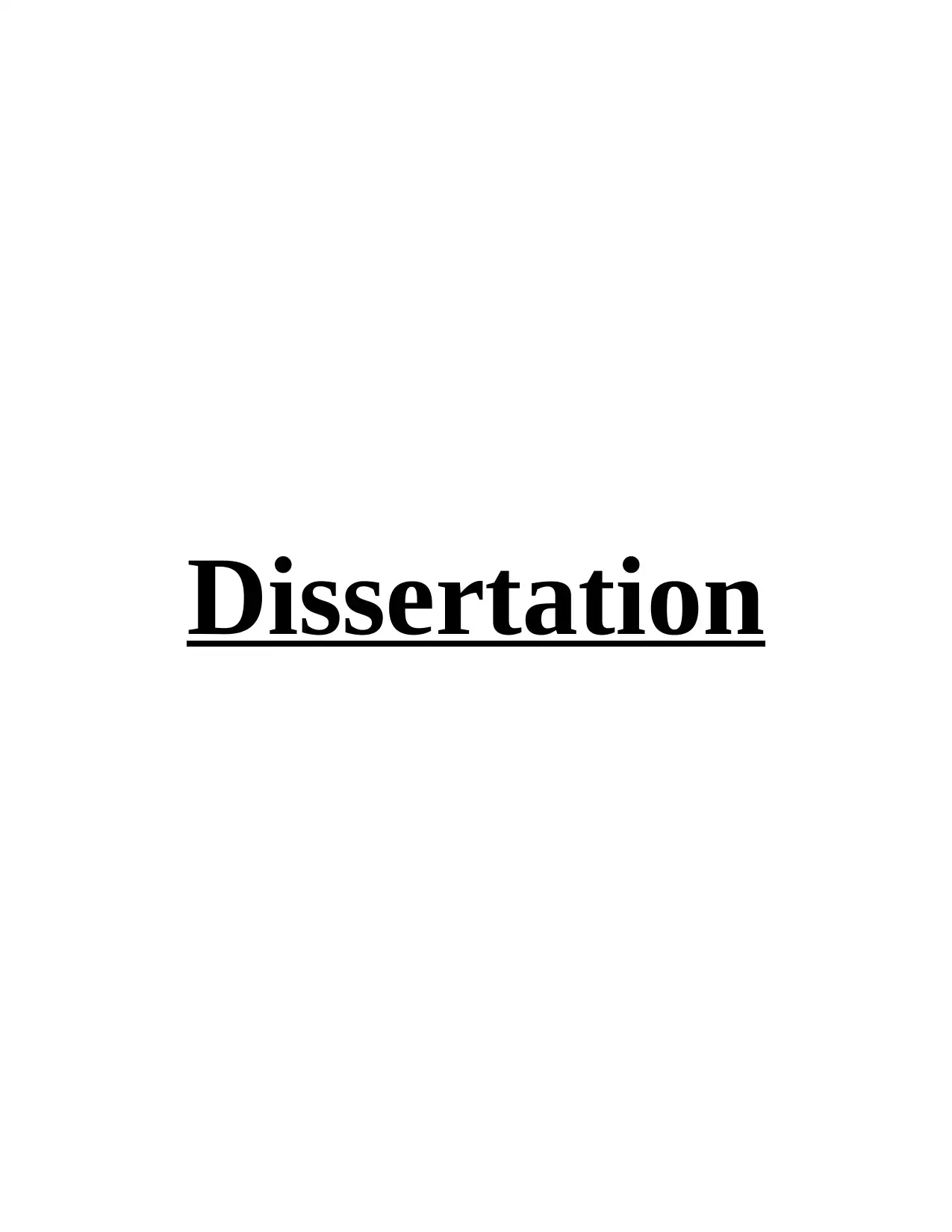
Dissertation
Secure Best Marks with AI Grader
Need help grading? Try our AI Grader for instant feedback on your assignments.
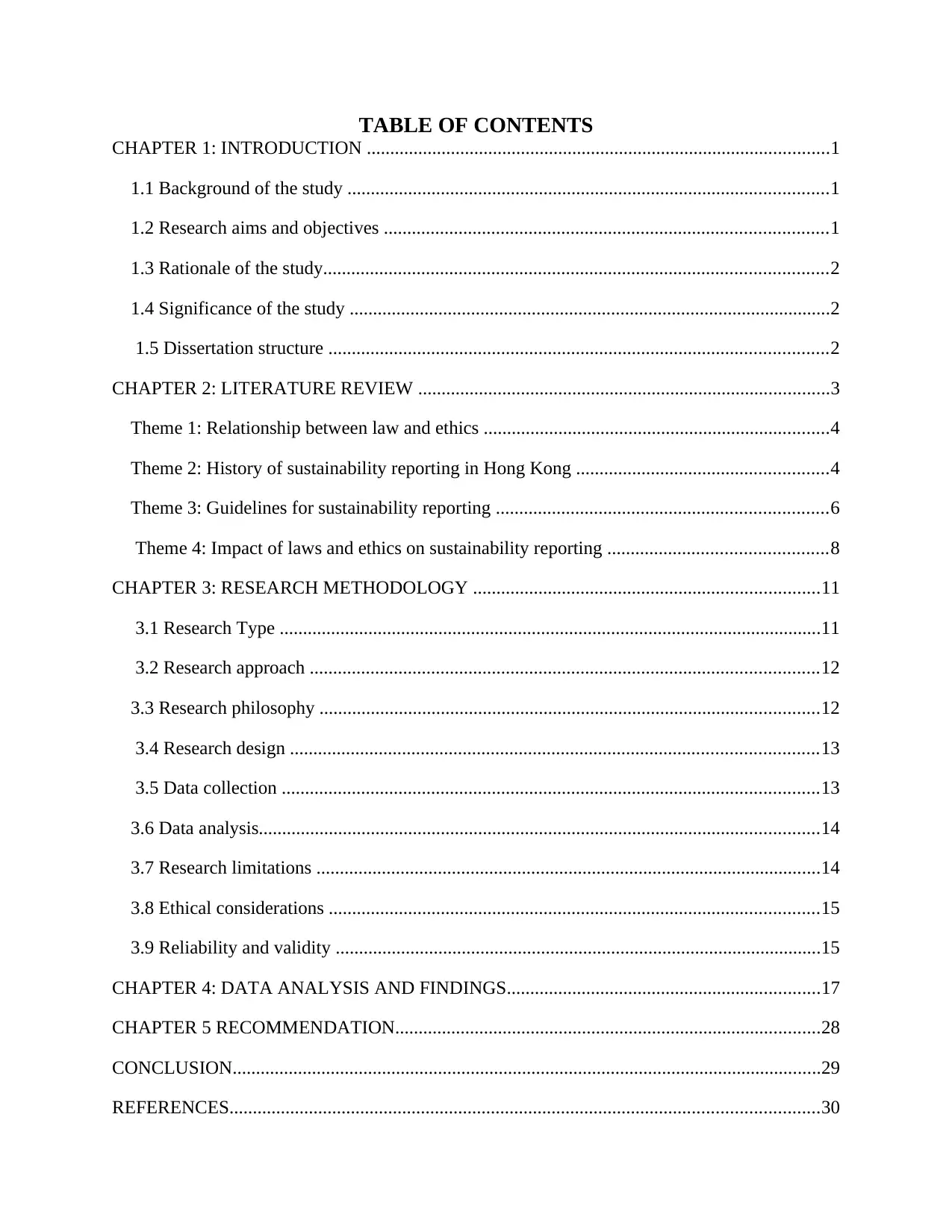
TABLE OF CONTENTS
CHAPTER 1: INTRODUCTION ...................................................................................................1
1.1 Background of the study .......................................................................................................1
1.2 Research aims and objectives ...............................................................................................1
1.3 Rationale of the study............................................................................................................2
1.4 Significance of the study .......................................................................................................2
1.5 Dissertation structure ...........................................................................................................2
CHAPTER 2: LITERATURE REVIEW ........................................................................................3
Theme 1: Relationship between law and ethics ..........................................................................4
Theme 2: History of sustainability reporting in Hong Kong ......................................................4
Theme 3: Guidelines for sustainability reporting .......................................................................6
Theme 4: Impact of laws and ethics on sustainability reporting ...............................................8
CHAPTER 3: RESEARCH METHODOLOGY ..........................................................................11
3.1 Research Type ....................................................................................................................11
3.2 Research approach .............................................................................................................12
3.3 Research philosophy ...........................................................................................................12
3.4 Research design .................................................................................................................13
3.5 Data collection ...................................................................................................................13
3.6 Data analysis........................................................................................................................14
3.7 Research limitations ............................................................................................................14
3.8 Ethical considerations .........................................................................................................15
3.9 Reliability and validity ........................................................................................................15
CHAPTER 4: DATA ANALYSIS AND FINDINGS...................................................................17
CHAPTER 5 RECOMMENDATION...........................................................................................28
CONCLUSION..............................................................................................................................29
REFERENCES..............................................................................................................................30
CHAPTER 1: INTRODUCTION ...................................................................................................1
1.1 Background of the study .......................................................................................................1
1.2 Research aims and objectives ...............................................................................................1
1.3 Rationale of the study............................................................................................................2
1.4 Significance of the study .......................................................................................................2
1.5 Dissertation structure ...........................................................................................................2
CHAPTER 2: LITERATURE REVIEW ........................................................................................3
Theme 1: Relationship between law and ethics ..........................................................................4
Theme 2: History of sustainability reporting in Hong Kong ......................................................4
Theme 3: Guidelines for sustainability reporting .......................................................................6
Theme 4: Impact of laws and ethics on sustainability reporting ...............................................8
CHAPTER 3: RESEARCH METHODOLOGY ..........................................................................11
3.1 Research Type ....................................................................................................................11
3.2 Research approach .............................................................................................................12
3.3 Research philosophy ...........................................................................................................12
3.4 Research design .................................................................................................................13
3.5 Data collection ...................................................................................................................13
3.6 Data analysis........................................................................................................................14
3.7 Research limitations ............................................................................................................14
3.8 Ethical considerations .........................................................................................................15
3.9 Reliability and validity ........................................................................................................15
CHAPTER 4: DATA ANALYSIS AND FINDINGS...................................................................17
CHAPTER 5 RECOMMENDATION...........................................................................................28
CONCLUSION..............................................................................................................................29
REFERENCES..............................................................................................................................30

APPENDIX....................................................................................................................................33
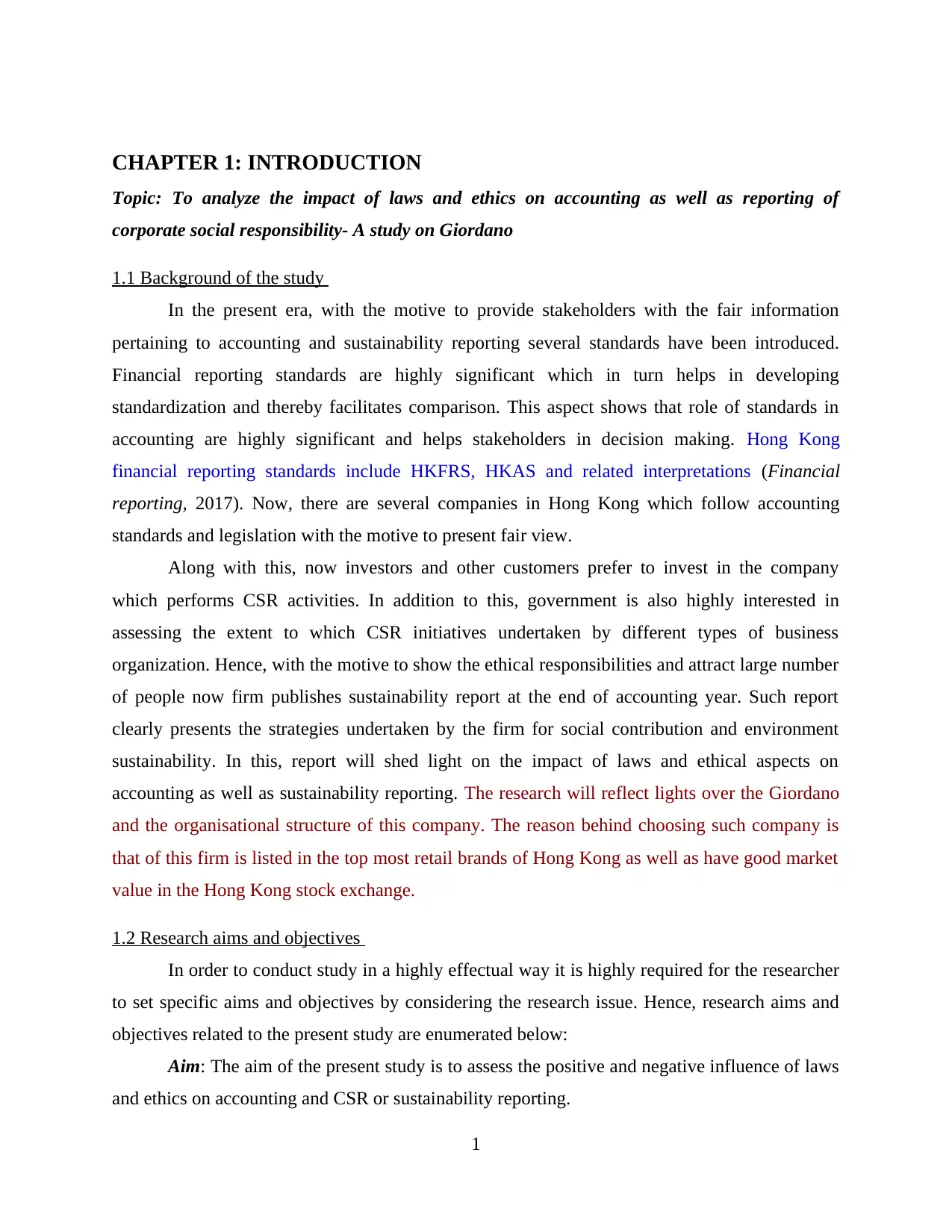
CHAPTER 1: INTRODUCTION
Topic: To analyze the impact of laws and ethics on accounting as well as reporting of
corporate social responsibility- A study on Giordano
1.1 Background of the study
In the present era, with the motive to provide stakeholders with the fair information
pertaining to accounting and sustainability reporting several standards have been introduced.
Financial reporting standards are highly significant which in turn helps in developing
standardization and thereby facilitates comparison. This aspect shows that role of standards in
accounting are highly significant and helps stakeholders in decision making. Hong Kong
financial reporting standards include HKFRS, HKAS and related interpretations (Financial
reporting, 2017). Now, there are several companies in Hong Kong which follow accounting
standards and legislation with the motive to present fair view.
Along with this, now investors and other customers prefer to invest in the company
which performs CSR activities. In addition to this, government is also highly interested in
assessing the extent to which CSR initiatives undertaken by different types of business
organization. Hence, with the motive to show the ethical responsibilities and attract large number
of people now firm publishes sustainability report at the end of accounting year. Such report
clearly presents the strategies undertaken by the firm for social contribution and environment
sustainability. In this, report will shed light on the impact of laws and ethical aspects on
accounting as well as sustainability reporting. The research will reflect lights over the Giordano
and the organisational structure of this company. The reason behind choosing such company is
that of this firm is listed in the top most retail brands of Hong Kong as well as have good market
value in the Hong Kong stock exchange.
1.2 Research aims and objectives
In order to conduct study in a highly effectual way it is highly required for the researcher
to set specific aims and objectives by considering the research issue. Hence, research aims and
objectives related to the present study are enumerated below:
Aim: The aim of the present study is to assess the positive and negative influence of laws
and ethics on accounting and CSR or sustainability reporting.
1
Topic: To analyze the impact of laws and ethics on accounting as well as reporting of
corporate social responsibility- A study on Giordano
1.1 Background of the study
In the present era, with the motive to provide stakeholders with the fair information
pertaining to accounting and sustainability reporting several standards have been introduced.
Financial reporting standards are highly significant which in turn helps in developing
standardization and thereby facilitates comparison. This aspect shows that role of standards in
accounting are highly significant and helps stakeholders in decision making. Hong Kong
financial reporting standards include HKFRS, HKAS and related interpretations (Financial
reporting, 2017). Now, there are several companies in Hong Kong which follow accounting
standards and legislation with the motive to present fair view.
Along with this, now investors and other customers prefer to invest in the company
which performs CSR activities. In addition to this, government is also highly interested in
assessing the extent to which CSR initiatives undertaken by different types of business
organization. Hence, with the motive to show the ethical responsibilities and attract large number
of people now firm publishes sustainability report at the end of accounting year. Such report
clearly presents the strategies undertaken by the firm for social contribution and environment
sustainability. In this, report will shed light on the impact of laws and ethical aspects on
accounting as well as sustainability reporting. The research will reflect lights over the Giordano
and the organisational structure of this company. The reason behind choosing such company is
that of this firm is listed in the top most retail brands of Hong Kong as well as have good market
value in the Hong Kong stock exchange.
1.2 Research aims and objectives
In order to conduct study in a highly effectual way it is highly required for the researcher
to set specific aims and objectives by considering the research issue. Hence, research aims and
objectives related to the present study are enumerated below:
Aim: The aim of the present study is to assess the positive and negative influence of laws
and ethics on accounting and CSR or sustainability reporting.
1
Secure Best Marks with AI Grader
Need help grading? Try our AI Grader for instant feedback on your assignments.
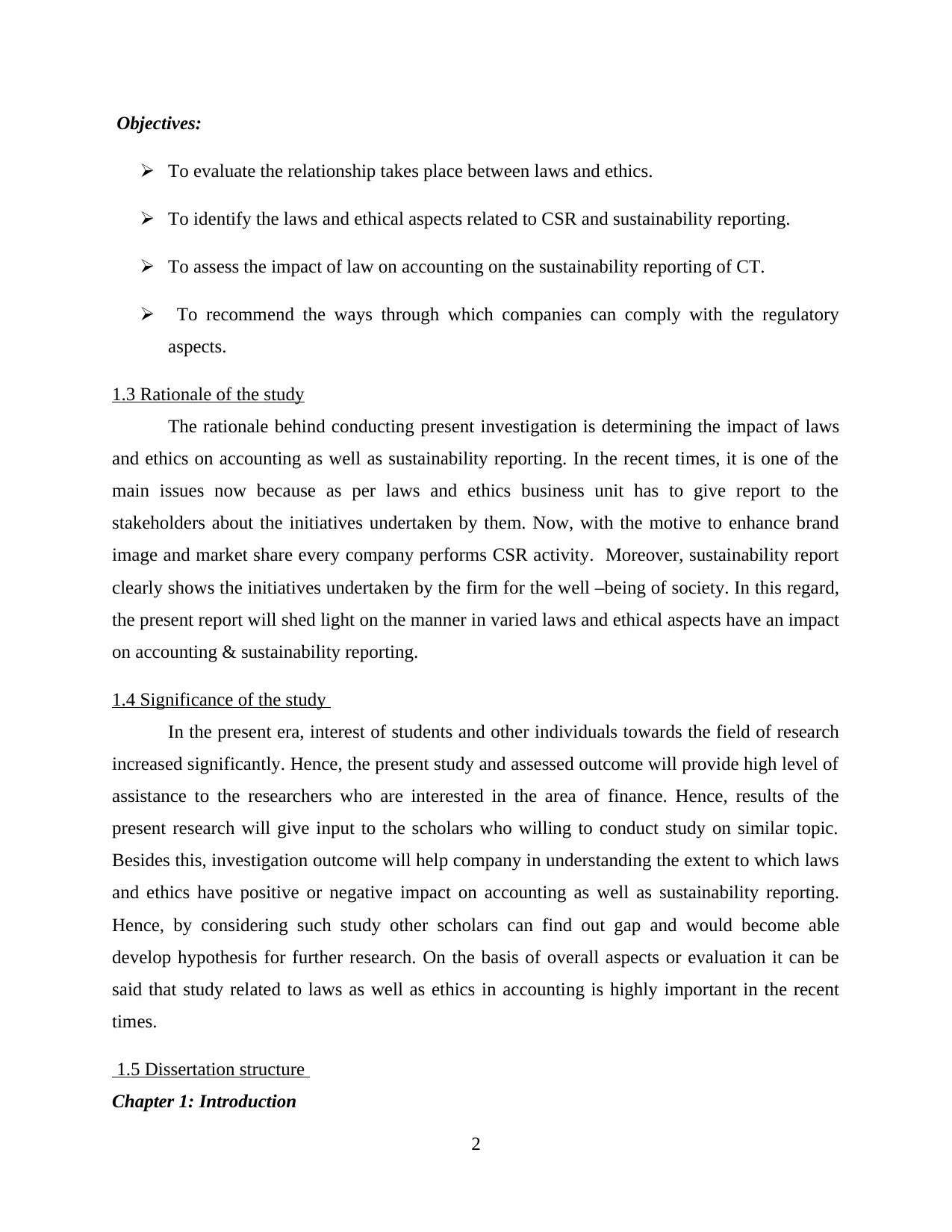
Objectives:
To evaluate the relationship takes place between laws and ethics.
To identify the laws and ethical aspects related to CSR and sustainability reporting.
To assess the impact of law on accounting on the sustainability reporting of CT.
To recommend the ways through which companies can comply with the regulatory
aspects.
1.3 Rationale of the study
The rationale behind conducting present investigation is determining the impact of laws
and ethics on accounting as well as sustainability reporting. In the recent times, it is one of the
main issues now because as per laws and ethics business unit has to give report to the
stakeholders about the initiatives undertaken by them. Now, with the motive to enhance brand
image and market share every company performs CSR activity. Moreover, sustainability report
clearly shows the initiatives undertaken by the firm for the well –being of society. In this regard,
the present report will shed light on the manner in varied laws and ethical aspects have an impact
on accounting & sustainability reporting.
1.4 Significance of the study
In the present era, interest of students and other individuals towards the field of research
increased significantly. Hence, the present study and assessed outcome will provide high level of
assistance to the researchers who are interested in the area of finance. Hence, results of the
present research will give input to the scholars who willing to conduct study on similar topic.
Besides this, investigation outcome will help company in understanding the extent to which laws
and ethics have positive or negative impact on accounting as well as sustainability reporting.
Hence, by considering such study other scholars can find out gap and would become able
develop hypothesis for further research. On the basis of overall aspects or evaluation it can be
said that study related to laws as well as ethics in accounting is highly important in the recent
times.
1.5 Dissertation structure
Chapter 1: Introduction
2
To evaluate the relationship takes place between laws and ethics.
To identify the laws and ethical aspects related to CSR and sustainability reporting.
To assess the impact of law on accounting on the sustainability reporting of CT.
To recommend the ways through which companies can comply with the regulatory
aspects.
1.3 Rationale of the study
The rationale behind conducting present investigation is determining the impact of laws
and ethics on accounting as well as sustainability reporting. In the recent times, it is one of the
main issues now because as per laws and ethics business unit has to give report to the
stakeholders about the initiatives undertaken by them. Now, with the motive to enhance brand
image and market share every company performs CSR activity. Moreover, sustainability report
clearly shows the initiatives undertaken by the firm for the well –being of society. In this regard,
the present report will shed light on the manner in varied laws and ethical aspects have an impact
on accounting & sustainability reporting.
1.4 Significance of the study
In the present era, interest of students and other individuals towards the field of research
increased significantly. Hence, the present study and assessed outcome will provide high level of
assistance to the researchers who are interested in the area of finance. Hence, results of the
present research will give input to the scholars who willing to conduct study on similar topic.
Besides this, investigation outcome will help company in understanding the extent to which laws
and ethics have positive or negative impact on accounting as well as sustainability reporting.
Hence, by considering such study other scholars can find out gap and would become able
develop hypothesis for further research. On the basis of overall aspects or evaluation it can be
said that study related to laws as well as ethics in accounting is highly important in the recent
times.
1.5 Dissertation structure
Chapter 1: Introduction
2
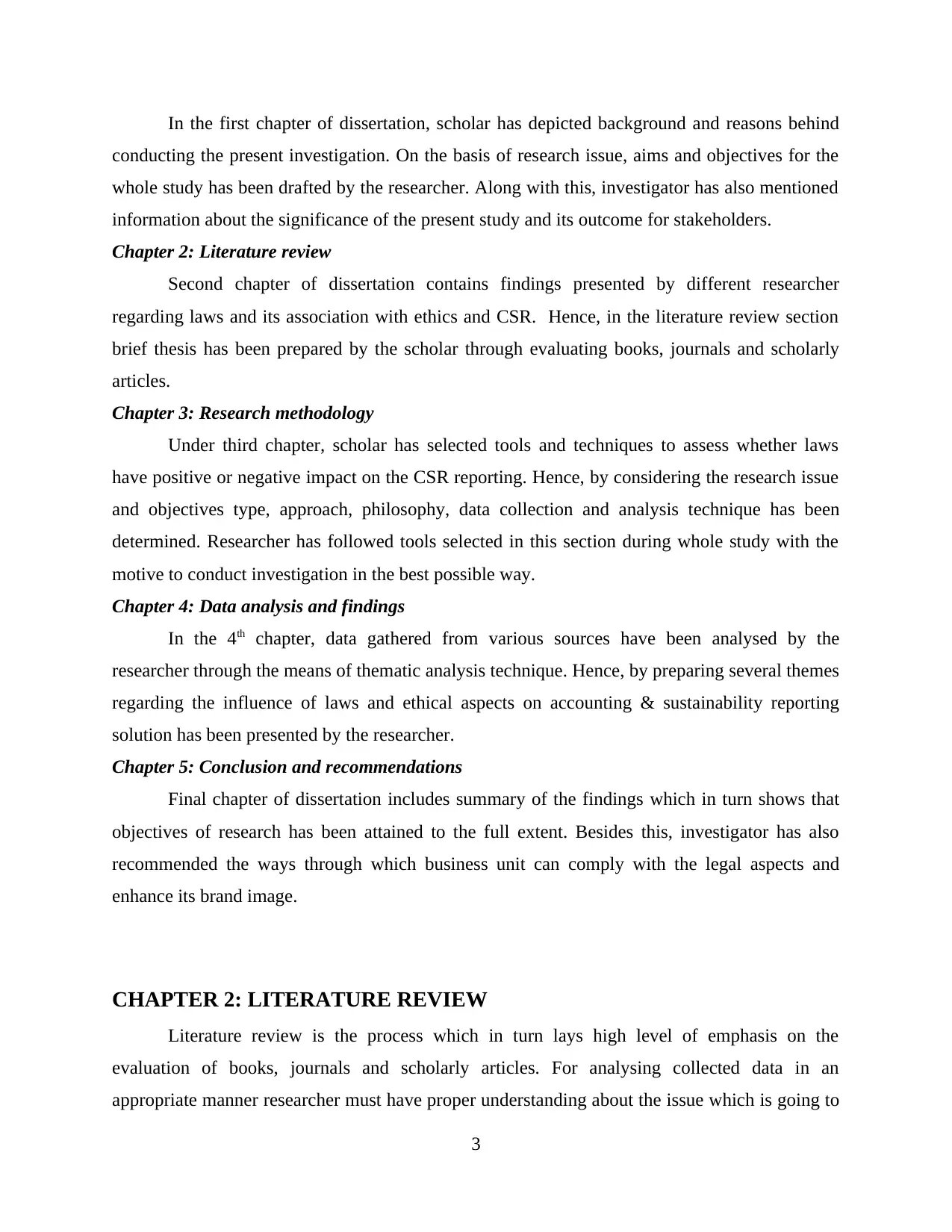
In the first chapter of dissertation, scholar has depicted background and reasons behind
conducting the present investigation. On the basis of research issue, aims and objectives for the
whole study has been drafted by the researcher. Along with this, investigator has also mentioned
information about the significance of the present study and its outcome for stakeholders.
Chapter 2: Literature review
Second chapter of dissertation contains findings presented by different researcher
regarding laws and its association with ethics and CSR. Hence, in the literature review section
brief thesis has been prepared by the scholar through evaluating books, journals and scholarly
articles.
Chapter 3: Research methodology
Under third chapter, scholar has selected tools and techniques to assess whether laws
have positive or negative impact on the CSR reporting. Hence, by considering the research issue
and objectives type, approach, philosophy, data collection and analysis technique has been
determined. Researcher has followed tools selected in this section during whole study with the
motive to conduct investigation in the best possible way.
Chapter 4: Data analysis and findings
In the 4th chapter, data gathered from various sources have been analysed by the
researcher through the means of thematic analysis technique. Hence, by preparing several themes
regarding the influence of laws and ethical aspects on accounting & sustainability reporting
solution has been presented by the researcher.
Chapter 5: Conclusion and recommendations
Final chapter of dissertation includes summary of the findings which in turn shows that
objectives of research has been attained to the full extent. Besides this, investigator has also
recommended the ways through which business unit can comply with the legal aspects and
enhance its brand image.
CHAPTER 2: LITERATURE REVIEW
Literature review is the process which in turn lays high level of emphasis on the
evaluation of books, journals and scholarly articles. For analysing collected data in an
appropriate manner researcher must have proper understanding about the issue which is going to
3
conducting the present investigation. On the basis of research issue, aims and objectives for the
whole study has been drafted by the researcher. Along with this, investigator has also mentioned
information about the significance of the present study and its outcome for stakeholders.
Chapter 2: Literature review
Second chapter of dissertation contains findings presented by different researcher
regarding laws and its association with ethics and CSR. Hence, in the literature review section
brief thesis has been prepared by the scholar through evaluating books, journals and scholarly
articles.
Chapter 3: Research methodology
Under third chapter, scholar has selected tools and techniques to assess whether laws
have positive or negative impact on the CSR reporting. Hence, by considering the research issue
and objectives type, approach, philosophy, data collection and analysis technique has been
determined. Researcher has followed tools selected in this section during whole study with the
motive to conduct investigation in the best possible way.
Chapter 4: Data analysis and findings
In the 4th chapter, data gathered from various sources have been analysed by the
researcher through the means of thematic analysis technique. Hence, by preparing several themes
regarding the influence of laws and ethical aspects on accounting & sustainability reporting
solution has been presented by the researcher.
Chapter 5: Conclusion and recommendations
Final chapter of dissertation includes summary of the findings which in turn shows that
objectives of research has been attained to the full extent. Besides this, investigator has also
recommended the ways through which business unit can comply with the legal aspects and
enhance its brand image.
CHAPTER 2: LITERATURE REVIEW
Literature review is the process which in turn lays high level of emphasis on the
evaluation of books, journals and scholarly articles. For analysing collected data in an
appropriate manner researcher must have proper understanding about the issue which is going to
3
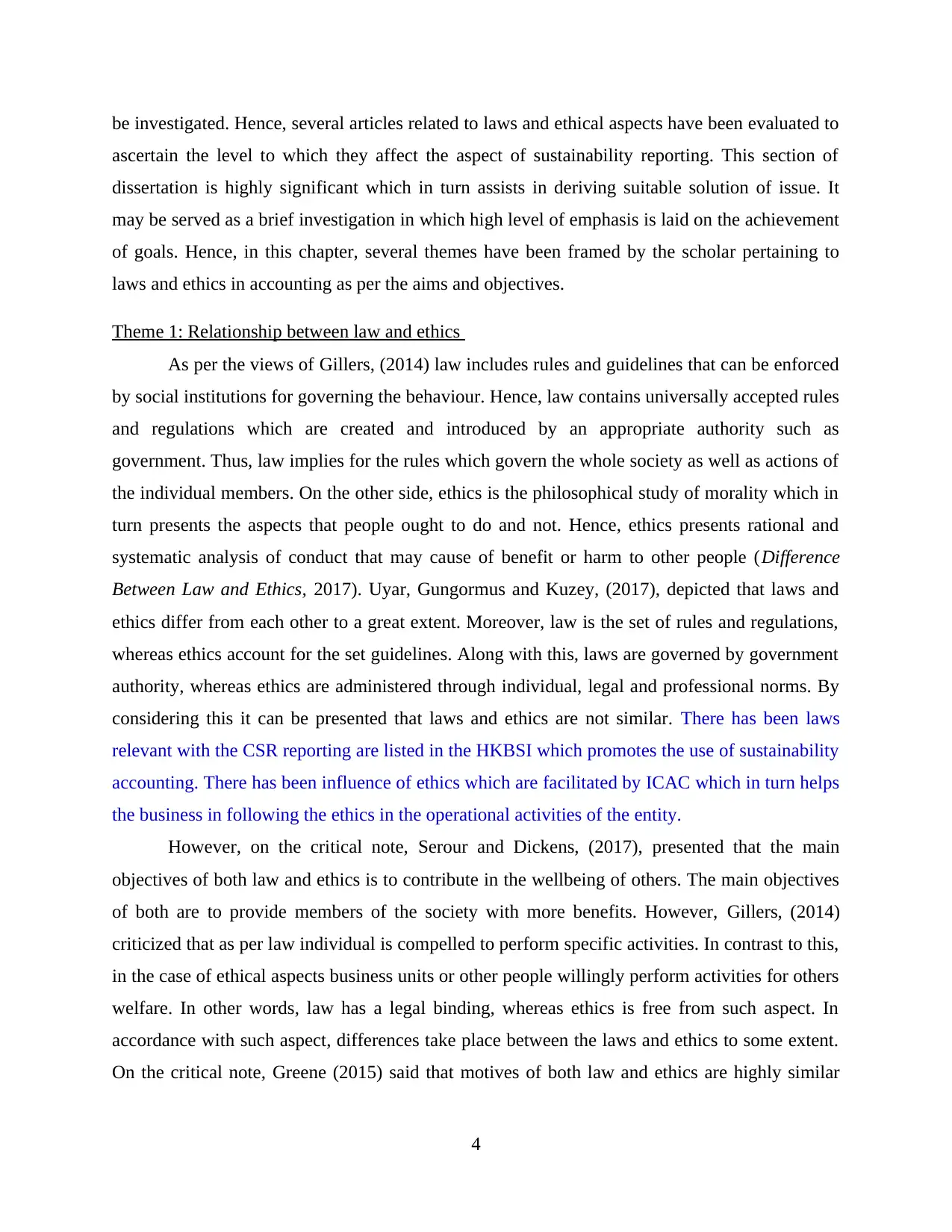
be investigated. Hence, several articles related to laws and ethical aspects have been evaluated to
ascertain the level to which they affect the aspect of sustainability reporting. This section of
dissertation is highly significant which in turn assists in deriving suitable solution of issue. It
may be served as a brief investigation in which high level of emphasis is laid on the achievement
of goals. Hence, in this chapter, several themes have been framed by the scholar pertaining to
laws and ethics in accounting as per the aims and objectives.
Theme 1: Relationship between law and ethics
As per the views of Gillers, (2014) law includes rules and guidelines that can be enforced
by social institutions for governing the behaviour. Hence, law contains universally accepted rules
and regulations which are created and introduced by an appropriate authority such as
government. Thus, law implies for the rules which govern the whole society as well as actions of
the individual members. On the other side, ethics is the philosophical study of morality which in
turn presents the aspects that people ought to do and not. Hence, ethics presents rational and
systematic analysis of conduct that may cause of benefit or harm to other people (Difference
Between Law and Ethics, 2017). Uyar, Gungormus and Kuzey, (2017), depicted that laws and
ethics differ from each other to a great extent. Moreover, law is the set of rules and regulations,
whereas ethics account for the set guidelines. Along with this, laws are governed by government
authority, whereas ethics are administered through individual, legal and professional norms. By
considering this it can be presented that laws and ethics are not similar. There has been laws
relevant with the CSR reporting are listed in the HKBSI which promotes the use of sustainability
accounting. There has been influence of ethics which are facilitated by ICAC which in turn helps
the business in following the ethics in the operational activities of the entity.
However, on the critical note, Serour and Dickens, (2017), presented that the main
objectives of both law and ethics is to contribute in the wellbeing of others. The main objectives
of both are to provide members of the society with more benefits. However, Gillers, (2014)
criticized that as per law individual is compelled to perform specific activities. In contrast to this,
in the case of ethical aspects business units or other people willingly perform activities for others
welfare. In other words, law has a legal binding, whereas ethics is free from such aspect. In
accordance with such aspect, differences take place between the laws and ethics to some extent.
On the critical note, Greene (2015) said that motives of both law and ethics are highly similar
4
ascertain the level to which they affect the aspect of sustainability reporting. This section of
dissertation is highly significant which in turn assists in deriving suitable solution of issue. It
may be served as a brief investigation in which high level of emphasis is laid on the achievement
of goals. Hence, in this chapter, several themes have been framed by the scholar pertaining to
laws and ethics in accounting as per the aims and objectives.
Theme 1: Relationship between law and ethics
As per the views of Gillers, (2014) law includes rules and guidelines that can be enforced
by social institutions for governing the behaviour. Hence, law contains universally accepted rules
and regulations which are created and introduced by an appropriate authority such as
government. Thus, law implies for the rules which govern the whole society as well as actions of
the individual members. On the other side, ethics is the philosophical study of morality which in
turn presents the aspects that people ought to do and not. Hence, ethics presents rational and
systematic analysis of conduct that may cause of benefit or harm to other people (Difference
Between Law and Ethics, 2017). Uyar, Gungormus and Kuzey, (2017), depicted that laws and
ethics differ from each other to a great extent. Moreover, law is the set of rules and regulations,
whereas ethics account for the set guidelines. Along with this, laws are governed by government
authority, whereas ethics are administered through individual, legal and professional norms. By
considering this it can be presented that laws and ethics are not similar. There has been laws
relevant with the CSR reporting are listed in the HKBSI which promotes the use of sustainability
accounting. There has been influence of ethics which are facilitated by ICAC which in turn helps
the business in following the ethics in the operational activities of the entity.
However, on the critical note, Serour and Dickens, (2017), presented that the main
objectives of both law and ethics is to contribute in the wellbeing of others. The main objectives
of both are to provide members of the society with more benefits. However, Gillers, (2014)
criticized that as per law individual is compelled to perform specific activities. In contrast to this,
in the case of ethical aspects business units or other people willingly perform activities for others
welfare. In other words, law has a legal binding, whereas ethics is free from such aspect. In
accordance with such aspect, differences take place between the laws and ethics to some extent.
On the critical note, Greene (2015) said that motives of both law and ethics are highly similar
4
Paraphrase This Document
Need a fresh take? Get an instant paraphrase of this document with our AI Paraphraser
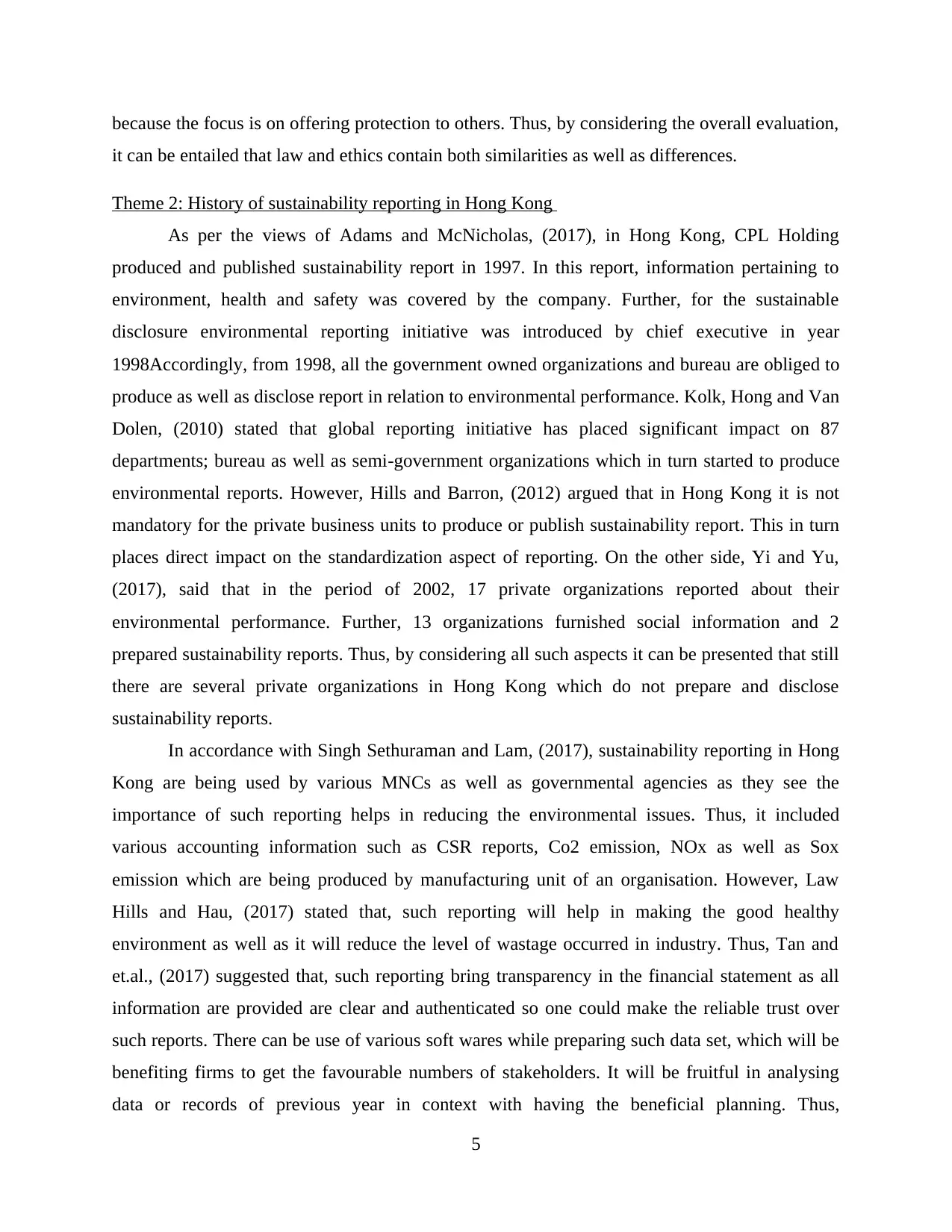
because the focus is on offering protection to others. Thus, by considering the overall evaluation,
it can be entailed that law and ethics contain both similarities as well as differences.
Theme 2: History of sustainability reporting in Hong Kong
As per the views of Adams and McNicholas, (2017), in Hong Kong, CPL Holding
produced and published sustainability report in 1997. In this report, information pertaining to
environment, health and safety was covered by the company. Further, for the sustainable
disclosure environmental reporting initiative was introduced by chief executive in year
1998Accordingly, from 1998, all the government owned organizations and bureau are obliged to
produce as well as disclose report in relation to environmental performance. Kolk, Hong and Van
Dolen, (2010) stated that global reporting initiative has placed significant impact on 87
departments; bureau as well as semi-government organizations which in turn started to produce
environmental reports. However, Hills and Barron, (2012) argued that in Hong Kong it is not
mandatory for the private business units to produce or publish sustainability report. This in turn
places direct impact on the standardization aspect of reporting. On the other side, Yi and Yu,
(2017), said that in the period of 2002, 17 private organizations reported about their
environmental performance. Further, 13 organizations furnished social information and 2
prepared sustainability reports. Thus, by considering all such aspects it can be presented that still
there are several private organizations in Hong Kong which do not prepare and disclose
sustainability reports.
In accordance with Singh Sethuraman and Lam, (2017), sustainability reporting in Hong
Kong are being used by various MNCs as well as governmental agencies as they see the
importance of such reporting helps in reducing the environmental issues. Thus, it included
various accounting information such as CSR reports, Co2 emission, NOx as well as Sox
emission which are being produced by manufacturing unit of an organisation. However, Law
Hills and Hau, (2017) stated that, such reporting will help in making the good healthy
environment as well as it will reduce the level of wastage occurred in industry. Thus, Tan and
et.al., (2017) suggested that, such reporting bring transparency in the financial statement as all
information are provided are clear and authenticated so one could make the reliable trust over
such reports. There can be use of various soft wares while preparing such data set, which will be
benefiting firms to get the favourable numbers of stakeholders. It will be fruitful in analysing
data or records of previous year in context with having the beneficial planning. Thus,
5
it can be entailed that law and ethics contain both similarities as well as differences.
Theme 2: History of sustainability reporting in Hong Kong
As per the views of Adams and McNicholas, (2017), in Hong Kong, CPL Holding
produced and published sustainability report in 1997. In this report, information pertaining to
environment, health and safety was covered by the company. Further, for the sustainable
disclosure environmental reporting initiative was introduced by chief executive in year
1998Accordingly, from 1998, all the government owned organizations and bureau are obliged to
produce as well as disclose report in relation to environmental performance. Kolk, Hong and Van
Dolen, (2010) stated that global reporting initiative has placed significant impact on 87
departments; bureau as well as semi-government organizations which in turn started to produce
environmental reports. However, Hills and Barron, (2012) argued that in Hong Kong it is not
mandatory for the private business units to produce or publish sustainability report. This in turn
places direct impact on the standardization aspect of reporting. On the other side, Yi and Yu,
(2017), said that in the period of 2002, 17 private organizations reported about their
environmental performance. Further, 13 organizations furnished social information and 2
prepared sustainability reports. Thus, by considering all such aspects it can be presented that still
there are several private organizations in Hong Kong which do not prepare and disclose
sustainability reports.
In accordance with Singh Sethuraman and Lam, (2017), sustainability reporting in Hong
Kong are being used by various MNCs as well as governmental agencies as they see the
importance of such reporting helps in reducing the environmental issues. Thus, it included
various accounting information such as CSR reports, Co2 emission, NOx as well as Sox
emission which are being produced by manufacturing unit of an organisation. However, Law
Hills and Hau, (2017) stated that, such reporting will help in making the good healthy
environment as well as it will reduce the level of wastage occurred in industry. Thus, Tan and
et.al., (2017) suggested that, such reporting bring transparency in the financial statement as all
information are provided are clear and authenticated so one could make the reliable trust over
such reports. There can be use of various soft wares while preparing such data set, which will be
benefiting firms to get the favourable numbers of stakeholders. It will be fruitful in analysing
data or records of previous year in context with having the beneficial planning. Thus,
5
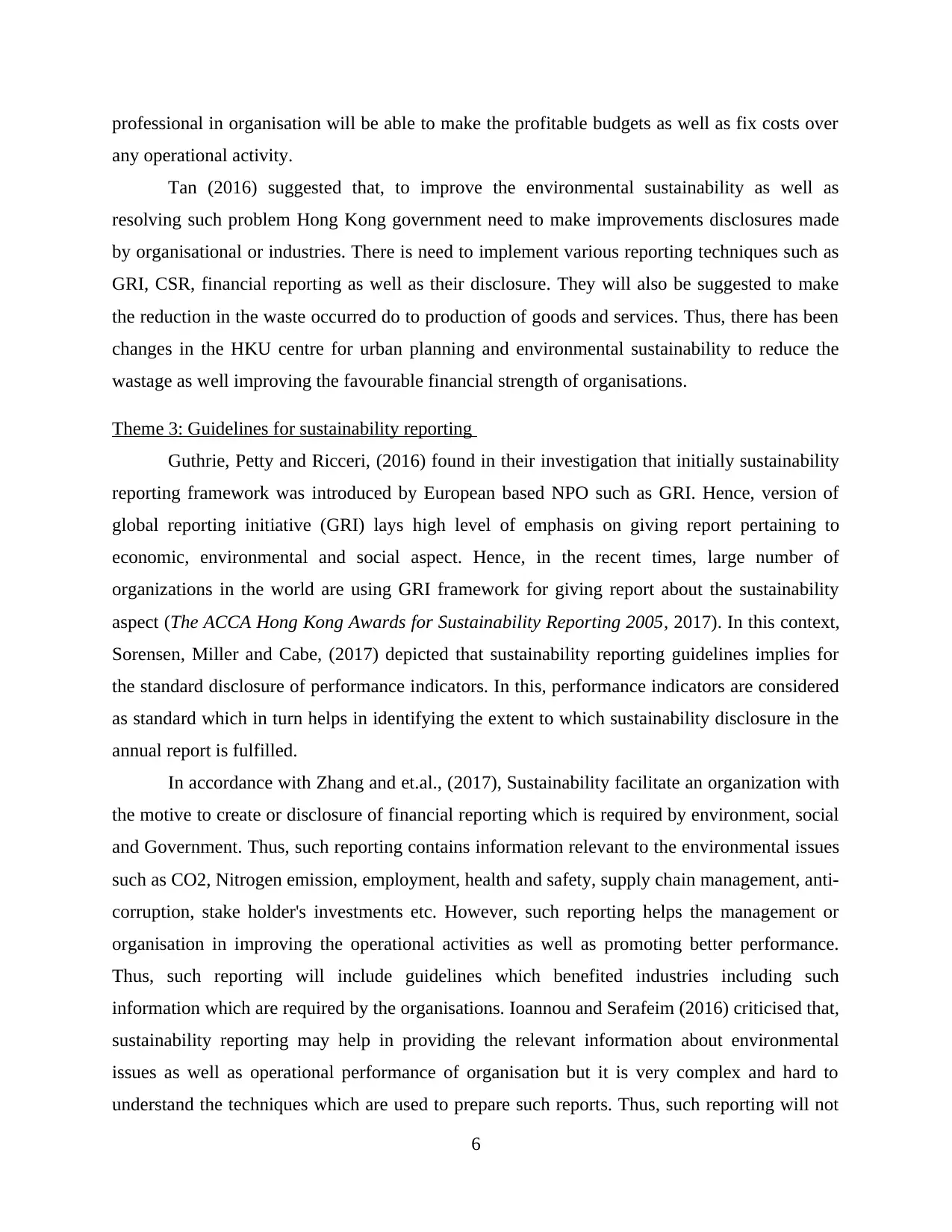
professional in organisation will be able to make the profitable budgets as well as fix costs over
any operational activity.
Tan (2016) suggested that, to improve the environmental sustainability as well as
resolving such problem Hong Kong government need to make improvements disclosures made
by organisational or industries. There is need to implement various reporting techniques such as
GRI, CSR, financial reporting as well as their disclosure. They will also be suggested to make
the reduction in the waste occurred do to production of goods and services. Thus, there has been
changes in the HKU centre for urban planning and environmental sustainability to reduce the
wastage as well improving the favourable financial strength of organisations.
Theme 3: Guidelines for sustainability reporting
Guthrie, Petty and Ricceri, (2016) found in their investigation that initially sustainability
reporting framework was introduced by European based NPO such as GRI. Hence, version of
global reporting initiative (GRI) lays high level of emphasis on giving report pertaining to
economic, environmental and social aspect. Hence, in the recent times, large number of
organizations in the world are using GRI framework for giving report about the sustainability
aspect (The ACCA Hong Kong Awards for Sustainability Reporting 2005, 2017). In this context,
Sorensen, Miller and Cabe, (2017) depicted that sustainability reporting guidelines implies for
the standard disclosure of performance indicators. In this, performance indicators are considered
as standard which in turn helps in identifying the extent to which sustainability disclosure in the
annual report is fulfilled.
In accordance with Zhang and et.al., (2017), Sustainability facilitate an organization with
the motive to create or disclosure of financial reporting which is required by environment, social
and Government. Thus, such reporting contains information relevant to the environmental issues
such as CO2, Nitrogen emission, employment, health and safety, supply chain management, anti-
corruption, stake holder's investments etc. However, such reporting helps the management or
organisation in improving the operational activities as well as promoting better performance.
Thus, such reporting will include guidelines which benefited industries including such
information which are required by the organisations. Ioannou and Serafeim (2016) criticised that,
sustainability reporting may help in providing the relevant information about environmental
issues as well as operational performance of organisation but it is very complex and hard to
understand the techniques which are used to prepare such reports. Thus, such reporting will not
6
any operational activity.
Tan (2016) suggested that, to improve the environmental sustainability as well as
resolving such problem Hong Kong government need to make improvements disclosures made
by organisational or industries. There is need to implement various reporting techniques such as
GRI, CSR, financial reporting as well as their disclosure. They will also be suggested to make
the reduction in the waste occurred do to production of goods and services. Thus, there has been
changes in the HKU centre for urban planning and environmental sustainability to reduce the
wastage as well improving the favourable financial strength of organisations.
Theme 3: Guidelines for sustainability reporting
Guthrie, Petty and Ricceri, (2016) found in their investigation that initially sustainability
reporting framework was introduced by European based NPO such as GRI. Hence, version of
global reporting initiative (GRI) lays high level of emphasis on giving report pertaining to
economic, environmental and social aspect. Hence, in the recent times, large number of
organizations in the world are using GRI framework for giving report about the sustainability
aspect (The ACCA Hong Kong Awards for Sustainability Reporting 2005, 2017). In this context,
Sorensen, Miller and Cabe, (2017) depicted that sustainability reporting guidelines implies for
the standard disclosure of performance indicators. In this, performance indicators are considered
as standard which in turn helps in identifying the extent to which sustainability disclosure in the
annual report is fulfilled.
In accordance with Zhang and et.al., (2017), Sustainability facilitate an organization with
the motive to create or disclosure of financial reporting which is required by environment, social
and Government. Thus, such reporting contains information relevant to the environmental issues
such as CO2, Nitrogen emission, employment, health and safety, supply chain management, anti-
corruption, stake holder's investments etc. However, such reporting helps the management or
organisation in improving the operational activities as well as promoting better performance.
Thus, such reporting will include guidelines which benefited industries including such
information which are required by the organisations. Ioannou and Serafeim (2016) criticised that,
sustainability reporting may help in providing the relevant information about environmental
issues as well as operational performance of organisation but it is very complex and hard to
understand the techniques which are used to prepare such reports. Thus, such reporting will not
6
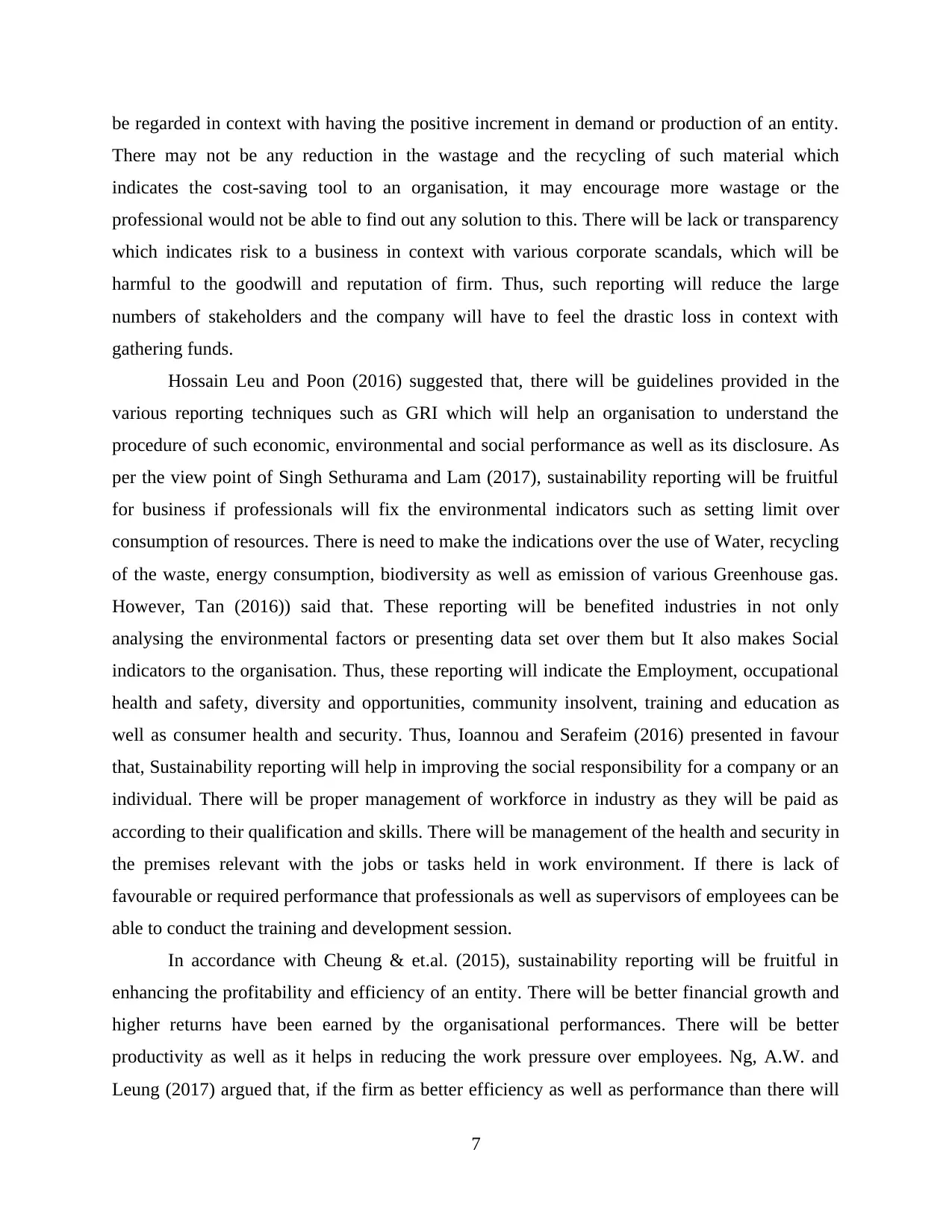
be regarded in context with having the positive increment in demand or production of an entity.
There may not be any reduction in the wastage and the recycling of such material which
indicates the cost-saving tool to an organisation, it may encourage more wastage or the
professional would not be able to find out any solution to this. There will be lack or transparency
which indicates risk to a business in context with various corporate scandals, which will be
harmful to the goodwill and reputation of firm. Thus, such reporting will reduce the large
numbers of stakeholders and the company will have to feel the drastic loss in context with
gathering funds.
Hossain Leu and Poon (2016) suggested that, there will be guidelines provided in the
various reporting techniques such as GRI which will help an organisation to understand the
procedure of such economic, environmental and social performance as well as its disclosure. As
per the view point of Singh Sethurama and Lam (2017), sustainability reporting will be fruitful
for business if professionals will fix the environmental indicators such as setting limit over
consumption of resources. There is need to make the indications over the use of Water, recycling
of the waste, energy consumption, biodiversity as well as emission of various Greenhouse gas.
However, Tan (2016)) said that. These reporting will be benefited industries in not only
analysing the environmental factors or presenting data set over them but It also makes Social
indicators to the organisation. Thus, these reporting will indicate the Employment, occupational
health and safety, diversity and opportunities, community insolvent, training and education as
well as consumer health and security. Thus, Ioannou and Serafeim (2016) presented in favour
that, Sustainability reporting will help in improving the social responsibility for a company or an
individual. There will be proper management of workforce in industry as they will be paid as
according to their qualification and skills. There will be management of the health and security in
the premises relevant with the jobs or tasks held in work environment. If there is lack of
favourable or required performance that professionals as well as supervisors of employees can be
able to conduct the training and development session.
In accordance with Cheung & et.al. (2015), sustainability reporting will be fruitful in
enhancing the profitability and efficiency of an entity. There will be better financial growth and
higher returns have been earned by the organisational performances. There will be better
productivity as well as it helps in reducing the work pressure over employees. Ng, A.W. and
Leung (2017) argued that, if the firm as better efficiency as well as performance than there will
7
There may not be any reduction in the wastage and the recycling of such material which
indicates the cost-saving tool to an organisation, it may encourage more wastage or the
professional would not be able to find out any solution to this. There will be lack or transparency
which indicates risk to a business in context with various corporate scandals, which will be
harmful to the goodwill and reputation of firm. Thus, such reporting will reduce the large
numbers of stakeholders and the company will have to feel the drastic loss in context with
gathering funds.
Hossain Leu and Poon (2016) suggested that, there will be guidelines provided in the
various reporting techniques such as GRI which will help an organisation to understand the
procedure of such economic, environmental and social performance as well as its disclosure. As
per the view point of Singh Sethurama and Lam (2017), sustainability reporting will be fruitful
for business if professionals will fix the environmental indicators such as setting limit over
consumption of resources. There is need to make the indications over the use of Water, recycling
of the waste, energy consumption, biodiversity as well as emission of various Greenhouse gas.
However, Tan (2016)) said that. These reporting will be benefited industries in not only
analysing the environmental factors or presenting data set over them but It also makes Social
indicators to the organisation. Thus, these reporting will indicate the Employment, occupational
health and safety, diversity and opportunities, community insolvent, training and education as
well as consumer health and security. Thus, Ioannou and Serafeim (2016) presented in favour
that, Sustainability reporting will help in improving the social responsibility for a company or an
individual. There will be proper management of workforce in industry as they will be paid as
according to their qualification and skills. There will be management of the health and security in
the premises relevant with the jobs or tasks held in work environment. If there is lack of
favourable or required performance that professionals as well as supervisors of employees can be
able to conduct the training and development session.
In accordance with Cheung & et.al. (2015), sustainability reporting will be fruitful in
enhancing the profitability and efficiency of an entity. There will be better financial growth and
higher returns have been earned by the organisational performances. There will be better
productivity as well as it helps in reducing the work pressure over employees. Ng, A.W. and
Leung (2017) argued that, if the firm as better efficiency as well as performance than there will
7
Secure Best Marks with AI Grader
Need help grading? Try our AI Grader for instant feedback on your assignments.
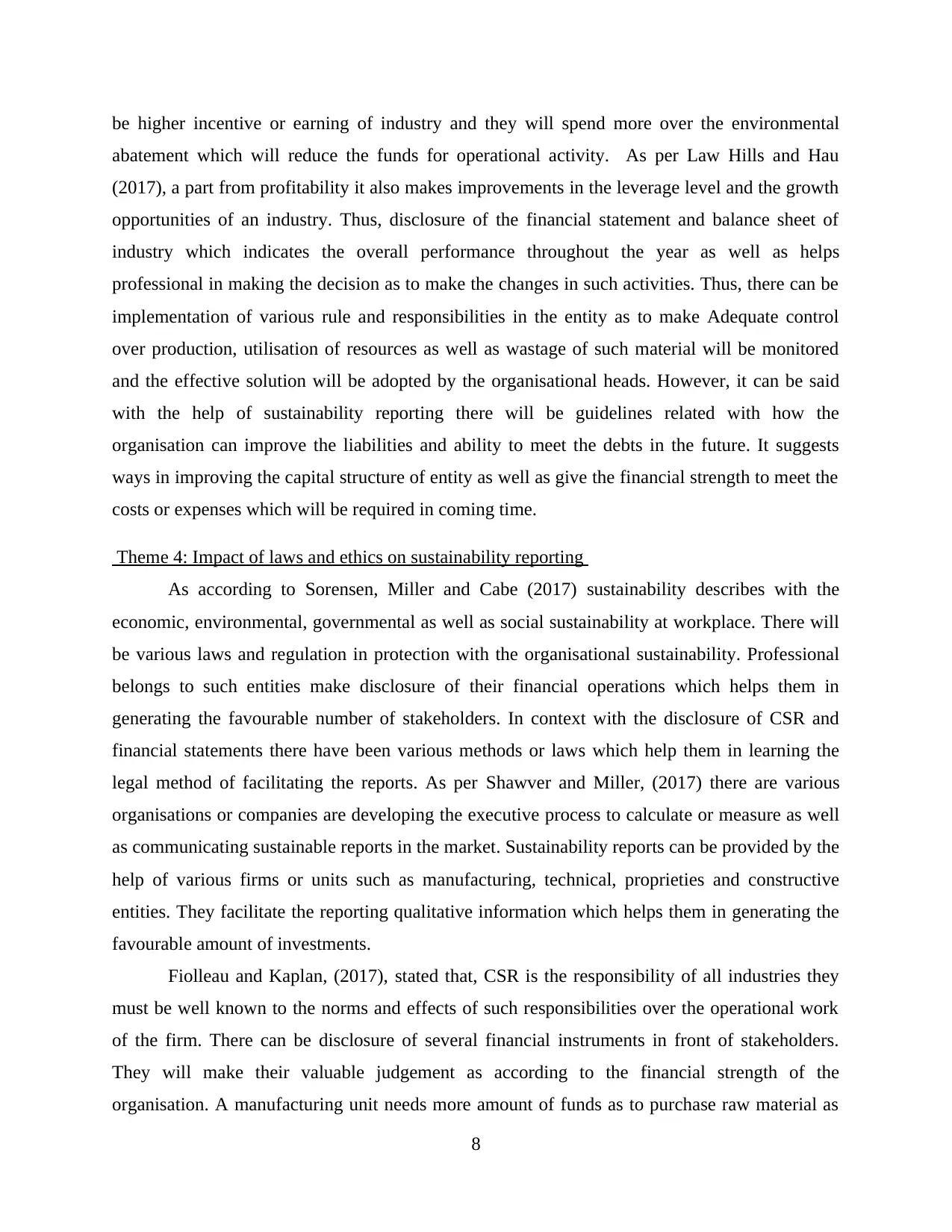
be higher incentive or earning of industry and they will spend more over the environmental
abatement which will reduce the funds for operational activity. As per Law Hills and Hau
(2017), a part from profitability it also makes improvements in the leverage level and the growth
opportunities of an industry. Thus, disclosure of the financial statement and balance sheet of
industry which indicates the overall performance throughout the year as well as helps
professional in making the decision as to make the changes in such activities. Thus, there can be
implementation of various rule and responsibilities in the entity as to make Adequate control
over production, utilisation of resources as well as wastage of such material will be monitored
and the effective solution will be adopted by the organisational heads. However, it can be said
with the help of sustainability reporting there will be guidelines related with how the
organisation can improve the liabilities and ability to meet the debts in the future. It suggests
ways in improving the capital structure of entity as well as give the financial strength to meet the
costs or expenses which will be required in coming time.
Theme 4: Impact of laws and ethics on sustainability reporting
As according to Sorensen, Miller and Cabe (2017) sustainability describes with the
economic, environmental, governmental as well as social sustainability at workplace. There will
be various laws and regulation in protection with the organisational sustainability. Professional
belongs to such entities make disclosure of their financial operations which helps them in
generating the favourable number of stakeholders. In context with the disclosure of CSR and
financial statements there have been various methods or laws which help them in learning the
legal method of facilitating the reports. As per Shawver and Miller, (2017) there are various
organisations or companies are developing the executive process to calculate or measure as well
as communicating sustainable reports in the market. Sustainability reports can be provided by the
help of various firms or units such as manufacturing, technical, proprieties and constructive
entities. They facilitate the reporting qualitative information which helps them in generating the
favourable amount of investments.
Fiolleau and Kaplan, (2017), stated that, CSR is the responsibility of all industries they
must be well known to the norms and effects of such responsibilities over the operational work
of the firm. There can be disclosure of several financial instruments in front of stakeholders.
They will make their valuable judgement as according to the financial strength of the
organisation. A manufacturing unit needs more amount of funds as to purchase raw material as
8
abatement which will reduce the funds for operational activity. As per Law Hills and Hau
(2017), a part from profitability it also makes improvements in the leverage level and the growth
opportunities of an industry. Thus, disclosure of the financial statement and balance sheet of
industry which indicates the overall performance throughout the year as well as helps
professional in making the decision as to make the changes in such activities. Thus, there can be
implementation of various rule and responsibilities in the entity as to make Adequate control
over production, utilisation of resources as well as wastage of such material will be monitored
and the effective solution will be adopted by the organisational heads. However, it can be said
with the help of sustainability reporting there will be guidelines related with how the
organisation can improve the liabilities and ability to meet the debts in the future. It suggests
ways in improving the capital structure of entity as well as give the financial strength to meet the
costs or expenses which will be required in coming time.
Theme 4: Impact of laws and ethics on sustainability reporting
As according to Sorensen, Miller and Cabe (2017) sustainability describes with the
economic, environmental, governmental as well as social sustainability at workplace. There will
be various laws and regulation in protection with the organisational sustainability. Professional
belongs to such entities make disclosure of their financial operations which helps them in
generating the favourable number of stakeholders. In context with the disclosure of CSR and
financial statements there have been various methods or laws which help them in learning the
legal method of facilitating the reports. As per Shawver and Miller, (2017) there are various
organisations or companies are developing the executive process to calculate or measure as well
as communicating sustainable reports in the market. Sustainability reports can be provided by the
help of various firms or units such as manufacturing, technical, proprieties and constructive
entities. They facilitate the reporting qualitative information which helps them in generating the
favourable amount of investments.
Fiolleau and Kaplan, (2017), stated that, CSR is the responsibility of all industries they
must be well known to the norms and effects of such responsibilities over the operational work
of the firm. There can be disclosure of several financial instruments in front of stakeholders.
They will make their valuable judgement as according to the financial strength of the
organisation. A manufacturing unit needs more amount of funds as to purchase raw material as
8
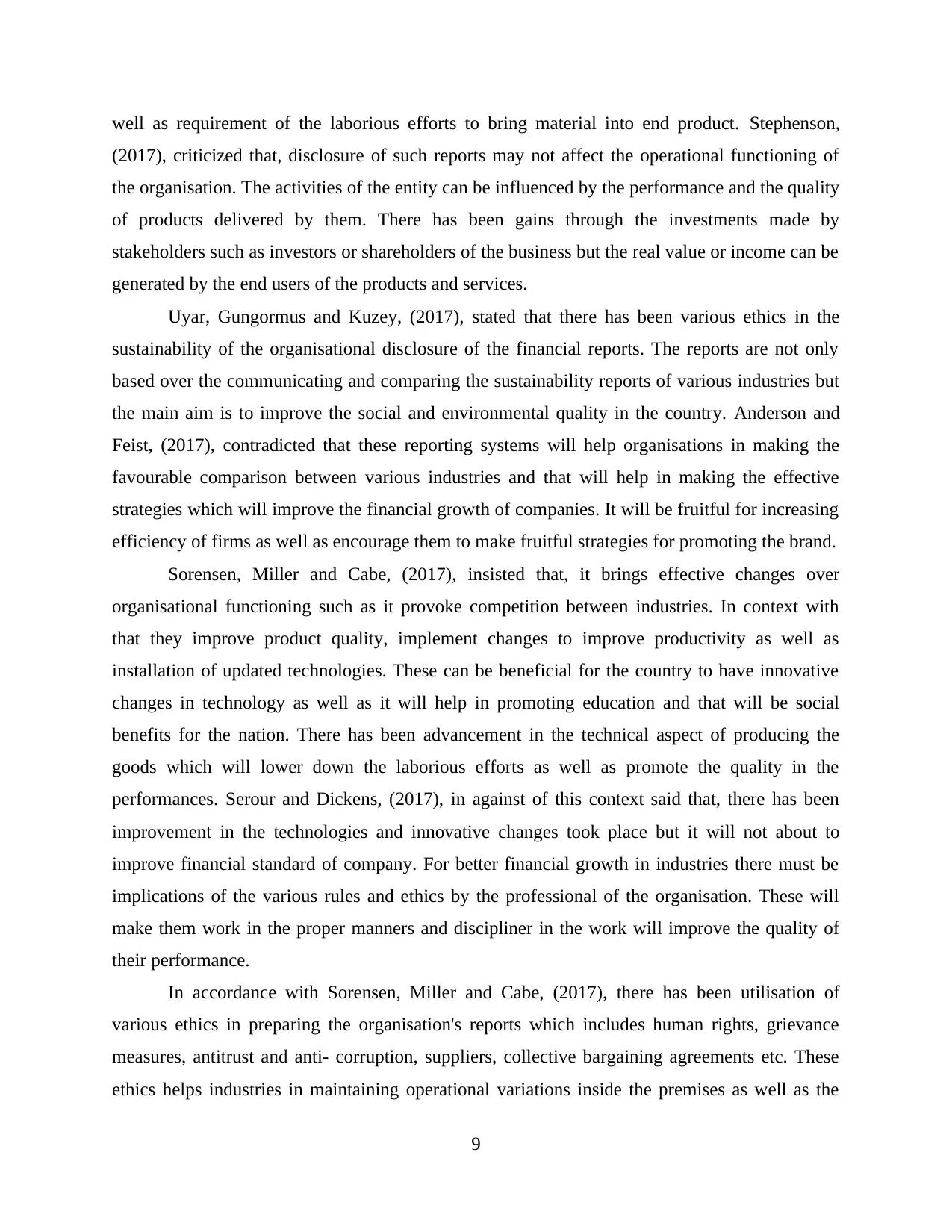
well as requirement of the laborious efforts to bring material into end product. Stephenson,
(2017), criticized that, disclosure of such reports may not affect the operational functioning of
the organisation. The activities of the entity can be influenced by the performance and the quality
of products delivered by them. There has been gains through the investments made by
stakeholders such as investors or shareholders of the business but the real value or income can be
generated by the end users of the products and services.
Uyar, Gungormus and Kuzey, (2017), stated that there has been various ethics in the
sustainability of the organisational disclosure of the financial reports. The reports are not only
based over the communicating and comparing the sustainability reports of various industries but
the main aim is to improve the social and environmental quality in the country. Anderson and
Feist, (2017), contradicted that these reporting systems will help organisations in making the
favourable comparison between various industries and that will help in making the effective
strategies which will improve the financial growth of companies. It will be fruitful for increasing
efficiency of firms as well as encourage them to make fruitful strategies for promoting the brand.
Sorensen, Miller and Cabe, (2017), insisted that, it brings effective changes over
organisational functioning such as it provoke competition between industries. In context with
that they improve product quality, implement changes to improve productivity as well as
installation of updated technologies. These can be beneficial for the country to have innovative
changes in technology as well as it will help in promoting education and that will be social
benefits for the nation. There has been advancement in the technical aspect of producing the
goods which will lower down the laborious efforts as well as promote the quality in the
performances. Serour and Dickens, (2017), in against of this context said that, there has been
improvement in the technologies and innovative changes took place but it will not about to
improve financial standard of company. For better financial growth in industries there must be
implications of the various rules and ethics by the professional of the organisation. These will
make them work in the proper manners and discipliner in the work will improve the quality of
their performance.
In accordance with Sorensen, Miller and Cabe, (2017), there has been utilisation of
various ethics in preparing the organisation's reports which includes human rights, grievance
measures, antitrust and anti- corruption, suppliers, collective bargaining agreements etc. These
ethics helps industries in maintaining operational variations inside the premises as well as the
9
(2017), criticized that, disclosure of such reports may not affect the operational functioning of
the organisation. The activities of the entity can be influenced by the performance and the quality
of products delivered by them. There has been gains through the investments made by
stakeholders such as investors or shareholders of the business but the real value or income can be
generated by the end users of the products and services.
Uyar, Gungormus and Kuzey, (2017), stated that there has been various ethics in the
sustainability of the organisational disclosure of the financial reports. The reports are not only
based over the communicating and comparing the sustainability reports of various industries but
the main aim is to improve the social and environmental quality in the country. Anderson and
Feist, (2017), contradicted that these reporting systems will help organisations in making the
favourable comparison between various industries and that will help in making the effective
strategies which will improve the financial growth of companies. It will be fruitful for increasing
efficiency of firms as well as encourage them to make fruitful strategies for promoting the brand.
Sorensen, Miller and Cabe, (2017), insisted that, it brings effective changes over
organisational functioning such as it provoke competition between industries. In context with
that they improve product quality, implement changes to improve productivity as well as
installation of updated technologies. These can be beneficial for the country to have innovative
changes in technology as well as it will help in promoting education and that will be social
benefits for the nation. There has been advancement in the technical aspect of producing the
goods which will lower down the laborious efforts as well as promote the quality in the
performances. Serour and Dickens, (2017), in against of this context said that, there has been
improvement in the technologies and innovative changes took place but it will not about to
improve financial standard of company. For better financial growth in industries there must be
implications of the various rules and ethics by the professional of the organisation. These will
make them work in the proper manners and discipliner in the work will improve the quality of
their performance.
In accordance with Sorensen, Miller and Cabe, (2017), there has been utilisation of
various ethics in preparing the organisation's reports which includes human rights, grievance
measures, antitrust and anti- corruption, suppliers, collective bargaining agreements etc. These
ethics helps industries in maintaining operational variations inside the premises as well as the
9
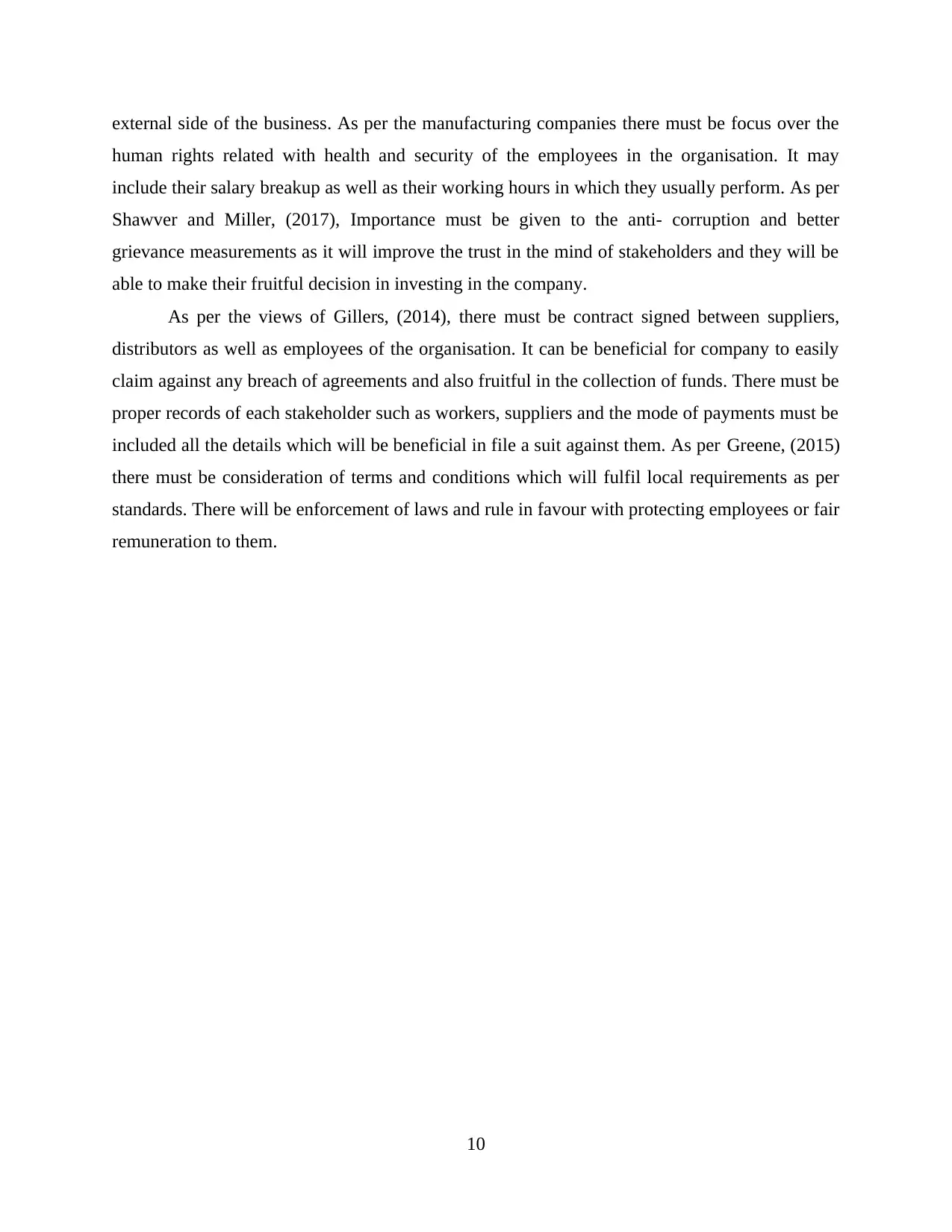
external side of the business. As per the manufacturing companies there must be focus over the
human rights related with health and security of the employees in the organisation. It may
include their salary breakup as well as their working hours in which they usually perform. As per
Shawver and Miller, (2017), Importance must be given to the anti- corruption and better
grievance measurements as it will improve the trust in the mind of stakeholders and they will be
able to make their fruitful decision in investing in the company.
As per the views of Gillers, (2014), there must be contract signed between suppliers,
distributors as well as employees of the organisation. It can be beneficial for company to easily
claim against any breach of agreements and also fruitful in the collection of funds. There must be
proper records of each stakeholder such as workers, suppliers and the mode of payments must be
included all the details which will be beneficial in file a suit against them. As per Greene, (2015)
there must be consideration of terms and conditions which will fulfil local requirements as per
standards. There will be enforcement of laws and rule in favour with protecting employees or fair
remuneration to them.
10
human rights related with health and security of the employees in the organisation. It may
include their salary breakup as well as their working hours in which they usually perform. As per
Shawver and Miller, (2017), Importance must be given to the anti- corruption and better
grievance measurements as it will improve the trust in the mind of stakeholders and they will be
able to make their fruitful decision in investing in the company.
As per the views of Gillers, (2014), there must be contract signed between suppliers,
distributors as well as employees of the organisation. It can be beneficial for company to easily
claim against any breach of agreements and also fruitful in the collection of funds. There must be
proper records of each stakeholder such as workers, suppliers and the mode of payments must be
included all the details which will be beneficial in file a suit against them. As per Greene, (2015)
there must be consideration of terms and conditions which will fulfil local requirements as per
standards. There will be enforcement of laws and rule in favour with protecting employees or fair
remuneration to them.
10
Paraphrase This Document
Need a fresh take? Get an instant paraphrase of this document with our AI Paraphraser
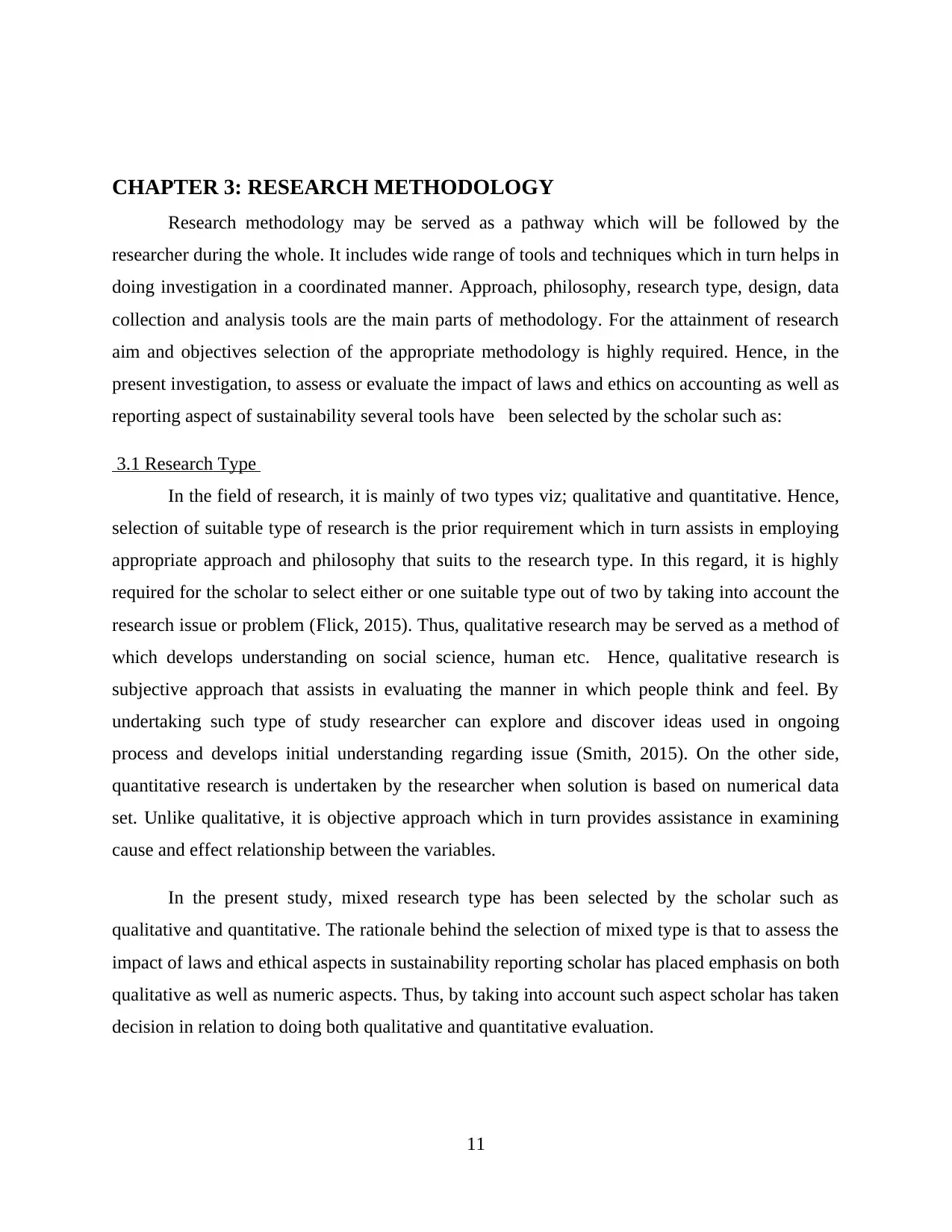
CHAPTER 3: RESEARCH METHODOLOGY
Research methodology may be served as a pathway which will be followed by the
researcher during the whole. It includes wide range of tools and techniques which in turn helps in
doing investigation in a coordinated manner. Approach, philosophy, research type, design, data
collection and analysis tools are the main parts of methodology. For the attainment of research
aim and objectives selection of the appropriate methodology is highly required. Hence, in the
present investigation, to assess or evaluate the impact of laws and ethics on accounting as well as
reporting aspect of sustainability several tools have been selected by the scholar such as:
3.1 Research Type
In the field of research, it is mainly of two types viz; qualitative and quantitative. Hence,
selection of suitable type of research is the prior requirement which in turn assists in employing
appropriate approach and philosophy that suits to the research type. In this regard, it is highly
required for the scholar to select either or one suitable type out of two by taking into account the
research issue or problem (Flick, 2015). Thus, qualitative research may be served as a method of
which develops understanding on social science, human etc. Hence, qualitative research is
subjective approach that assists in evaluating the manner in which people think and feel. By
undertaking such type of study researcher can explore and discover ideas used in ongoing
process and develops initial understanding regarding issue (Smith, 2015). On the other side,
quantitative research is undertaken by the researcher when solution is based on numerical data
set. Unlike qualitative, it is objective approach which in turn provides assistance in examining
cause and effect relationship between the variables.
In the present study, mixed research type has been selected by the scholar such as
qualitative and quantitative. The rationale behind the selection of mixed type is that to assess the
impact of laws and ethical aspects in sustainability reporting scholar has placed emphasis on both
qualitative as well as numeric aspects. Thus, by taking into account such aspect scholar has taken
decision in relation to doing both qualitative and quantitative evaluation.
11
Research methodology may be served as a pathway which will be followed by the
researcher during the whole. It includes wide range of tools and techniques which in turn helps in
doing investigation in a coordinated manner. Approach, philosophy, research type, design, data
collection and analysis tools are the main parts of methodology. For the attainment of research
aim and objectives selection of the appropriate methodology is highly required. Hence, in the
present investigation, to assess or evaluate the impact of laws and ethics on accounting as well as
reporting aspect of sustainability several tools have been selected by the scholar such as:
3.1 Research Type
In the field of research, it is mainly of two types viz; qualitative and quantitative. Hence,
selection of suitable type of research is the prior requirement which in turn assists in employing
appropriate approach and philosophy that suits to the research type. In this regard, it is highly
required for the scholar to select either or one suitable type out of two by taking into account the
research issue or problem (Flick, 2015). Thus, qualitative research may be served as a method of
which develops understanding on social science, human etc. Hence, qualitative research is
subjective approach that assists in evaluating the manner in which people think and feel. By
undertaking such type of study researcher can explore and discover ideas used in ongoing
process and develops initial understanding regarding issue (Smith, 2015). On the other side,
quantitative research is undertaken by the researcher when solution is based on numerical data
set. Unlike qualitative, it is objective approach which in turn provides assistance in examining
cause and effect relationship between the variables.
In the present study, mixed research type has been selected by the scholar such as
qualitative and quantitative. The rationale behind the selection of mixed type is that to assess the
impact of laws and ethical aspects in sustainability reporting scholar has placed emphasis on both
qualitative as well as numeric aspects. Thus, by taking into account such aspect scholar has taken
decision in relation to doing both qualitative and quantitative evaluation.
11
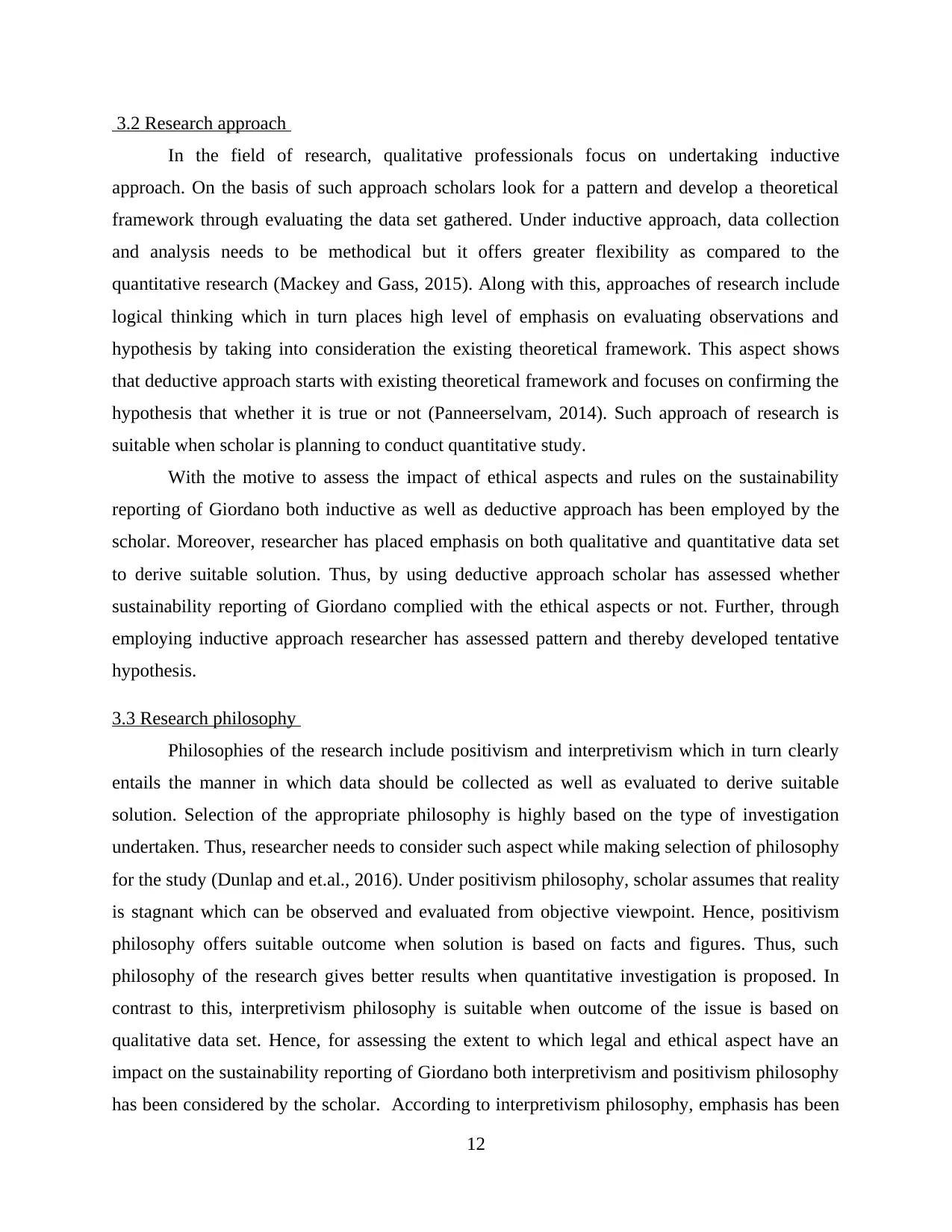
3.2 Research approach
In the field of research, qualitative professionals focus on undertaking inductive
approach. On the basis of such approach scholars look for a pattern and develop a theoretical
framework through evaluating the data set gathered. Under inductive approach, data collection
and analysis needs to be methodical but it offers greater flexibility as compared to the
quantitative research (Mackey and Gass, 2015). Along with this, approaches of research include
logical thinking which in turn places high level of emphasis on evaluating observations and
hypothesis by taking into consideration the existing theoretical framework. This aspect shows
that deductive approach starts with existing theoretical framework and focuses on confirming the
hypothesis that whether it is true or not (Panneerselvam, 2014). Such approach of research is
suitable when scholar is planning to conduct quantitative study.
With the motive to assess the impact of ethical aspects and rules on the sustainability
reporting of Giordano both inductive as well as deductive approach has been employed by the
scholar. Moreover, researcher has placed emphasis on both qualitative and quantitative data set
to derive suitable solution. Thus, by using deductive approach scholar has assessed whether
sustainability reporting of Giordano complied with the ethical aspects or not. Further, through
employing inductive approach researcher has assessed pattern and thereby developed tentative
hypothesis.
3.3 Research philosophy
Philosophies of the research include positivism and interpretivism which in turn clearly
entails the manner in which data should be collected as well as evaluated to derive suitable
solution. Selection of the appropriate philosophy is highly based on the type of investigation
undertaken. Thus, researcher needs to consider such aspect while making selection of philosophy
for the study (Dunlap and et.al., 2016). Under positivism philosophy, scholar assumes that reality
is stagnant which can be observed and evaluated from objective viewpoint. Hence, positivism
philosophy offers suitable outcome when solution is based on facts and figures. Thus, such
philosophy of the research gives better results when quantitative investigation is proposed. In
contrast to this, interpretivism philosophy is suitable when outcome of the issue is based on
qualitative data set. Hence, for assessing the extent to which legal and ethical aspect have an
impact on the sustainability reporting of Giordano both interpretivism and positivism philosophy
has been considered by the scholar. According to interpretivism philosophy, emphasis has been
12
In the field of research, qualitative professionals focus on undertaking inductive
approach. On the basis of such approach scholars look for a pattern and develop a theoretical
framework through evaluating the data set gathered. Under inductive approach, data collection
and analysis needs to be methodical but it offers greater flexibility as compared to the
quantitative research (Mackey and Gass, 2015). Along with this, approaches of research include
logical thinking which in turn places high level of emphasis on evaluating observations and
hypothesis by taking into consideration the existing theoretical framework. This aspect shows
that deductive approach starts with existing theoretical framework and focuses on confirming the
hypothesis that whether it is true or not (Panneerselvam, 2014). Such approach of research is
suitable when scholar is planning to conduct quantitative study.
With the motive to assess the impact of ethical aspects and rules on the sustainability
reporting of Giordano both inductive as well as deductive approach has been employed by the
scholar. Moreover, researcher has placed emphasis on both qualitative and quantitative data set
to derive suitable solution. Thus, by using deductive approach scholar has assessed whether
sustainability reporting of Giordano complied with the ethical aspects or not. Further, through
employing inductive approach researcher has assessed pattern and thereby developed tentative
hypothesis.
3.3 Research philosophy
Philosophies of the research include positivism and interpretivism which in turn clearly
entails the manner in which data should be collected as well as evaluated to derive suitable
solution. Selection of the appropriate philosophy is highly based on the type of investigation
undertaken. Thus, researcher needs to consider such aspect while making selection of philosophy
for the study (Dunlap and et.al., 2016). Under positivism philosophy, scholar assumes that reality
is stagnant which can be observed and evaluated from objective viewpoint. Hence, positivism
philosophy offers suitable outcome when solution is based on facts and figures. Thus, such
philosophy of the research gives better results when quantitative investigation is proposed. In
contrast to this, interpretivism philosophy is suitable when outcome of the issue is based on
qualitative data set. Hence, for assessing the extent to which legal and ethical aspect have an
impact on the sustainability reporting of Giordano both interpretivism and positivism philosophy
has been considered by the scholar. According to interpretivism philosophy, emphasis has been
12
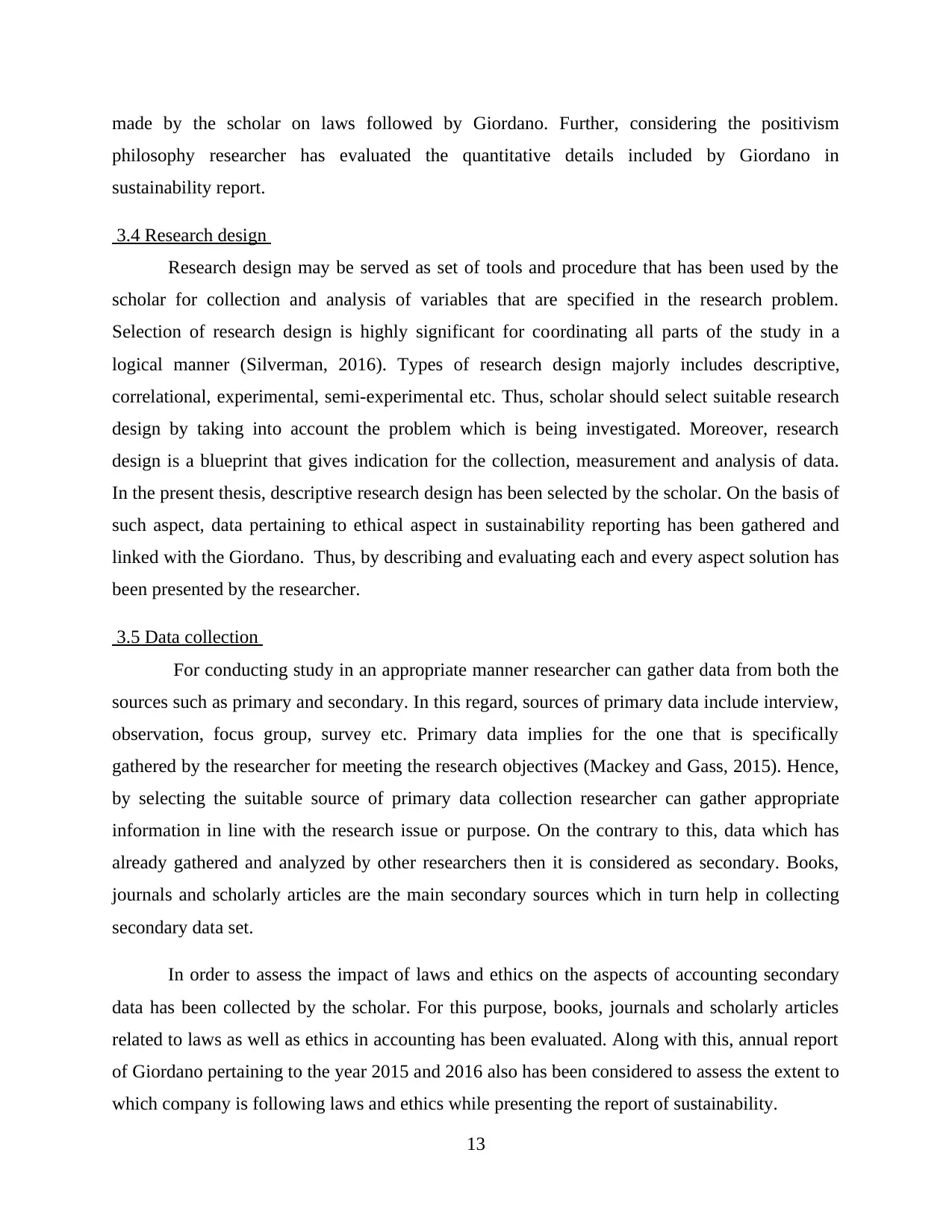
made by the scholar on laws followed by Giordano. Further, considering the positivism
philosophy researcher has evaluated the quantitative details included by Giordano in
sustainability report.
3.4 Research design
Research design may be served as set of tools and procedure that has been used by the
scholar for collection and analysis of variables that are specified in the research problem.
Selection of research design is highly significant for coordinating all parts of the study in a
logical manner (Silverman, 2016). Types of research design majorly includes descriptive,
correlational, experimental, semi-experimental etc. Thus, scholar should select suitable research
design by taking into account the problem which is being investigated. Moreover, research
design is a blueprint that gives indication for the collection, measurement and analysis of data.
In the present thesis, descriptive research design has been selected by the scholar. On the basis of
such aspect, data pertaining to ethical aspect in sustainability reporting has been gathered and
linked with the Giordano. Thus, by describing and evaluating each and every aspect solution has
been presented by the researcher.
3.5 Data collection
For conducting study in an appropriate manner researcher can gather data from both the
sources such as primary and secondary. In this regard, sources of primary data include interview,
observation, focus group, survey etc. Primary data implies for the one that is specifically
gathered by the researcher for meeting the research objectives (Mackey and Gass, 2015). Hence,
by selecting the suitable source of primary data collection researcher can gather appropriate
information in line with the research issue or purpose. On the contrary to this, data which has
already gathered and analyzed by other researchers then it is considered as secondary. Books,
journals and scholarly articles are the main secondary sources which in turn help in collecting
secondary data set.
In order to assess the impact of laws and ethics on the aspects of accounting secondary
data has been collected by the scholar. For this purpose, books, journals and scholarly articles
related to laws as well as ethics in accounting has been evaluated. Along with this, annual report
of Giordano pertaining to the year 2015 and 2016 also has been considered to assess the extent to
which company is following laws and ethics while presenting the report of sustainability.
13
philosophy researcher has evaluated the quantitative details included by Giordano in
sustainability report.
3.4 Research design
Research design may be served as set of tools and procedure that has been used by the
scholar for collection and analysis of variables that are specified in the research problem.
Selection of research design is highly significant for coordinating all parts of the study in a
logical manner (Silverman, 2016). Types of research design majorly includes descriptive,
correlational, experimental, semi-experimental etc. Thus, scholar should select suitable research
design by taking into account the problem which is being investigated. Moreover, research
design is a blueprint that gives indication for the collection, measurement and analysis of data.
In the present thesis, descriptive research design has been selected by the scholar. On the basis of
such aspect, data pertaining to ethical aspect in sustainability reporting has been gathered and
linked with the Giordano. Thus, by describing and evaluating each and every aspect solution has
been presented by the researcher.
3.5 Data collection
For conducting study in an appropriate manner researcher can gather data from both the
sources such as primary and secondary. In this regard, sources of primary data include interview,
observation, focus group, survey etc. Primary data implies for the one that is specifically
gathered by the researcher for meeting the research objectives (Mackey and Gass, 2015). Hence,
by selecting the suitable source of primary data collection researcher can gather appropriate
information in line with the research issue or purpose. On the contrary to this, data which has
already gathered and analyzed by other researchers then it is considered as secondary. Books,
journals and scholarly articles are the main secondary sources which in turn help in collecting
secondary data set.
In order to assess the impact of laws and ethics on the aspects of accounting secondary
data has been collected by the scholar. For this purpose, books, journals and scholarly articles
related to laws as well as ethics in accounting has been evaluated. Along with this, annual report
of Giordano pertaining to the year 2015 and 2016 also has been considered to assess the extent to
which company is following laws and ethics while presenting the report of sustainability.
13
Secure Best Marks with AI Grader
Need help grading? Try our AI Grader for instant feedback on your assignments.
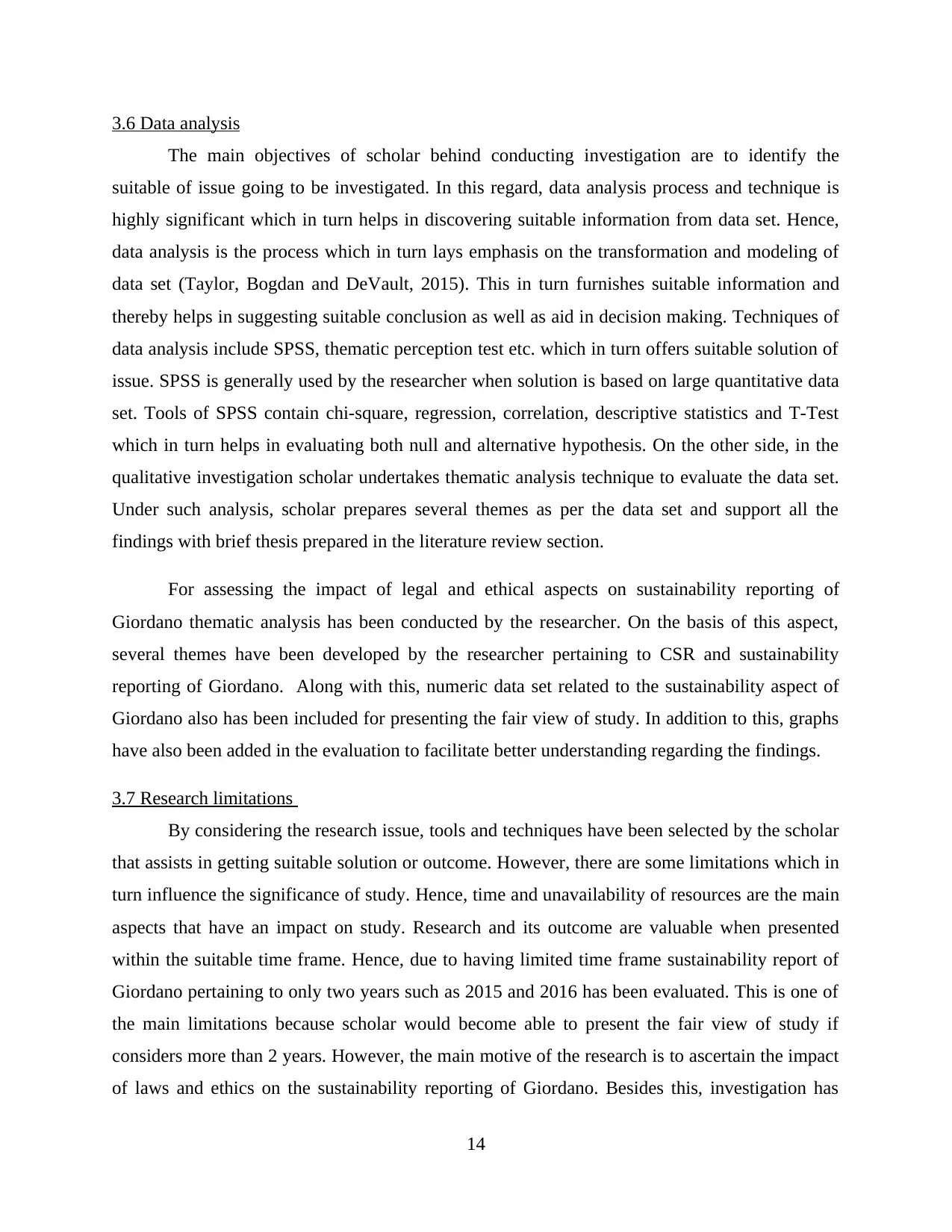
3.6 Data analysis
The main objectives of scholar behind conducting investigation are to identify the
suitable of issue going to be investigated. In this regard, data analysis process and technique is
highly significant which in turn helps in discovering suitable information from data set. Hence,
data analysis is the process which in turn lays emphasis on the transformation and modeling of
data set (Taylor, Bogdan and DeVault, 2015). This in turn furnishes suitable information and
thereby helps in suggesting suitable conclusion as well as aid in decision making. Techniques of
data analysis include SPSS, thematic perception test etc. which in turn offers suitable solution of
issue. SPSS is generally used by the researcher when solution is based on large quantitative data
set. Tools of SPSS contain chi-square, regression, correlation, descriptive statistics and T-Test
which in turn helps in evaluating both null and alternative hypothesis. On the other side, in the
qualitative investigation scholar undertakes thematic analysis technique to evaluate the data set.
Under such analysis, scholar prepares several themes as per the data set and support all the
findings with brief thesis prepared in the literature review section.
For assessing the impact of legal and ethical aspects on sustainability reporting of
Giordano thematic analysis has been conducted by the researcher. On the basis of this aspect,
several themes have been developed by the researcher pertaining to CSR and sustainability
reporting of Giordano. Along with this, numeric data set related to the sustainability aspect of
Giordano also has been included for presenting the fair view of study. In addition to this, graphs
have also been added in the evaluation to facilitate better understanding regarding the findings.
3.7 Research limitations
By considering the research issue, tools and techniques have been selected by the scholar
that assists in getting suitable solution or outcome. However, there are some limitations which in
turn influence the significance of study. Hence, time and unavailability of resources are the main
aspects that have an impact on study. Research and its outcome are valuable when presented
within the suitable time frame. Hence, due to having limited time frame sustainability report of
Giordano pertaining to only two years such as 2015 and 2016 has been evaluated. This is one of
the main limitations because scholar would become able to present the fair view of study if
considers more than 2 years. However, the main motive of the research is to ascertain the impact
of laws and ethics on the sustainability reporting of Giordano. Besides this, investigation has
14
The main objectives of scholar behind conducting investigation are to identify the
suitable of issue going to be investigated. In this regard, data analysis process and technique is
highly significant which in turn helps in discovering suitable information from data set. Hence,
data analysis is the process which in turn lays emphasis on the transformation and modeling of
data set (Taylor, Bogdan and DeVault, 2015). This in turn furnishes suitable information and
thereby helps in suggesting suitable conclusion as well as aid in decision making. Techniques of
data analysis include SPSS, thematic perception test etc. which in turn offers suitable solution of
issue. SPSS is generally used by the researcher when solution is based on large quantitative data
set. Tools of SPSS contain chi-square, regression, correlation, descriptive statistics and T-Test
which in turn helps in evaluating both null and alternative hypothesis. On the other side, in the
qualitative investigation scholar undertakes thematic analysis technique to evaluate the data set.
Under such analysis, scholar prepares several themes as per the data set and support all the
findings with brief thesis prepared in the literature review section.
For assessing the impact of legal and ethical aspects on sustainability reporting of
Giordano thematic analysis has been conducted by the researcher. On the basis of this aspect,
several themes have been developed by the researcher pertaining to CSR and sustainability
reporting of Giordano. Along with this, numeric data set related to the sustainability aspect of
Giordano also has been included for presenting the fair view of study. In addition to this, graphs
have also been added in the evaluation to facilitate better understanding regarding the findings.
3.7 Research limitations
By considering the research issue, tools and techniques have been selected by the scholar
that assists in getting suitable solution or outcome. However, there are some limitations which in
turn influence the significance of study. Hence, time and unavailability of resources are the main
aspects that have an impact on study. Research and its outcome are valuable when presented
within the suitable time frame. Hence, due to having limited time frame sustainability report of
Giordano pertaining to only two years such as 2015 and 2016 has been evaluated. This is one of
the main limitations because scholar would become able to present the fair view of study if
considers more than 2 years. However, the main motive of the research is to ascertain the impact
of laws and ethics on the sustainability reporting of Giordano. Besides this, investigation has
14
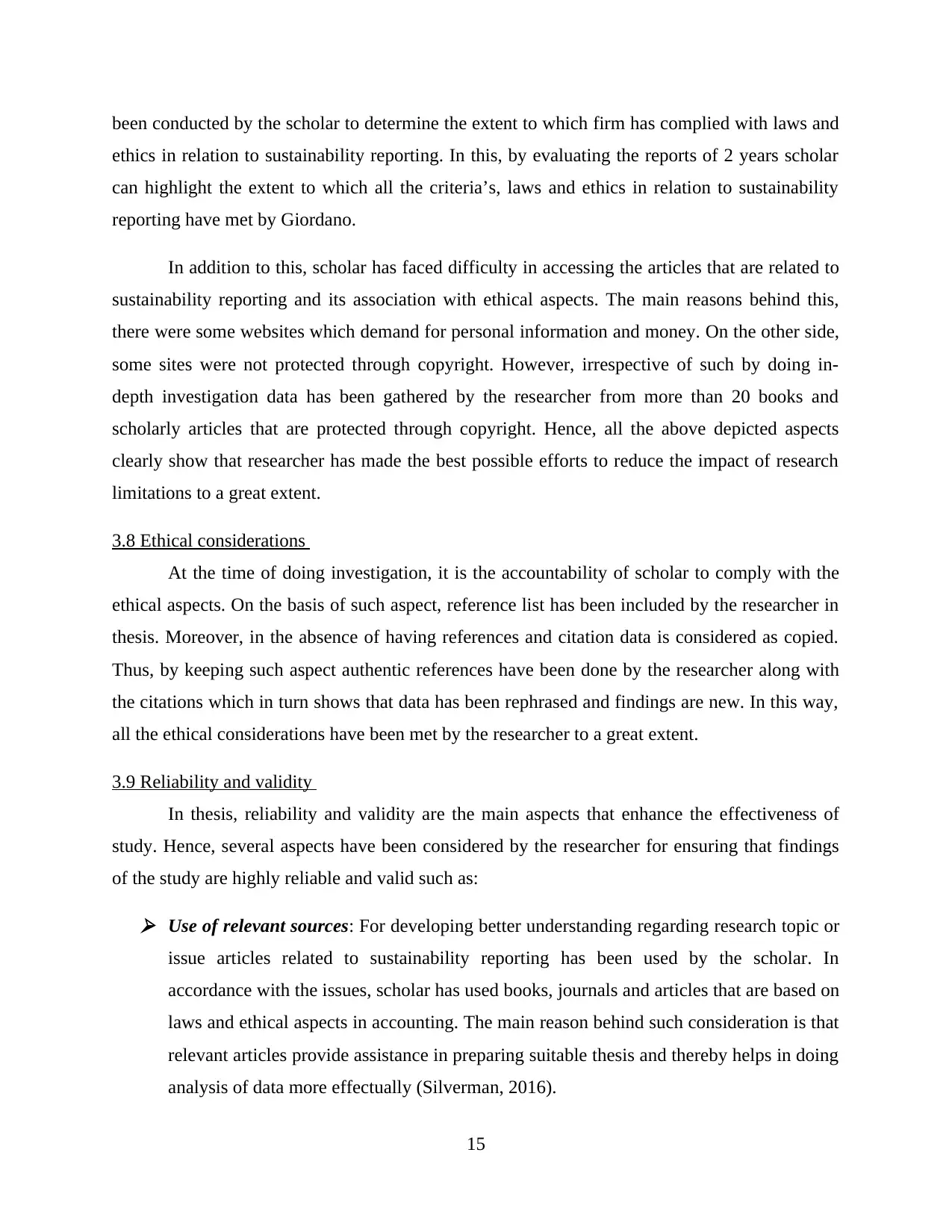
been conducted by the scholar to determine the extent to which firm has complied with laws and
ethics in relation to sustainability reporting. In this, by evaluating the reports of 2 years scholar
can highlight the extent to which all the criteria’s, laws and ethics in relation to sustainability
reporting have met by Giordano.
In addition to this, scholar has faced difficulty in accessing the articles that are related to
sustainability reporting and its association with ethical aspects. The main reasons behind this,
there were some websites which demand for personal information and money. On the other side,
some sites were not protected through copyright. However, irrespective of such by doing in-
depth investigation data has been gathered by the researcher from more than 20 books and
scholarly articles that are protected through copyright. Hence, all the above depicted aspects
clearly show that researcher has made the best possible efforts to reduce the impact of research
limitations to a great extent.
3.8 Ethical considerations
At the time of doing investigation, it is the accountability of scholar to comply with the
ethical aspects. On the basis of such aspect, reference list has been included by the researcher in
thesis. Moreover, in the absence of having references and citation data is considered as copied.
Thus, by keeping such aspect authentic references have been done by the researcher along with
the citations which in turn shows that data has been rephrased and findings are new. In this way,
all the ethical considerations have been met by the researcher to a great extent.
3.9 Reliability and validity
In thesis, reliability and validity are the main aspects that enhance the effectiveness of
study. Hence, several aspects have been considered by the researcher for ensuring that findings
of the study are highly reliable and valid such as:
Use of relevant sources: For developing better understanding regarding research topic or
issue articles related to sustainability reporting has been used by the scholar. In
accordance with the issues, scholar has used books, journals and articles that are based on
laws and ethical aspects in accounting. The main reason behind such consideration is that
relevant articles provide assistance in preparing suitable thesis and thereby helps in doing
analysis of data more effectually (Silverman, 2016).
15
ethics in relation to sustainability reporting. In this, by evaluating the reports of 2 years scholar
can highlight the extent to which all the criteria’s, laws and ethics in relation to sustainability
reporting have met by Giordano.
In addition to this, scholar has faced difficulty in accessing the articles that are related to
sustainability reporting and its association with ethical aspects. The main reasons behind this,
there were some websites which demand for personal information and money. On the other side,
some sites were not protected through copyright. However, irrespective of such by doing in-
depth investigation data has been gathered by the researcher from more than 20 books and
scholarly articles that are protected through copyright. Hence, all the above depicted aspects
clearly show that researcher has made the best possible efforts to reduce the impact of research
limitations to a great extent.
3.8 Ethical considerations
At the time of doing investigation, it is the accountability of scholar to comply with the
ethical aspects. On the basis of such aspect, reference list has been included by the researcher in
thesis. Moreover, in the absence of having references and citation data is considered as copied.
Thus, by keeping such aspect authentic references have been done by the researcher along with
the citations which in turn shows that data has been rephrased and findings are new. In this way,
all the ethical considerations have been met by the researcher to a great extent.
3.9 Reliability and validity
In thesis, reliability and validity are the main aspects that enhance the effectiveness of
study. Hence, several aspects have been considered by the researcher for ensuring that findings
of the study are highly reliable and valid such as:
Use of relevant sources: For developing better understanding regarding research topic or
issue articles related to sustainability reporting has been used by the scholar. In
accordance with the issues, scholar has used books, journals and articles that are based on
laws and ethical aspects in accounting. The main reason behind such consideration is that
relevant articles provide assistance in preparing suitable thesis and thereby helps in doing
analysis of data more effectually (Silverman, 2016).
15
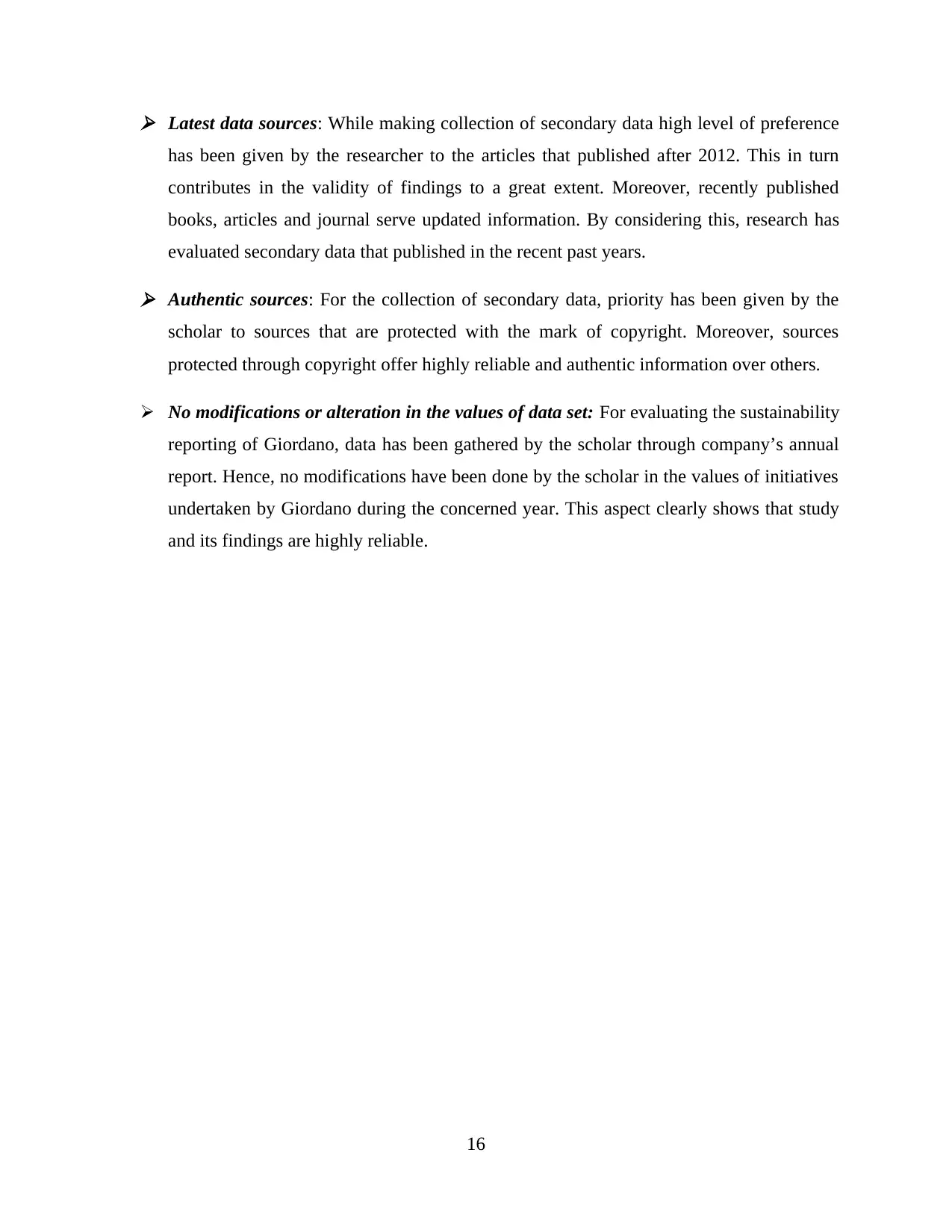
Latest data sources: While making collection of secondary data high level of preference
has been given by the researcher to the articles that published after 2012. This in turn
contributes in the validity of findings to a great extent. Moreover, recently published
books, articles and journal serve updated information. By considering this, research has
evaluated secondary data that published in the recent past years.
Authentic sources: For the collection of secondary data, priority has been given by the
scholar to sources that are protected with the mark of copyright. Moreover, sources
protected through copyright offer highly reliable and authentic information over others.
No modifications or alteration in the values of data set: For evaluating the sustainability
reporting of Giordano, data has been gathered by the scholar through company’s annual
report. Hence, no modifications have been done by the scholar in the values of initiatives
undertaken by Giordano during the concerned year. This aspect clearly shows that study
and its findings are highly reliable.
16
has been given by the researcher to the articles that published after 2012. This in turn
contributes in the validity of findings to a great extent. Moreover, recently published
books, articles and journal serve updated information. By considering this, research has
evaluated secondary data that published in the recent past years.
Authentic sources: For the collection of secondary data, priority has been given by the
scholar to sources that are protected with the mark of copyright. Moreover, sources
protected through copyright offer highly reliable and authentic information over others.
No modifications or alteration in the values of data set: For evaluating the sustainability
reporting of Giordano, data has been gathered by the scholar through company’s annual
report. Hence, no modifications have been done by the scholar in the values of initiatives
undertaken by Giordano during the concerned year. This aspect clearly shows that study
and its findings are highly reliable.
16
Paraphrase This Document
Need a fresh take? Get an instant paraphrase of this document with our AI Paraphraser
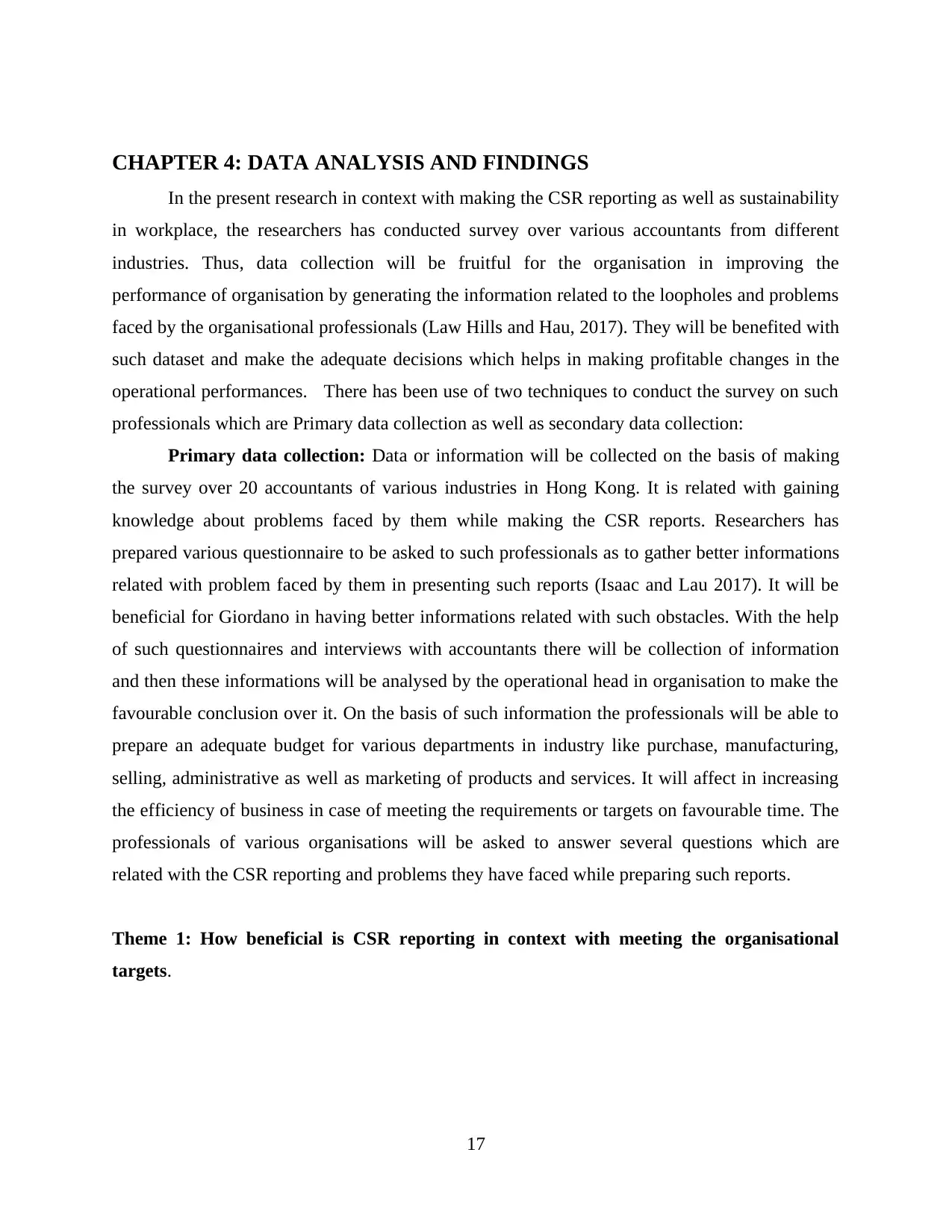
CHAPTER 4: DATA ANALYSIS AND FINDINGS
In the present research in context with making the CSR reporting as well as sustainability
in workplace, the researchers has conducted survey over various accountants from different
industries. Thus, data collection will be fruitful for the organisation in improving the
performance of organisation by generating the information related to the loopholes and problems
faced by the organisational professionals (Law Hills and Hau, 2017). They will be benefited with
such dataset and make the adequate decisions which helps in making profitable changes in the
operational performances. There has been use of two techniques to conduct the survey on such
professionals which are Primary data collection as well as secondary data collection:
Primary data collection: Data or information will be collected on the basis of making
the survey over 20 accountants of various industries in Hong Kong. It is related with gaining
knowledge about problems faced by them while making the CSR reports. Researchers has
prepared various questionnaire to be asked to such professionals as to gather better informations
related with problem faced by them in presenting such reports (Isaac and Lau 2017). It will be
beneficial for Giordano in having better informations related with such obstacles. With the help
of such questionnaires and interviews with accountants there will be collection of information
and then these informations will be analysed by the operational head in organisation to make the
favourable conclusion over it. On the basis of such information the professionals will be able to
prepare an adequate budget for various departments in industry like purchase, manufacturing,
selling, administrative as well as marketing of products and services. It will affect in increasing
the efficiency of business in case of meeting the requirements or targets on favourable time. The
professionals of various organisations will be asked to answer several questions which are
related with the CSR reporting and problems they have faced while preparing such reports.
Theme 1: How beneficial is CSR reporting in context with meeting the organisational
targets.
17
In the present research in context with making the CSR reporting as well as sustainability
in workplace, the researchers has conducted survey over various accountants from different
industries. Thus, data collection will be fruitful for the organisation in improving the
performance of organisation by generating the information related to the loopholes and problems
faced by the organisational professionals (Law Hills and Hau, 2017). They will be benefited with
such dataset and make the adequate decisions which helps in making profitable changes in the
operational performances. There has been use of two techniques to conduct the survey on such
professionals which are Primary data collection as well as secondary data collection:
Primary data collection: Data or information will be collected on the basis of making
the survey over 20 accountants of various industries in Hong Kong. It is related with gaining
knowledge about problems faced by them while making the CSR reports. Researchers has
prepared various questionnaire to be asked to such professionals as to gather better informations
related with problem faced by them in presenting such reports (Isaac and Lau 2017). It will be
beneficial for Giordano in having better informations related with such obstacles. With the help
of such questionnaires and interviews with accountants there will be collection of information
and then these informations will be analysed by the operational head in organisation to make the
favourable conclusion over it. On the basis of such information the professionals will be able to
prepare an adequate budget for various departments in industry like purchase, manufacturing,
selling, administrative as well as marketing of products and services. It will affect in increasing
the efficiency of business in case of meeting the requirements or targets on favourable time. The
professionals of various organisations will be asked to answer several questions which are
related with the CSR reporting and problems they have faced while preparing such reports.
Theme 1: How beneficial is CSR reporting in context with meeting the organisational
targets.
17
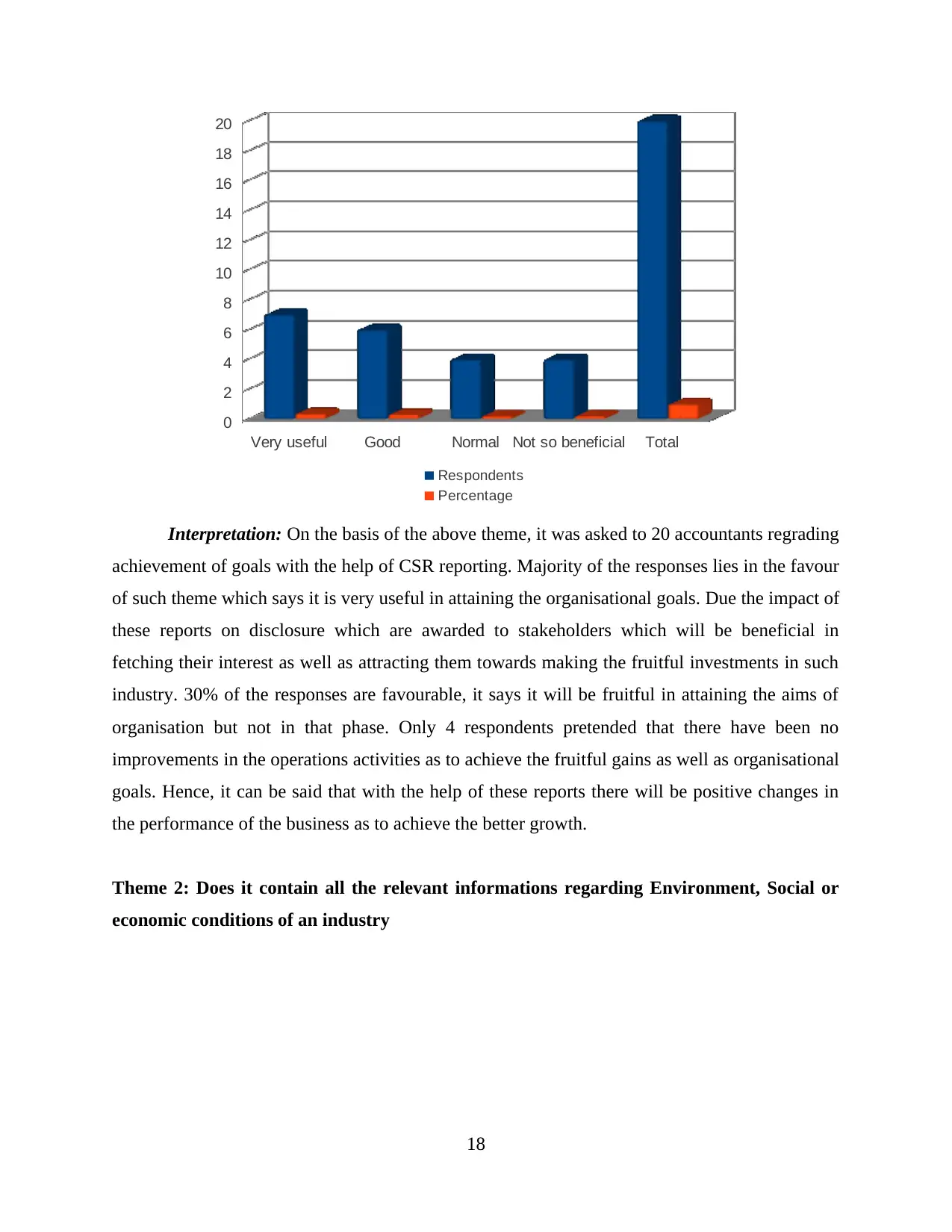
Very useful Good Normal Not so beneficial Total
0
2
4
6
8
10
12
14
16
18
20
Respondents
Percentage
Interpretation: On the basis of the above theme, it was asked to 20 accountants regrading
achievement of goals with the help of CSR reporting. Majority of the responses lies in the favour
of such theme which says it is very useful in attaining the organisational goals. Due the impact of
these reports on disclosure which are awarded to stakeholders which will be beneficial in
fetching their interest as well as attracting them towards making the fruitful investments in such
industry. 30% of the responses are favourable, it says it will be fruitful in attaining the aims of
organisation but not in that phase. Only 4 respondents pretended that there have been no
improvements in the operations activities as to achieve the fruitful gains as well as organisational
goals. Hence, it can be said that with the help of these reports there will be positive changes in
the performance of the business as to achieve the better growth.
Theme 2: Does it contain all the relevant informations regarding Environment, Social or
economic conditions of an industry
18
0
2
4
6
8
10
12
14
16
18
20
Respondents
Percentage
Interpretation: On the basis of the above theme, it was asked to 20 accountants regrading
achievement of goals with the help of CSR reporting. Majority of the responses lies in the favour
of such theme which says it is very useful in attaining the organisational goals. Due the impact of
these reports on disclosure which are awarded to stakeholders which will be beneficial in
fetching their interest as well as attracting them towards making the fruitful investments in such
industry. 30% of the responses are favourable, it says it will be fruitful in attaining the aims of
organisation but not in that phase. Only 4 respondents pretended that there have been no
improvements in the operations activities as to achieve the fruitful gains as well as organisational
goals. Hence, it can be said that with the help of these reports there will be positive changes in
the performance of the business as to achieve the better growth.
Theme 2: Does it contain all the relevant informations regarding Environment, Social or
economic conditions of an industry
18
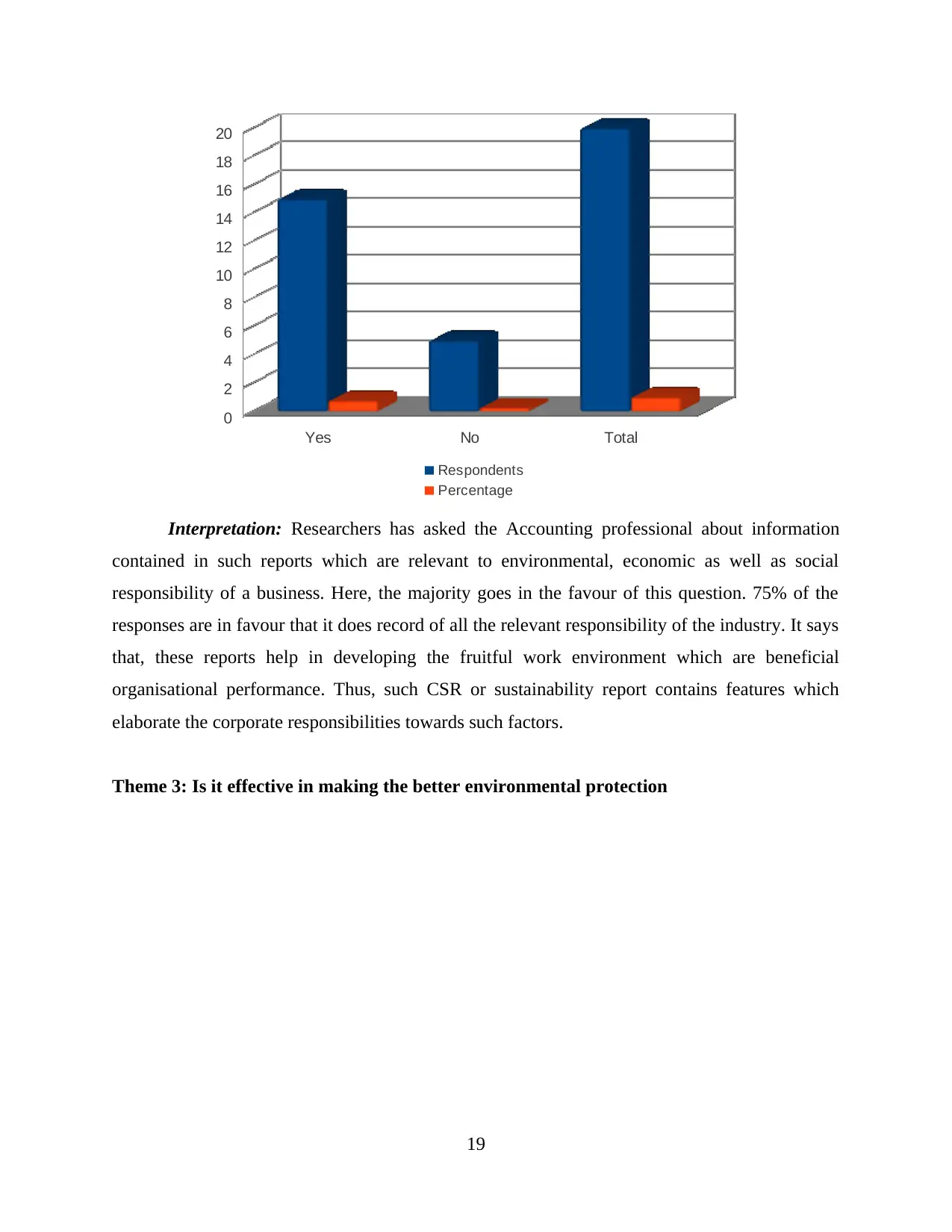
Yes No Total
0
2
4
6
8
10
12
14
16
18
20
Respondents
Percentage
Interpretation: Researchers has asked the Accounting professional about information
contained in such reports which are relevant to environmental, economic as well as social
responsibility of a business. Here, the majority goes in the favour of this question. 75% of the
responses are in favour that it does record of all the relevant responsibility of the industry. It says
that, these reports help in developing the fruitful work environment which are beneficial
organisational performance. Thus, such CSR or sustainability report contains features which
elaborate the corporate responsibilities towards such factors.
Theme 3: Is it effective in making the better environmental protection
19
0
2
4
6
8
10
12
14
16
18
20
Respondents
Percentage
Interpretation: Researchers has asked the Accounting professional about information
contained in such reports which are relevant to environmental, economic as well as social
responsibility of a business. Here, the majority goes in the favour of this question. 75% of the
responses are in favour that it does record of all the relevant responsibility of the industry. It says
that, these reports help in developing the fruitful work environment which are beneficial
organisational performance. Thus, such CSR or sustainability report contains features which
elaborate the corporate responsibilities towards such factors.
Theme 3: Is it effective in making the better environmental protection
19
Secure Best Marks with AI Grader
Need help grading? Try our AI Grader for instant feedback on your assignments.
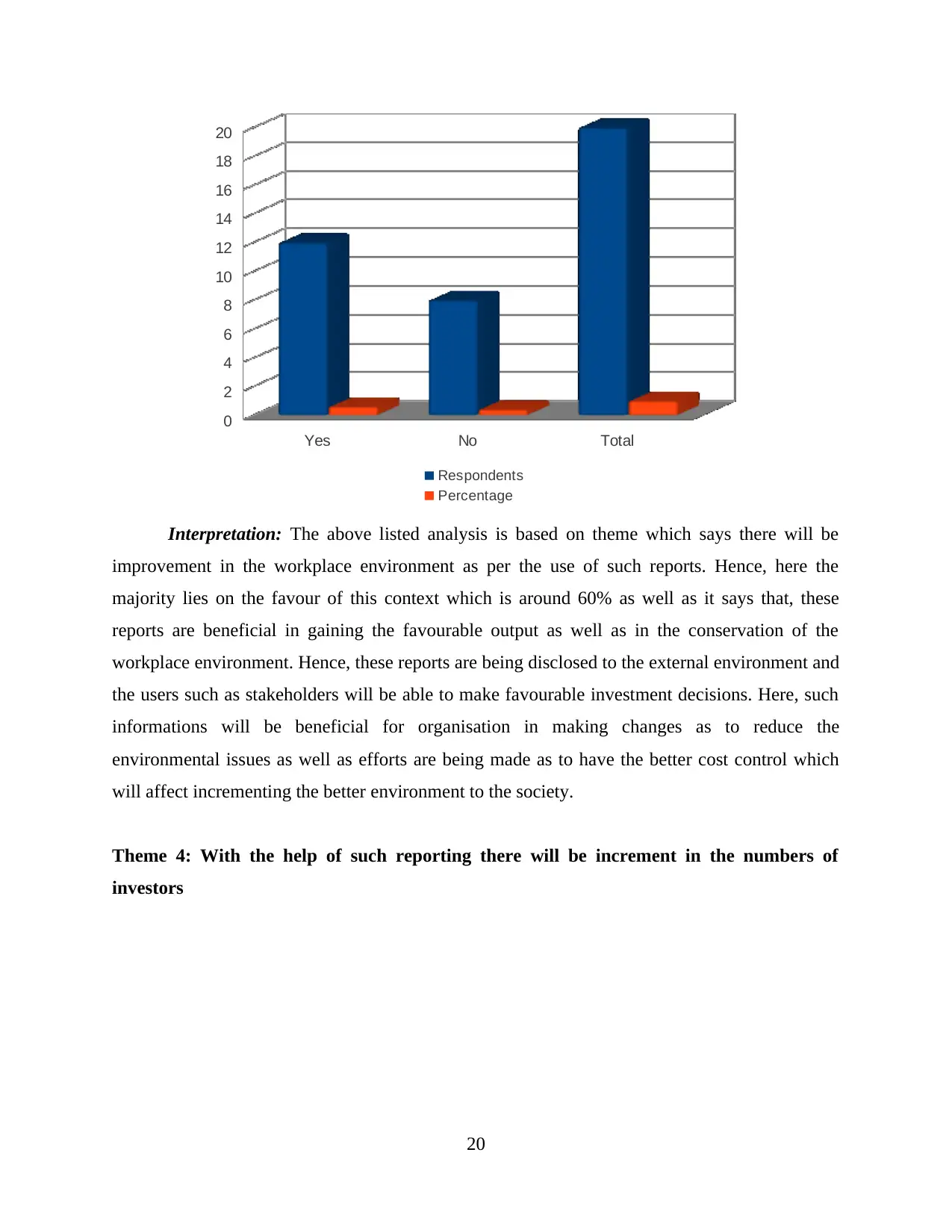
Yes No Total
0
2
4
6
8
10
12
14
16
18
20
Respondents
Percentage
Interpretation: The above listed analysis is based on theme which says there will be
improvement in the workplace environment as per the use of such reports. Hence, here the
majority lies on the favour of this context which is around 60% as well as it says that, these
reports are beneficial in gaining the favourable output as well as in the conservation of the
workplace environment. Hence, these reports are being disclosed to the external environment and
the users such as stakeholders will be able to make favourable investment decisions. Here, such
informations will be beneficial for organisation in making changes as to reduce the
environmental issues as well as efforts are being made as to have the better cost control which
will affect incrementing the better environment to the society.
Theme 4: With the help of such reporting there will be increment in the numbers of
investors
20
0
2
4
6
8
10
12
14
16
18
20
Respondents
Percentage
Interpretation: The above listed analysis is based on theme which says there will be
improvement in the workplace environment as per the use of such reports. Hence, here the
majority lies on the favour of this context which is around 60% as well as it says that, these
reports are beneficial in gaining the favourable output as well as in the conservation of the
workplace environment. Hence, these reports are being disclosed to the external environment and
the users such as stakeholders will be able to make favourable investment decisions. Here, such
informations will be beneficial for organisation in making changes as to reduce the
environmental issues as well as efforts are being made as to have the better cost control which
will affect incrementing the better environment to the society.
Theme 4: With the help of such reporting there will be increment in the numbers of
investors
20
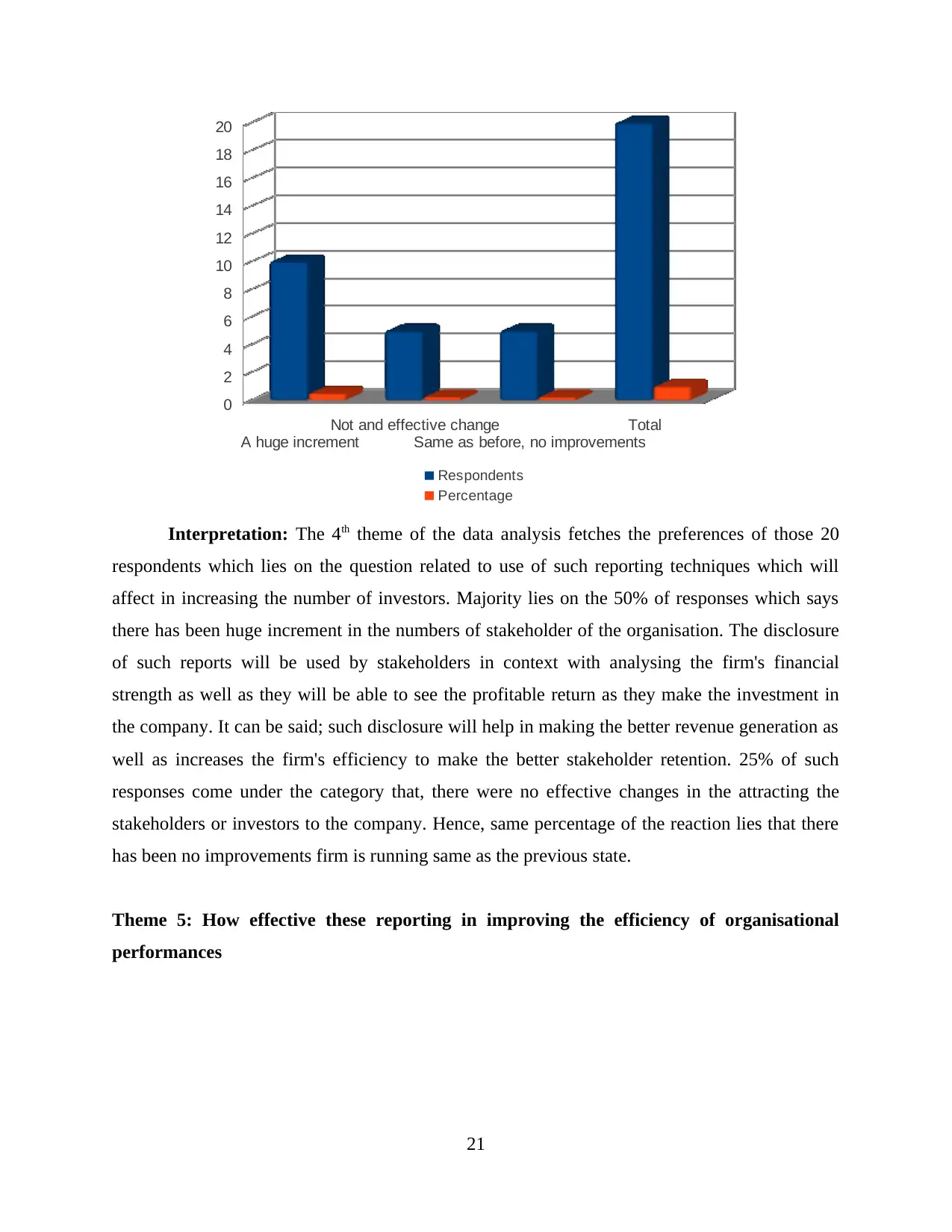
A huge increment
Not and effective change
Same as before, no improvements
Total
0
2
4
6
8
10
12
14
16
18
20
Respondents
Percentage
Interpretation: The 4th theme of the data analysis fetches the preferences of those 20
respondents which lies on the question related to use of such reporting techniques which will
affect in increasing the number of investors. Majority lies on the 50% of responses which says
there has been huge increment in the numbers of stakeholder of the organisation. The disclosure
of such reports will be used by stakeholders in context with analysing the firm's financial
strength as well as they will be able to see the profitable return as they make the investment in
the company. It can be said; such disclosure will help in making the better revenue generation as
well as increases the firm's efficiency to make the better stakeholder retention. 25% of such
responses come under the category that, there were no effective changes in the attracting the
stakeholders or investors to the company. Hence, same percentage of the reaction lies that there
has been no improvements firm is running same as the previous state.
Theme 5: How effective these reporting in improving the efficiency of organisational
performances
21
Not and effective change
Same as before, no improvements
Total
0
2
4
6
8
10
12
14
16
18
20
Respondents
Percentage
Interpretation: The 4th theme of the data analysis fetches the preferences of those 20
respondents which lies on the question related to use of such reporting techniques which will
affect in increasing the number of investors. Majority lies on the 50% of responses which says
there has been huge increment in the numbers of stakeholder of the organisation. The disclosure
of such reports will be used by stakeholders in context with analysing the firm's financial
strength as well as they will be able to see the profitable return as they make the investment in
the company. It can be said; such disclosure will help in making the better revenue generation as
well as increases the firm's efficiency to make the better stakeholder retention. 25% of such
responses come under the category that, there were no effective changes in the attracting the
stakeholders or investors to the company. Hence, same percentage of the reaction lies that there
has been no improvements firm is running same as the previous state.
Theme 5: How effective these reporting in improving the efficiency of organisational
performances
21
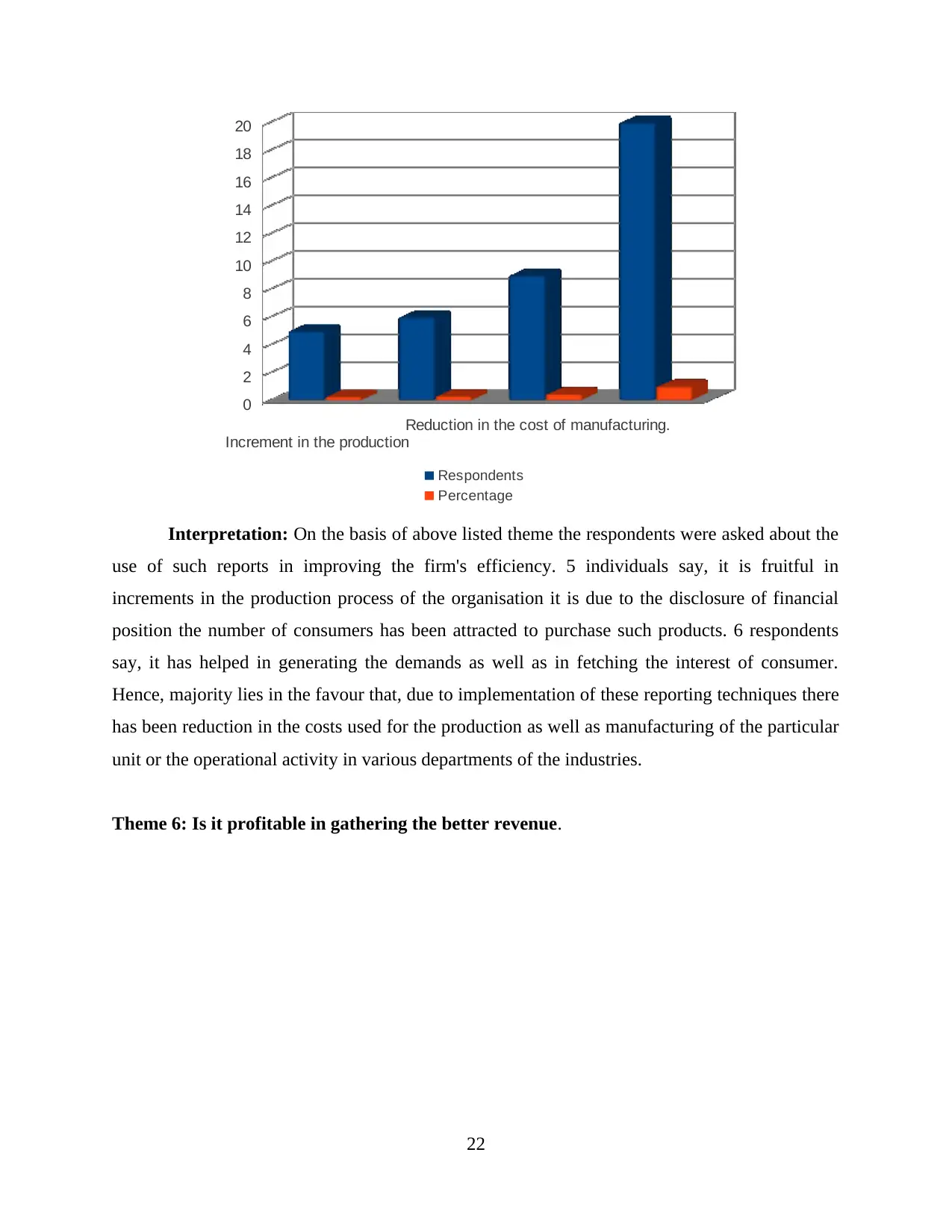
Increment in the production
Reduction in the cost of manufacturing.
0
2
4
6
8
10
12
14
16
18
20
Respondents
Percentage
Interpretation: On the basis of above listed theme the respondents were asked about the
use of such reports in improving the firm's efficiency. 5 individuals say, it is fruitful in
increments in the production process of the organisation it is due to the disclosure of financial
position the number of consumers has been attracted to purchase such products. 6 respondents
say, it has helped in generating the demands as well as in fetching the interest of consumer.
Hence, majority lies in the favour that, due to implementation of these reporting techniques there
has been reduction in the costs used for the production as well as manufacturing of the particular
unit or the operational activity in various departments of the industries.
Theme 6: Is it profitable in gathering the better revenue.
22
Reduction in the cost of manufacturing.
0
2
4
6
8
10
12
14
16
18
20
Respondents
Percentage
Interpretation: On the basis of above listed theme the respondents were asked about the
use of such reports in improving the firm's efficiency. 5 individuals say, it is fruitful in
increments in the production process of the organisation it is due to the disclosure of financial
position the number of consumers has been attracted to purchase such products. 6 respondents
say, it has helped in generating the demands as well as in fetching the interest of consumer.
Hence, majority lies in the favour that, due to implementation of these reporting techniques there
has been reduction in the costs used for the production as well as manufacturing of the particular
unit or the operational activity in various departments of the industries.
Theme 6: Is it profitable in gathering the better revenue.
22
Paraphrase This Document
Need a fresh take? Get an instant paraphrase of this document with our AI Paraphraser
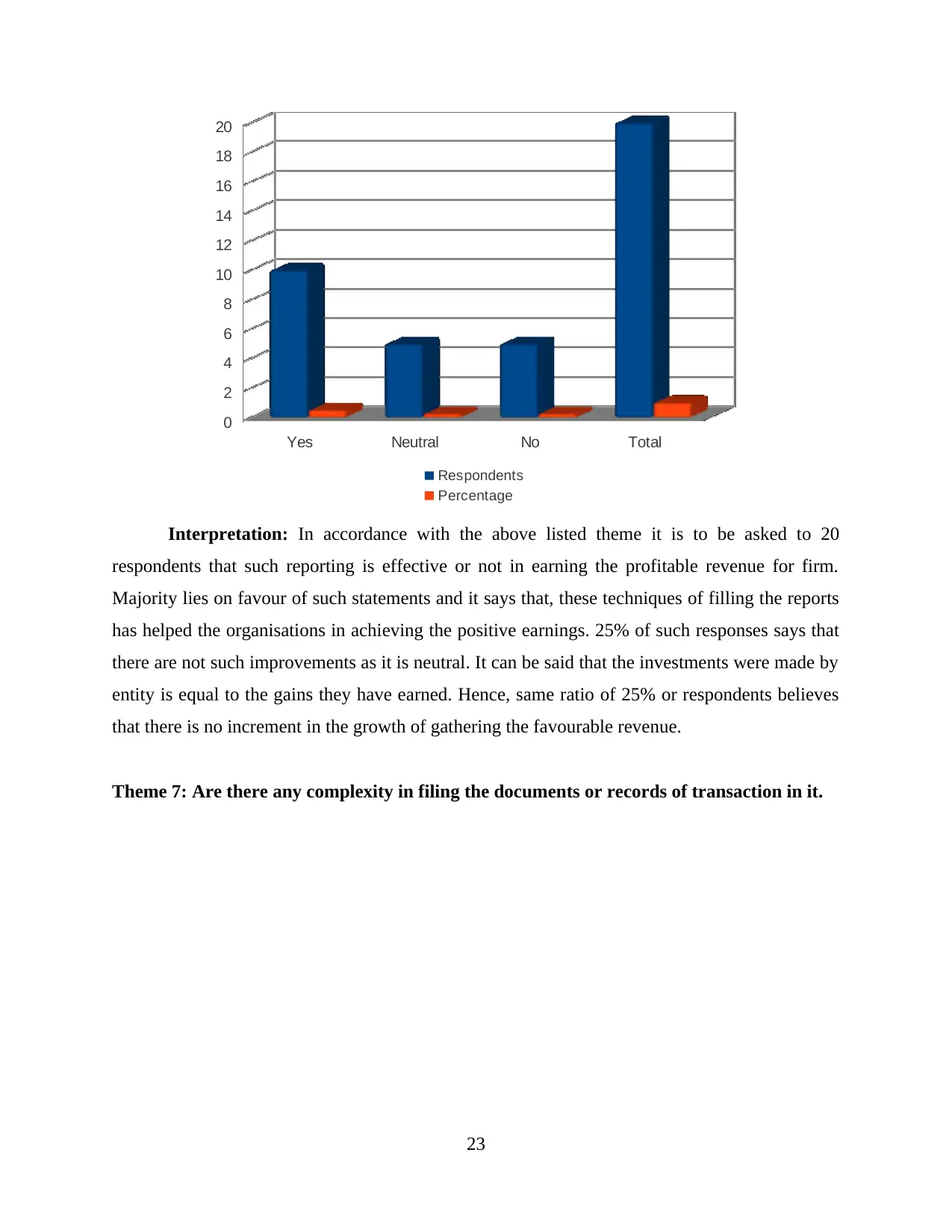
Yes Neutral No Total
0
2
4
6
8
10
12
14
16
18
20
Respondents
Percentage
Interpretation: In accordance with the above listed theme it is to be asked to 20
respondents that such reporting is effective or not in earning the profitable revenue for firm.
Majority lies on favour of such statements and it says that, these techniques of filling the reports
has helped the organisations in achieving the positive earnings. 25% of such responses says that
there are not such improvements as it is neutral. It can be said that the investments were made by
entity is equal to the gains they have earned. Hence, same ratio of 25% or respondents believes
that there is no increment in the growth of gathering the favourable revenue.
Theme 7: Are there any complexity in filing the documents or records of transaction in it.
23
0
2
4
6
8
10
12
14
16
18
20
Respondents
Percentage
Interpretation: In accordance with the above listed theme it is to be asked to 20
respondents that such reporting is effective or not in earning the profitable revenue for firm.
Majority lies on favour of such statements and it says that, these techniques of filling the reports
has helped the organisations in achieving the positive earnings. 25% of such responses says that
there are not such improvements as it is neutral. It can be said that the investments were made by
entity is equal to the gains they have earned. Hence, same ratio of 25% or respondents believes
that there is no increment in the growth of gathering the favourable revenue.
Theme 7: Are there any complexity in filing the documents or records of transaction in it.
23
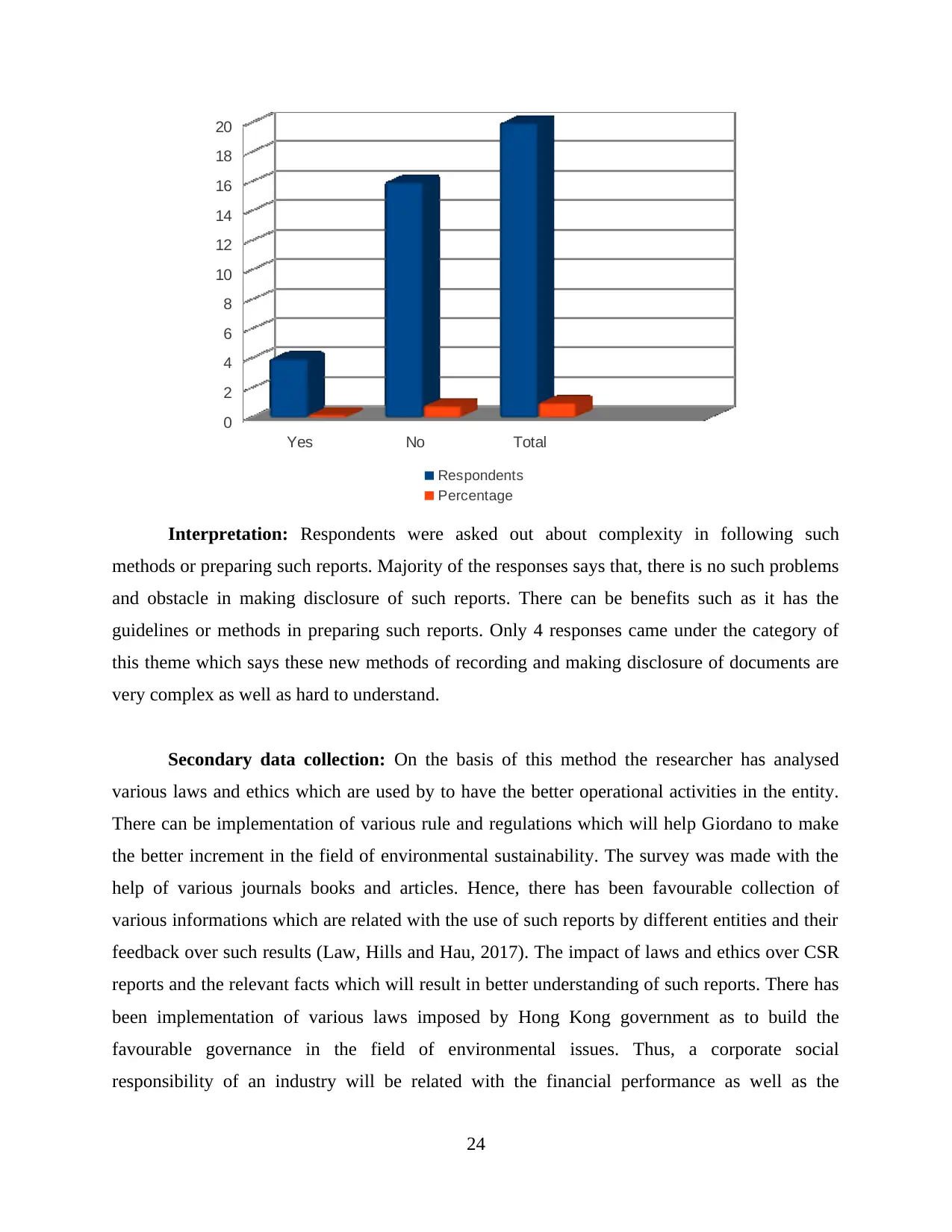
Yes No Total
0
2
4
6
8
10
12
14
16
18
20
Respondents
Percentage
Interpretation: Respondents were asked out about complexity in following such
methods or preparing such reports. Majority of the responses says that, there is no such problems
and obstacle in making disclosure of such reports. There can be benefits such as it has the
guidelines or methods in preparing such reports. Only 4 responses came under the category of
this theme which says these new methods of recording and making disclosure of documents are
very complex as well as hard to understand.
Secondary data collection: On the basis of this method the researcher has analysed
various laws and ethics which are used by to have the better operational activities in the entity.
There can be implementation of various rule and regulations which will help Giordano to make
the better increment in the field of environmental sustainability. The survey was made with the
help of various journals books and articles. Hence, there has been favourable collection of
various informations which are related with the use of such reports by different entities and their
feedback over such results (Law, Hills and Hau, 2017). The impact of laws and ethics over CSR
reports and the relevant facts which will result in better understanding of such reports. There has
been implementation of various laws imposed by Hong Kong government as to build the
favourable governance in the field of environmental issues. Thus, a corporate social
responsibility of an industry will be related with the financial performance as well as the
24
0
2
4
6
8
10
12
14
16
18
20
Respondents
Percentage
Interpretation: Respondents were asked out about complexity in following such
methods or preparing such reports. Majority of the responses says that, there is no such problems
and obstacle in making disclosure of such reports. There can be benefits such as it has the
guidelines or methods in preparing such reports. Only 4 responses came under the category of
this theme which says these new methods of recording and making disclosure of documents are
very complex as well as hard to understand.
Secondary data collection: On the basis of this method the researcher has analysed
various laws and ethics which are used by to have the better operational activities in the entity.
There can be implementation of various rule and regulations which will help Giordano to make
the better increment in the field of environmental sustainability. The survey was made with the
help of various journals books and articles. Hence, there has been favourable collection of
various informations which are related with the use of such reports by different entities and their
feedback over such results (Law, Hills and Hau, 2017). The impact of laws and ethics over CSR
reports and the relevant facts which will result in better understanding of such reports. There has
been implementation of various laws imposed by Hong Kong government as to build the
favourable governance in the field of environmental issues. Thus, a corporate social
responsibility of an industry will be related with the financial performance as well as the
24
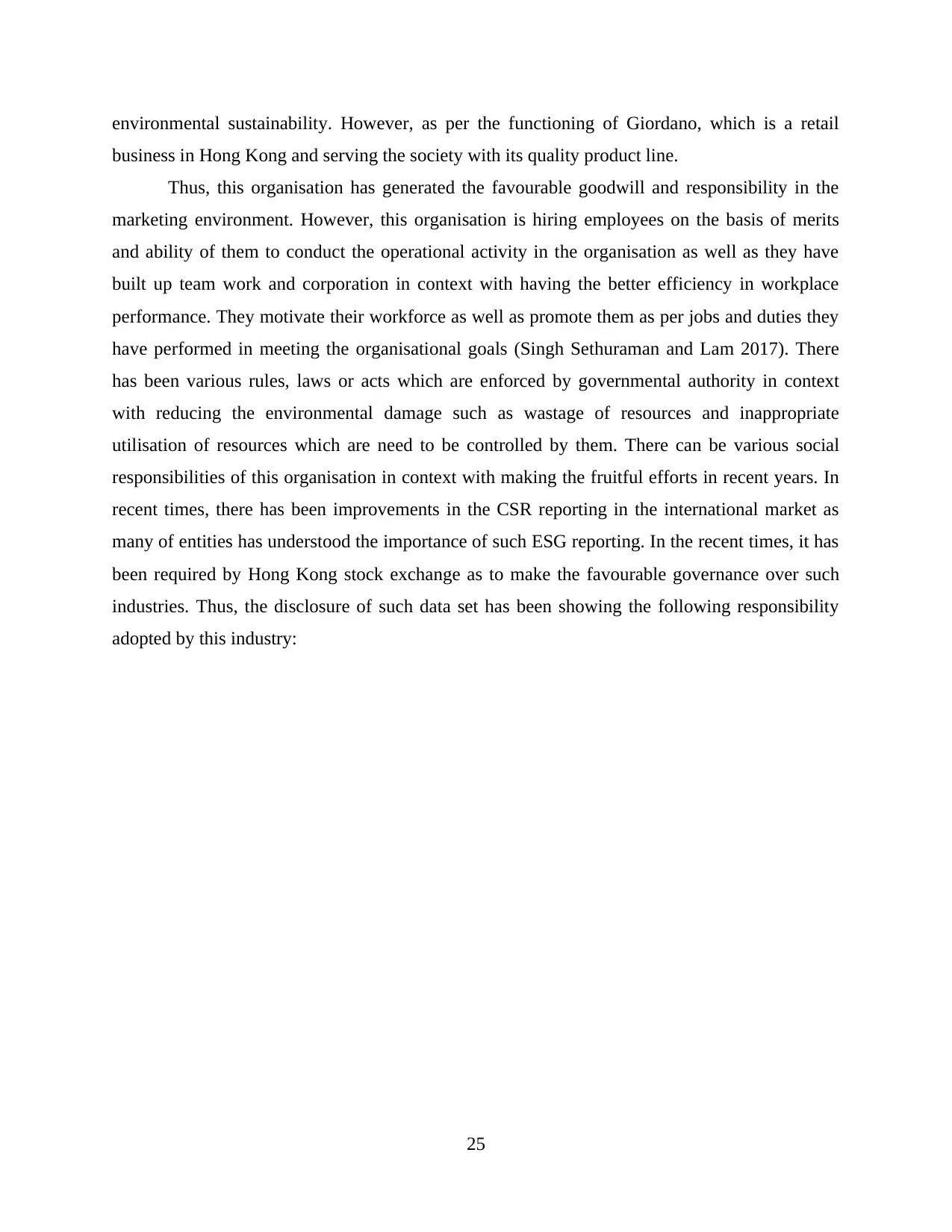
environmental sustainability. However, as per the functioning of Giordano, which is a retail
business in Hong Kong and serving the society with its quality product line.
Thus, this organisation has generated the favourable goodwill and responsibility in the
marketing environment. However, this organisation is hiring employees on the basis of merits
and ability of them to conduct the operational activity in the organisation as well as they have
built up team work and corporation in context with having the better efficiency in workplace
performance. They motivate their workforce as well as promote them as per jobs and duties they
have performed in meeting the organisational goals (Singh Sethuraman and Lam 2017). There
has been various rules, laws or acts which are enforced by governmental authority in context
with reducing the environmental damage such as wastage of resources and inappropriate
utilisation of resources which are need to be controlled by them. There can be various social
responsibilities of this organisation in context with making the fruitful efforts in recent years. In
recent times, there has been improvements in the CSR reporting in the international market as
many of entities has understood the importance of such ESG reporting. In the recent times, it has
been required by Hong Kong stock exchange as to make the favourable governance over such
industries. Thus, the disclosure of such data set has been showing the following responsibility
adopted by this industry:
25
business in Hong Kong and serving the society with its quality product line.
Thus, this organisation has generated the favourable goodwill and responsibility in the
marketing environment. However, this organisation is hiring employees on the basis of merits
and ability of them to conduct the operational activity in the organisation as well as they have
built up team work and corporation in context with having the better efficiency in workplace
performance. They motivate their workforce as well as promote them as per jobs and duties they
have performed in meeting the organisational goals (Singh Sethuraman and Lam 2017). There
has been various rules, laws or acts which are enforced by governmental authority in context
with reducing the environmental damage such as wastage of resources and inappropriate
utilisation of resources which are need to be controlled by them. There can be various social
responsibilities of this organisation in context with making the fruitful efforts in recent years. In
recent times, there has been improvements in the CSR reporting in the international market as
many of entities has understood the importance of such ESG reporting. In the recent times, it has
been required by Hong Kong stock exchange as to make the favourable governance over such
industries. Thus, the disclosure of such data set has been showing the following responsibility
adopted by this industry:
25
Secure Best Marks with AI Grader
Need help grading? Try our AI Grader for instant feedback on your assignments.
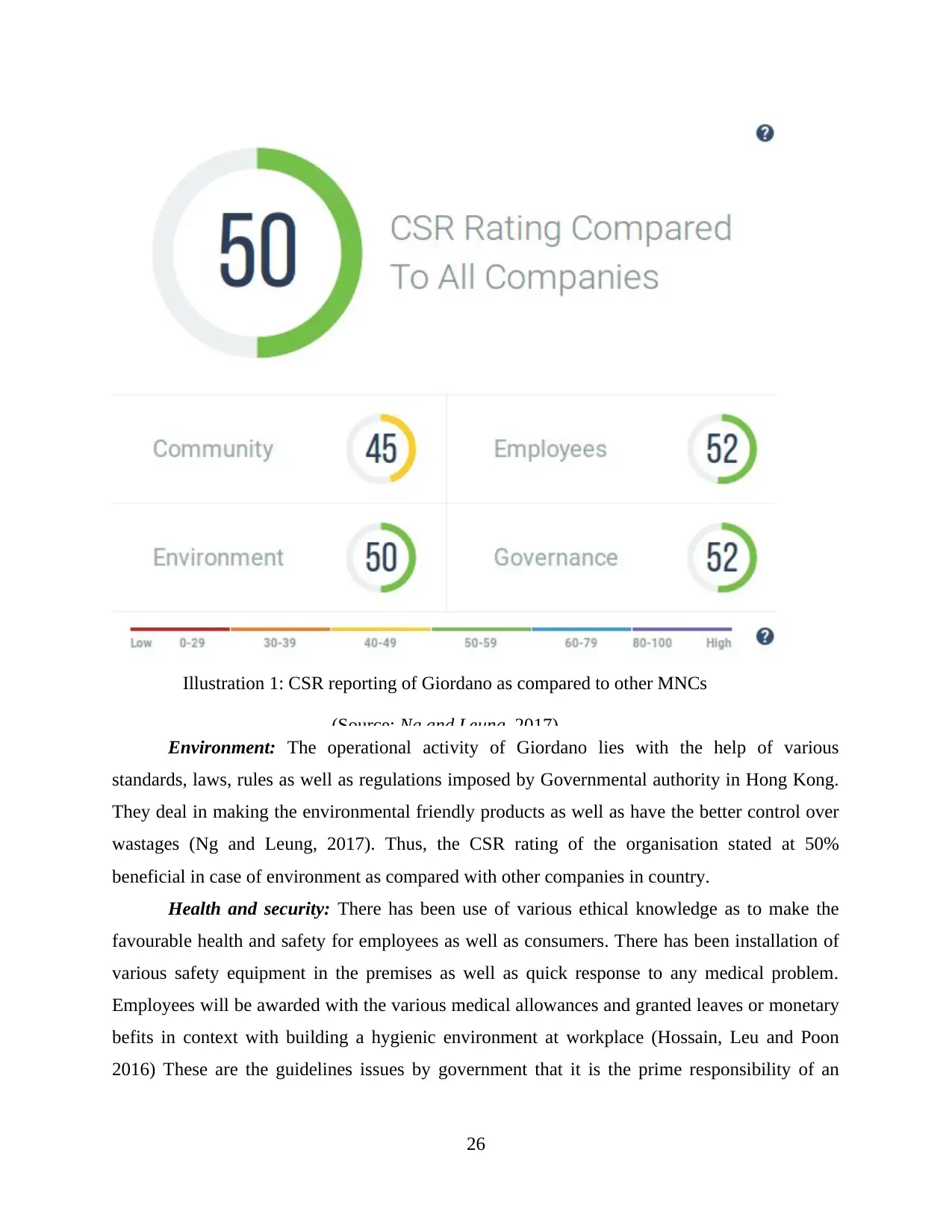
Illustration 1: CSR reporting of Giordano as compared to other MNCs
(Source: Ng and Leung, 2017)
Environment: The operational activity of Giordano lies with the help of various
standards, laws, rules as well as regulations imposed by Governmental authority in Hong Kong.
They deal in making the environmental friendly products as well as have the better control over
wastages (Ng and Leung, 2017). Thus, the CSR rating of the organisation stated at 50%
beneficial in case of environment as compared with other companies in country.
Health and security: There has been use of various ethical knowledge as to make the
favourable health and safety for employees as well as consumers. There has been installation of
various safety equipment in the premises as well as quick response to any medical problem.
Employees will be awarded with the various medical allowances and granted leaves or monetary
befits in context with building a hygienic environment at workplace (Hossain, Leu and Poon
2016) These are the guidelines issues by government that it is the prime responsibility of an
26
(Source: Ng and Leung, 2017)
Environment: The operational activity of Giordano lies with the help of various
standards, laws, rules as well as regulations imposed by Governmental authority in Hong Kong.
They deal in making the environmental friendly products as well as have the better control over
wastages (Ng and Leung, 2017). Thus, the CSR rating of the organisation stated at 50%
beneficial in case of environment as compared with other companies in country.
Health and security: There has been use of various ethical knowledge as to make the
favourable health and safety for employees as well as consumers. There has been installation of
various safety equipment in the premises as well as quick response to any medical problem.
Employees will be awarded with the various medical allowances and granted leaves or monetary
befits in context with building a hygienic environment at workplace (Hossain, Leu and Poon
2016) These are the guidelines issues by government that it is the prime responsibility of an
26
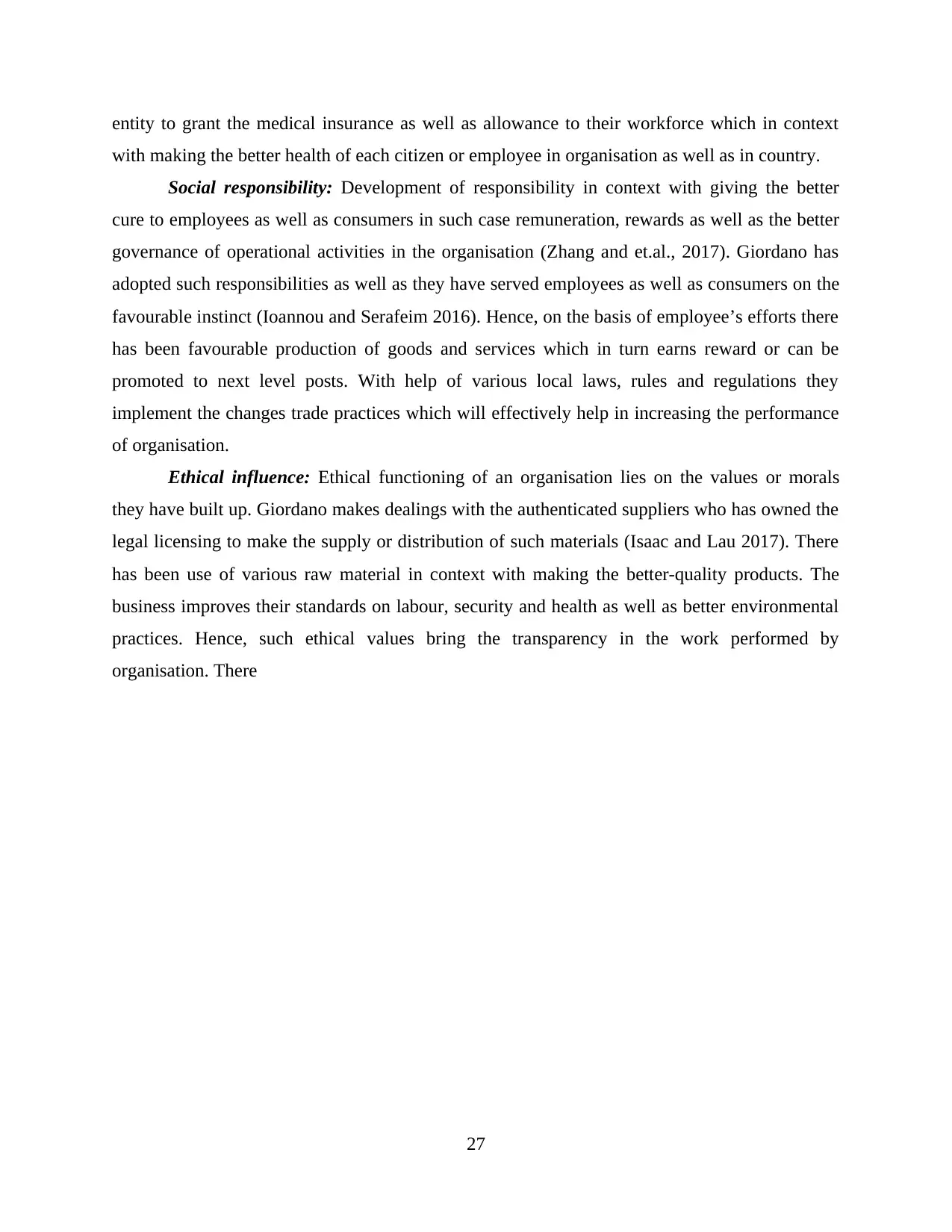
entity to grant the medical insurance as well as allowance to their workforce which in context
with making the better health of each citizen or employee in organisation as well as in country.
Social responsibility: Development of responsibility in context with giving the better
cure to employees as well as consumers in such case remuneration, rewards as well as the better
governance of operational activities in the organisation (Zhang and et.al., 2017). Giordano has
adopted such responsibilities as well as they have served employees as well as consumers on the
favourable instinct (Ioannou and Serafeim 2016). Hence, on the basis of employee’s efforts there
has been favourable production of goods and services which in turn earns reward or can be
promoted to next level posts. With help of various local laws, rules and regulations they
implement the changes trade practices which will effectively help in increasing the performance
of organisation.
Ethical influence: Ethical functioning of an organisation lies on the values or morals
they have built up. Giordano makes dealings with the authenticated suppliers who has owned the
legal licensing to make the supply or distribution of such materials (Isaac and Lau 2017). There
has been use of various raw material in context with making the better-quality products. The
business improves their standards on labour, security and health as well as better environmental
practices. Hence, such ethical values bring the transparency in the work performed by
organisation. There
27
with making the better health of each citizen or employee in organisation as well as in country.
Social responsibility: Development of responsibility in context with giving the better
cure to employees as well as consumers in such case remuneration, rewards as well as the better
governance of operational activities in the organisation (Zhang and et.al., 2017). Giordano has
adopted such responsibilities as well as they have served employees as well as consumers on the
favourable instinct (Ioannou and Serafeim 2016). Hence, on the basis of employee’s efforts there
has been favourable production of goods and services which in turn earns reward or can be
promoted to next level posts. With help of various local laws, rules and regulations they
implement the changes trade practices which will effectively help in increasing the performance
of organisation.
Ethical influence: Ethical functioning of an organisation lies on the values or morals
they have built up. Giordano makes dealings with the authenticated suppliers who has owned the
legal licensing to make the supply or distribution of such materials (Isaac and Lau 2017). There
has been use of various raw material in context with making the better-quality products. The
business improves their standards on labour, security and health as well as better environmental
practices. Hence, such ethical values bring the transparency in the work performed by
organisation. There
27
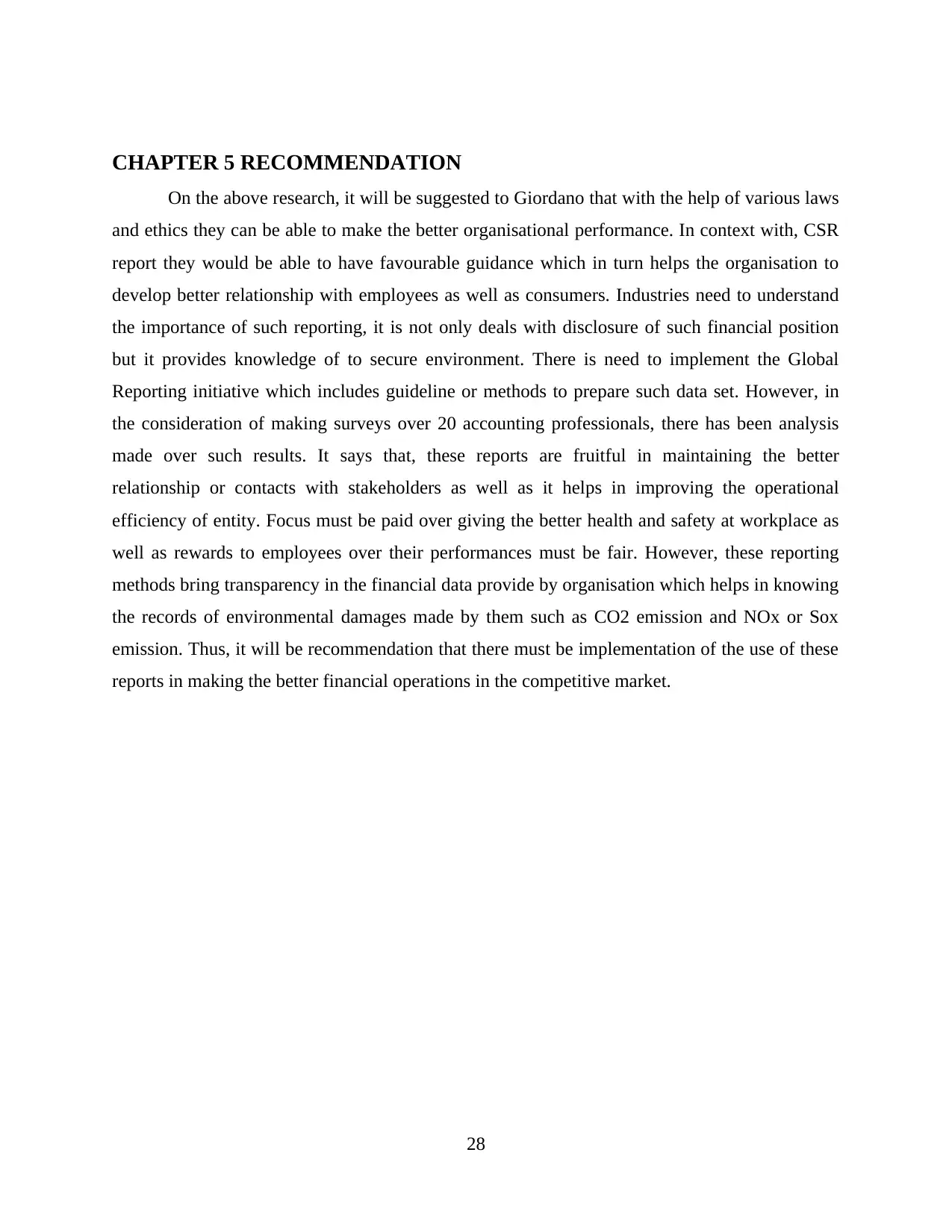
CHAPTER 5 RECOMMENDATION
On the above research, it will be suggested to Giordano that with the help of various laws
and ethics they can be able to make the better organisational performance. In context with, CSR
report they would be able to have favourable guidance which in turn helps the organisation to
develop better relationship with employees as well as consumers. Industries need to understand
the importance of such reporting, it is not only deals with disclosure of such financial position
but it provides knowledge of to secure environment. There is need to implement the Global
Reporting initiative which includes guideline or methods to prepare such data set. However, in
the consideration of making surveys over 20 accounting professionals, there has been analysis
made over such results. It says that, these reports are fruitful in maintaining the better
relationship or contacts with stakeholders as well as it helps in improving the operational
efficiency of entity. Focus must be paid over giving the better health and safety at workplace as
well as rewards to employees over their performances must be fair. However, these reporting
methods bring transparency in the financial data provide by organisation which helps in knowing
the records of environmental damages made by them such as CO2 emission and NOx or Sox
emission. Thus, it will be recommendation that there must be implementation of the use of these
reports in making the better financial operations in the competitive market.
28
On the above research, it will be suggested to Giordano that with the help of various laws
and ethics they can be able to make the better organisational performance. In context with, CSR
report they would be able to have favourable guidance which in turn helps the organisation to
develop better relationship with employees as well as consumers. Industries need to understand
the importance of such reporting, it is not only deals with disclosure of such financial position
but it provides knowledge of to secure environment. There is need to implement the Global
Reporting initiative which includes guideline or methods to prepare such data set. However, in
the consideration of making surveys over 20 accounting professionals, there has been analysis
made over such results. It says that, these reports are fruitful in maintaining the better
relationship or contacts with stakeholders as well as it helps in improving the operational
efficiency of entity. Focus must be paid over giving the better health and safety at workplace as
well as rewards to employees over their performances must be fair. However, these reporting
methods bring transparency in the financial data provide by organisation which helps in knowing
the records of environmental damages made by them such as CO2 emission and NOx or Sox
emission. Thus, it will be recommendation that there must be implementation of the use of these
reports in making the better financial operations in the competitive market.
28
Paraphrase This Document
Need a fresh take? Get an instant paraphrase of this document with our AI Paraphraser
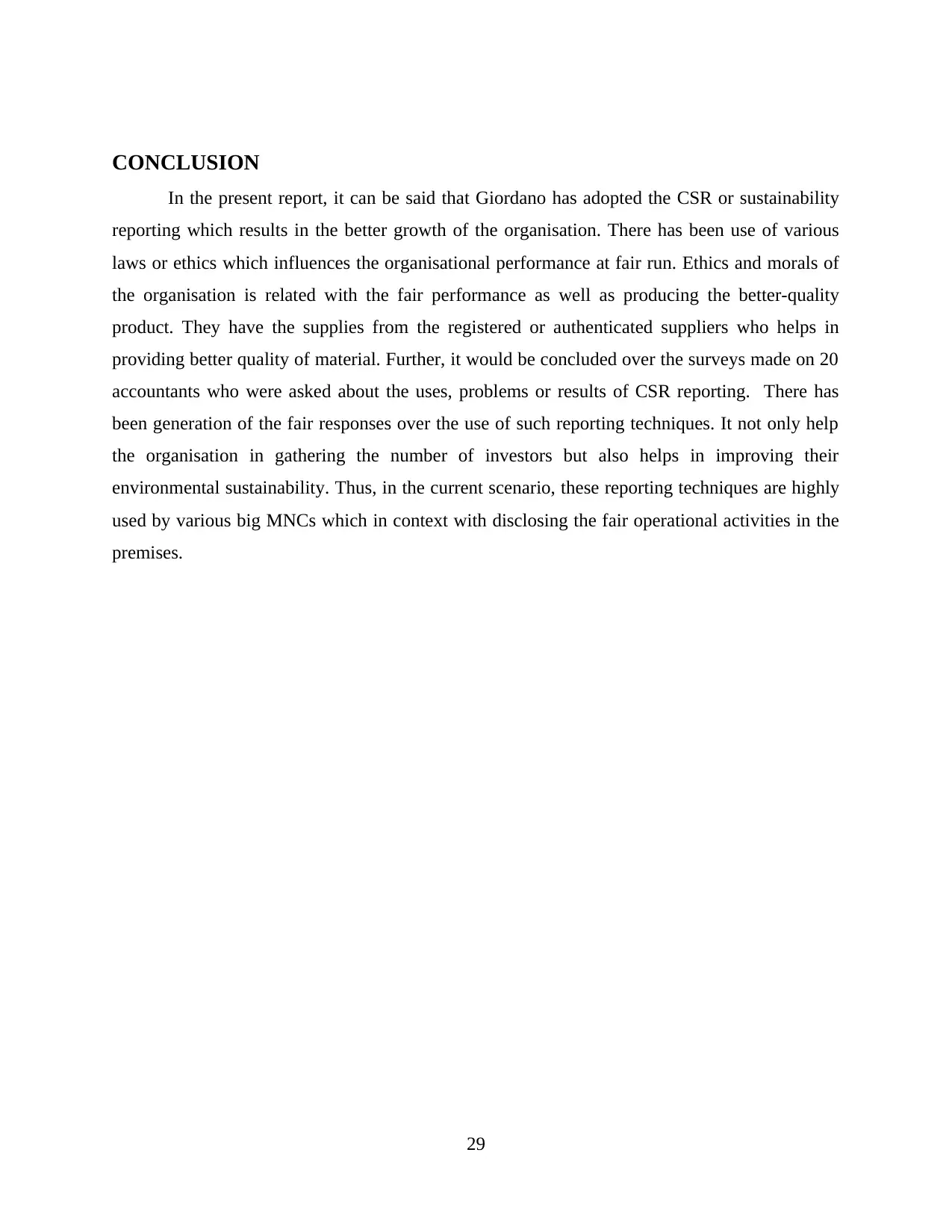
CONCLUSION
In the present report, it can be said that Giordano has adopted the CSR or sustainability
reporting which results in the better growth of the organisation. There has been use of various
laws or ethics which influences the organisational performance at fair run. Ethics and morals of
the organisation is related with the fair performance as well as producing the better-quality
product. They have the supplies from the registered or authenticated suppliers who helps in
providing better quality of material. Further, it would be concluded over the surveys made on 20
accountants who were asked about the uses, problems or results of CSR reporting. There has
been generation of the fair responses over the use of such reporting techniques. It not only help
the organisation in gathering the number of investors but also helps in improving their
environmental sustainability. Thus, in the current scenario, these reporting techniques are highly
used by various big MNCs which in context with disclosing the fair operational activities in the
premises.
29
In the present report, it can be said that Giordano has adopted the CSR or sustainability
reporting which results in the better growth of the organisation. There has been use of various
laws or ethics which influences the organisational performance at fair run. Ethics and morals of
the organisation is related with the fair performance as well as producing the better-quality
product. They have the supplies from the registered or authenticated suppliers who helps in
providing better quality of material. Further, it would be concluded over the surveys made on 20
accountants who were asked about the uses, problems or results of CSR reporting. There has
been generation of the fair responses over the use of such reporting techniques. It not only help
the organisation in gathering the number of investors but also helps in improving their
environmental sustainability. Thus, in the current scenario, these reporting techniques are highly
used by various big MNCs which in context with disclosing the fair operational activities in the
premises.
29
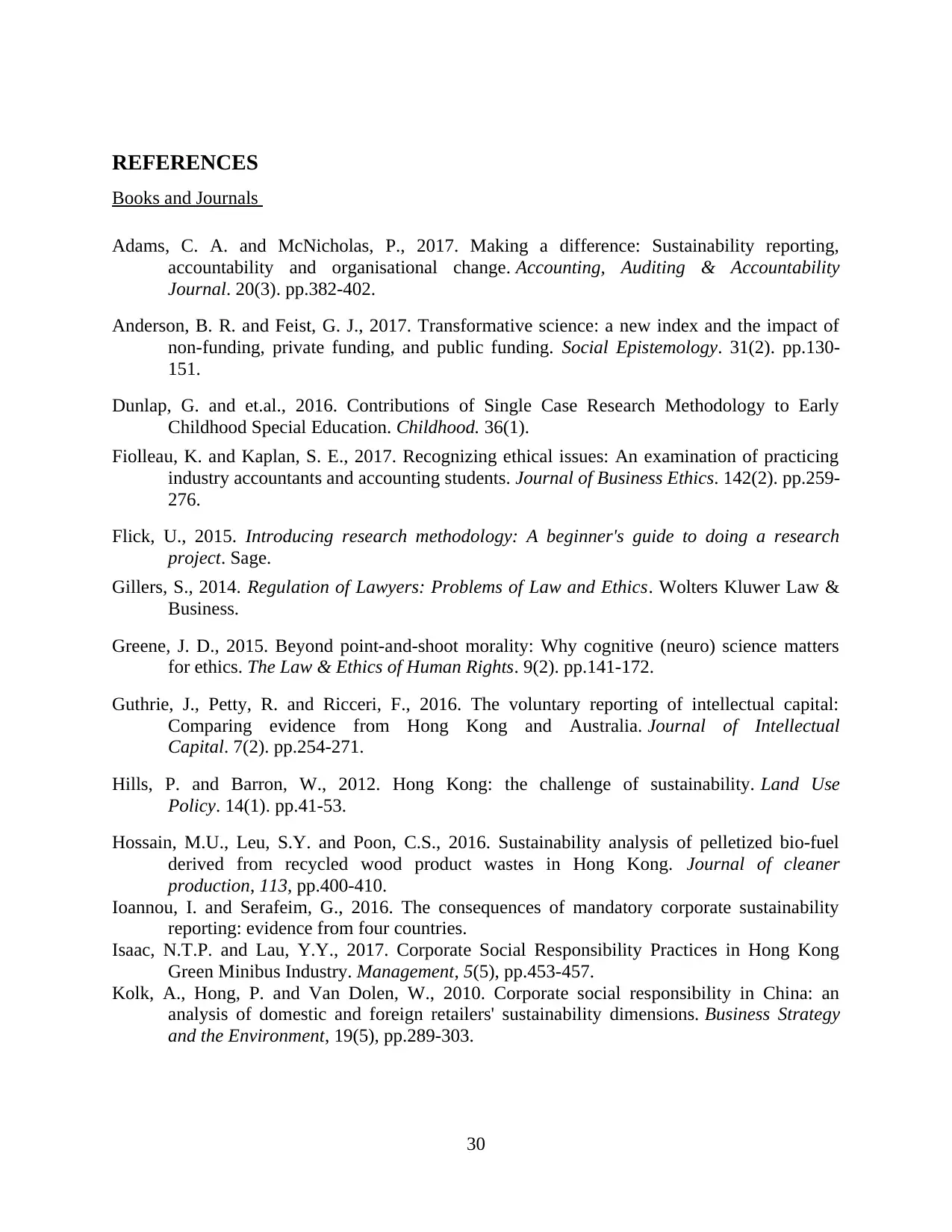
REFERENCES
Books and Journals
Adams, C. A. and McNicholas, P., 2017. Making a difference: Sustainability reporting,
accountability and organisational change. Accounting, Auditing & Accountability
Journal. 20(3). pp.382-402.
Anderson, B. R. and Feist, G. J., 2017. Transformative science: a new index and the impact of
non-funding, private funding, and public funding. Social Epistemology. 31(2). pp.130-
151.
Dunlap, G. and et.al., 2016. Contributions of Single Case Research Methodology to Early
Childhood Special Education. Childhood. 36(1).
Fiolleau, K. and Kaplan, S. E., 2017. Recognizing ethical issues: An examination of practicing
industry accountants and accounting students. Journal of Business Ethics. 142(2). pp.259-
276.
Flick, U., 2015. Introducing research methodology: A beginner's guide to doing a research
project. Sage.
Gillers, S., 2014. Regulation of Lawyers: Problems of Law and Ethics. Wolters Kluwer Law &
Business.
Greene, J. D., 2015. Beyond point-and-shoot morality: Why cognitive (neuro) science matters
for ethics. The Law & Ethics of Human Rights. 9(2). pp.141-172.
Guthrie, J., Petty, R. and Ricceri, F., 2016. The voluntary reporting of intellectual capital:
Comparing evidence from Hong Kong and Australia. Journal of Intellectual
Capital. 7(2). pp.254-271.
Hills, P. and Barron, W., 2012. Hong Kong: the challenge of sustainability. Land Use
Policy. 14(1). pp.41-53.
Hossain, M.U., Leu, S.Y. and Poon, C.S., 2016. Sustainability analysis of pelletized bio-fuel
derived from recycled wood product wastes in Hong Kong. Journal of cleaner
production, 113, pp.400-410.
Ioannou, I. and Serafeim, G., 2016. The consequences of mandatory corporate sustainability
reporting: evidence from four countries.
Isaac, N.T.P. and Lau, Y.Y., 2017. Corporate Social Responsibility Practices in Hong Kong
Green Minibus Industry. Management, 5(5), pp.453-457.
Kolk, A., Hong, P. and Van Dolen, W., 2010. Corporate social responsibility in China: an
analysis of domestic and foreign retailers' sustainability dimensions. Business Strategy
and the Environment, 19(5), pp.289-303.
30
Books and Journals
Adams, C. A. and McNicholas, P., 2017. Making a difference: Sustainability reporting,
accountability and organisational change. Accounting, Auditing & Accountability
Journal. 20(3). pp.382-402.
Anderson, B. R. and Feist, G. J., 2017. Transformative science: a new index and the impact of
non-funding, private funding, and public funding. Social Epistemology. 31(2). pp.130-
151.
Dunlap, G. and et.al., 2016. Contributions of Single Case Research Methodology to Early
Childhood Special Education. Childhood. 36(1).
Fiolleau, K. and Kaplan, S. E., 2017. Recognizing ethical issues: An examination of practicing
industry accountants and accounting students. Journal of Business Ethics. 142(2). pp.259-
276.
Flick, U., 2015. Introducing research methodology: A beginner's guide to doing a research
project. Sage.
Gillers, S., 2014. Regulation of Lawyers: Problems of Law and Ethics. Wolters Kluwer Law &
Business.
Greene, J. D., 2015. Beyond point-and-shoot morality: Why cognitive (neuro) science matters
for ethics. The Law & Ethics of Human Rights. 9(2). pp.141-172.
Guthrie, J., Petty, R. and Ricceri, F., 2016. The voluntary reporting of intellectual capital:
Comparing evidence from Hong Kong and Australia. Journal of Intellectual
Capital. 7(2). pp.254-271.
Hills, P. and Barron, W., 2012. Hong Kong: the challenge of sustainability. Land Use
Policy. 14(1). pp.41-53.
Hossain, M.U., Leu, S.Y. and Poon, C.S., 2016. Sustainability analysis of pelletized bio-fuel
derived from recycled wood product wastes in Hong Kong. Journal of cleaner
production, 113, pp.400-410.
Ioannou, I. and Serafeim, G., 2016. The consequences of mandatory corporate sustainability
reporting: evidence from four countries.
Isaac, N.T.P. and Lau, Y.Y., 2017. Corporate Social Responsibility Practices in Hong Kong
Green Minibus Industry. Management, 5(5), pp.453-457.
Kolk, A., Hong, P. and Van Dolen, W., 2010. Corporate social responsibility in China: an
analysis of domestic and foreign retailers' sustainability dimensions. Business Strategy
and the Environment, 19(5), pp.289-303.
30
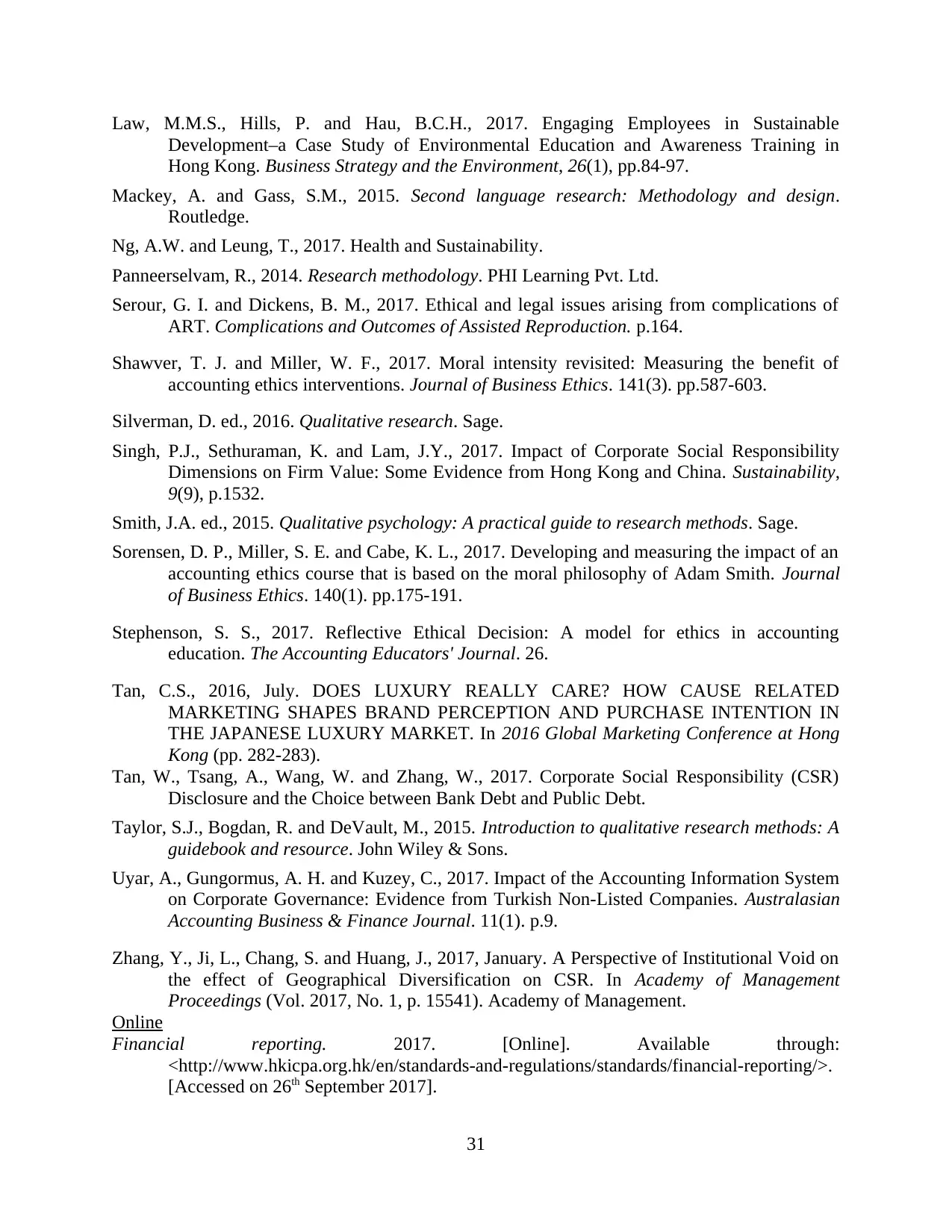
Law, M.M.S., Hills, P. and Hau, B.C.H., 2017. Engaging Employees in Sustainable
Development–a Case Study of Environmental Education and Awareness Training in
Hong Kong. Business Strategy and the Environment, 26(1), pp.84-97.
Mackey, A. and Gass, S.M., 2015. Second language research: Methodology and design.
Routledge.
Ng, A.W. and Leung, T., 2017. Health and Sustainability.
Panneerselvam, R., 2014. Research methodology. PHI Learning Pvt. Ltd.
Serour, G. I. and Dickens, B. M., 2017. Ethical and legal issues arising from complications of
ART. Complications and Outcomes of Assisted Reproduction. p.164.
Shawver, T. J. and Miller, W. F., 2017. Moral intensity revisited: Measuring the benefit of
accounting ethics interventions. Journal of Business Ethics. 141(3). pp.587-603.
Silverman, D. ed., 2016. Qualitative research. Sage.
Singh, P.J., Sethuraman, K. and Lam, J.Y., 2017. Impact of Corporate Social Responsibility
Dimensions on Firm Value: Some Evidence from Hong Kong and China. Sustainability,
9(9), p.1532.
Smith, J.A. ed., 2015. Qualitative psychology: A practical guide to research methods. Sage.
Sorensen, D. P., Miller, S. E. and Cabe, K. L., 2017. Developing and measuring the impact of an
accounting ethics course that is based on the moral philosophy of Adam Smith. Journal
of Business Ethics. 140(1). pp.175-191.
Stephenson, S. S., 2017. Reflective Ethical Decision: A model for ethics in accounting
education. The Accounting Educators' Journal. 26.
Tan, C.S., 2016, July. DOES LUXURY REALLY CARE? HOW CAUSE RELATED
MARKETING SHAPES BRAND PERCEPTION AND PURCHASE INTENTION IN
THE JAPANESE LUXURY MARKET. In 2016 Global Marketing Conference at Hong
Kong (pp. 282-283).
Tan, W., Tsang, A., Wang, W. and Zhang, W., 2017. Corporate Social Responsibility (CSR)
Disclosure and the Choice between Bank Debt and Public Debt.
Taylor, S.J., Bogdan, R. and DeVault, M., 2015. Introduction to qualitative research methods: A
guidebook and resource. John Wiley & Sons.
Uyar, A., Gungormus, A. H. and Kuzey, C., 2017. Impact of the Accounting Information System
on Corporate Governance: Evidence from Turkish Non-Listed Companies. Australasian
Accounting Business & Finance Journal. 11(1). p.9.
Zhang, Y., Ji, L., Chang, S. and Huang, J., 2017, January. A Perspective of Institutional Void on
the effect of Geographical Diversification on CSR. In Academy of Management
Proceedings (Vol. 2017, No. 1, p. 15541). Academy of Management.
Online
Financial reporting. 2017. [Online]. Available through:
<http://www.hkicpa.org.hk/en/standards-and-regulations/standards/financial-reporting/>.
[Accessed on 26th September 2017].
31
Development–a Case Study of Environmental Education and Awareness Training in
Hong Kong. Business Strategy and the Environment, 26(1), pp.84-97.
Mackey, A. and Gass, S.M., 2015. Second language research: Methodology and design.
Routledge.
Ng, A.W. and Leung, T., 2017. Health and Sustainability.
Panneerselvam, R., 2014. Research methodology. PHI Learning Pvt. Ltd.
Serour, G. I. and Dickens, B. M., 2017. Ethical and legal issues arising from complications of
ART. Complications and Outcomes of Assisted Reproduction. p.164.
Shawver, T. J. and Miller, W. F., 2017. Moral intensity revisited: Measuring the benefit of
accounting ethics interventions. Journal of Business Ethics. 141(3). pp.587-603.
Silverman, D. ed., 2016. Qualitative research. Sage.
Singh, P.J., Sethuraman, K. and Lam, J.Y., 2017. Impact of Corporate Social Responsibility
Dimensions on Firm Value: Some Evidence from Hong Kong and China. Sustainability,
9(9), p.1532.
Smith, J.A. ed., 2015. Qualitative psychology: A practical guide to research methods. Sage.
Sorensen, D. P., Miller, S. E. and Cabe, K. L., 2017. Developing and measuring the impact of an
accounting ethics course that is based on the moral philosophy of Adam Smith. Journal
of Business Ethics. 140(1). pp.175-191.
Stephenson, S. S., 2017. Reflective Ethical Decision: A model for ethics in accounting
education. The Accounting Educators' Journal. 26.
Tan, C.S., 2016, July. DOES LUXURY REALLY CARE? HOW CAUSE RELATED
MARKETING SHAPES BRAND PERCEPTION AND PURCHASE INTENTION IN
THE JAPANESE LUXURY MARKET. In 2016 Global Marketing Conference at Hong
Kong (pp. 282-283).
Tan, W., Tsang, A., Wang, W. and Zhang, W., 2017. Corporate Social Responsibility (CSR)
Disclosure and the Choice between Bank Debt and Public Debt.
Taylor, S.J., Bogdan, R. and DeVault, M., 2015. Introduction to qualitative research methods: A
guidebook and resource. John Wiley & Sons.
Uyar, A., Gungormus, A. H. and Kuzey, C., 2017. Impact of the Accounting Information System
on Corporate Governance: Evidence from Turkish Non-Listed Companies. Australasian
Accounting Business & Finance Journal. 11(1). p.9.
Zhang, Y., Ji, L., Chang, S. and Huang, J., 2017, January. A Perspective of Institutional Void on
the effect of Geographical Diversification on CSR. In Academy of Management
Proceedings (Vol. 2017, No. 1, p. 15541). Academy of Management.
Online
Financial reporting. 2017. [Online]. Available through:
<http://www.hkicpa.org.hk/en/standards-and-regulations/standards/financial-reporting/>.
[Accessed on 26th September 2017].
31
Secure Best Marks with AI Grader
Need help grading? Try our AI Grader for instant feedback on your assignments.
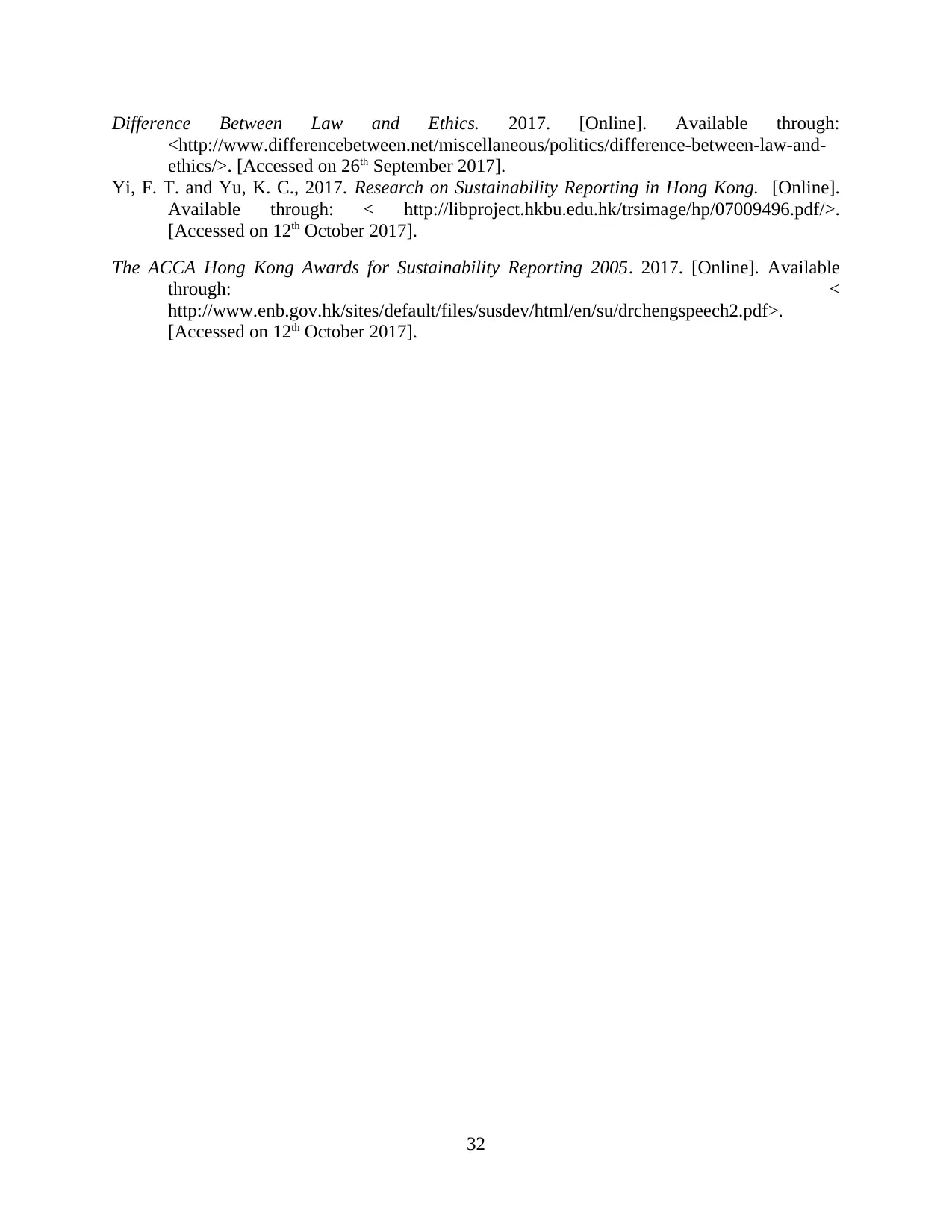
Difference Between Law and Ethics. 2017. [Online]. Available through:
<http://www.differencebetween.net/miscellaneous/politics/difference-between-law-and-
ethics/>. [Accessed on 26th September 2017].
Yi, F. T. and Yu, K. C., 2017. Research on Sustainability Reporting in Hong Kong. [Online].
Available through: < http://libproject.hkbu.edu.hk/trsimage/hp/07009496.pdf/>.
[Accessed on 12th October 2017].
The ACCA Hong Kong Awards for Sustainability Reporting 2005. 2017. [Online]. Available
through: <
http://www.enb.gov.hk/sites/default/files/susdev/html/en/su/drchengspeech2.pdf>.
[Accessed on 12th October 2017].
32
<http://www.differencebetween.net/miscellaneous/politics/difference-between-law-and-
ethics/>. [Accessed on 26th September 2017].
Yi, F. T. and Yu, K. C., 2017. Research on Sustainability Reporting in Hong Kong. [Online].
Available through: < http://libproject.hkbu.edu.hk/trsimage/hp/07009496.pdf/>.
[Accessed on 12th October 2017].
The ACCA Hong Kong Awards for Sustainability Reporting 2005. 2017. [Online]. Available
through: <
http://www.enb.gov.hk/sites/default/files/susdev/html/en/su/drchengspeech2.pdf>.
[Accessed on 12th October 2017].
32
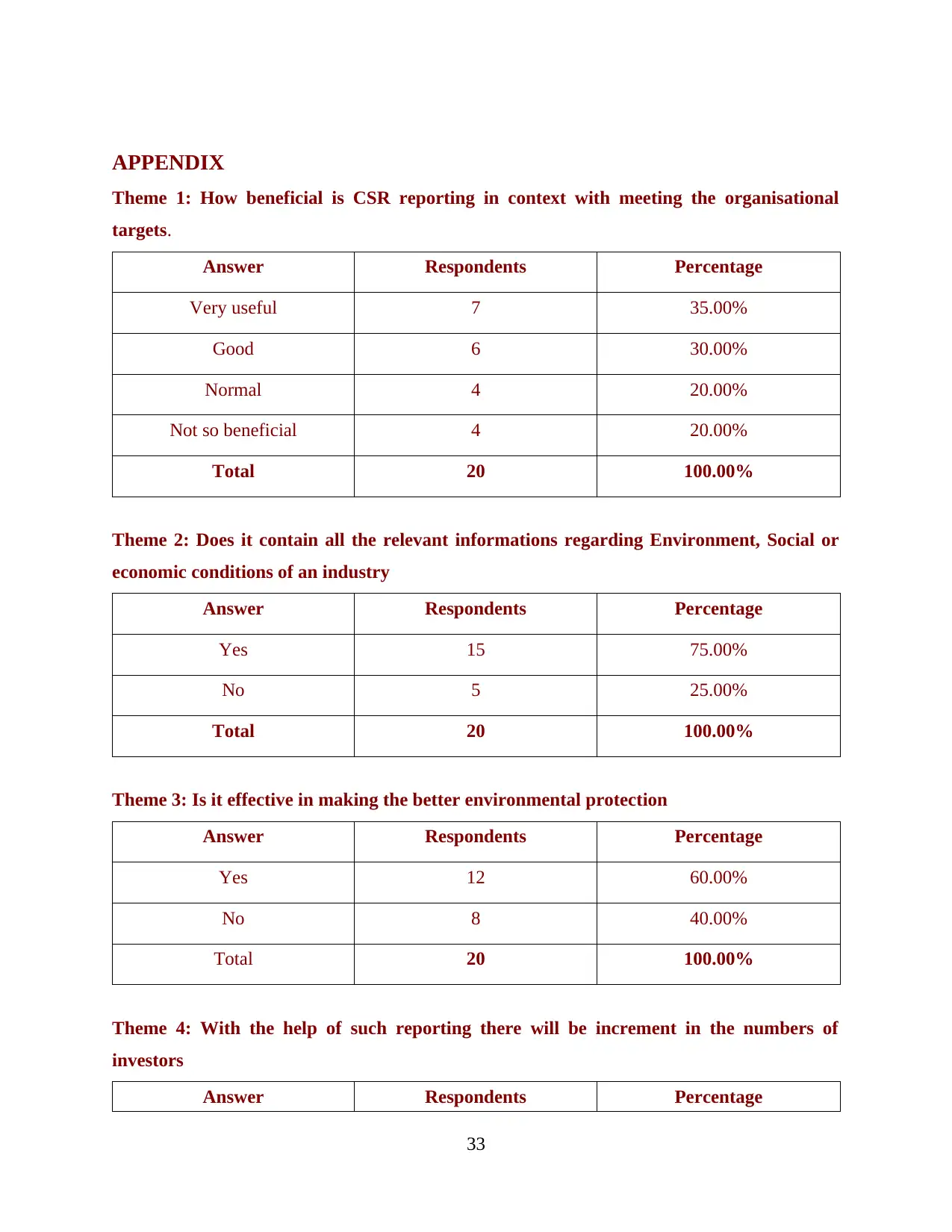
APPENDIX
Theme 1: How beneficial is CSR reporting in context with meeting the organisational
targets.
Answer Respondents Percentage
Very useful 7 35.00%
Good 6 30.00%
Normal 4 20.00%
Not so beneficial 4 20.00%
Total 20 100.00%
Theme 2: Does it contain all the relevant informations regarding Environment, Social or
economic conditions of an industry
Answer Respondents Percentage
Yes 15 75.00%
No 5 25.00%
Total 20 100.00%
Theme 3: Is it effective in making the better environmental protection
Answer Respondents Percentage
Yes 12 60.00%
No 8 40.00%
Total 20 100.00%
Theme 4: With the help of such reporting there will be increment in the numbers of
investors
Answer Respondents Percentage
33
Theme 1: How beneficial is CSR reporting in context with meeting the organisational
targets.
Answer Respondents Percentage
Very useful 7 35.00%
Good 6 30.00%
Normal 4 20.00%
Not so beneficial 4 20.00%
Total 20 100.00%
Theme 2: Does it contain all the relevant informations regarding Environment, Social or
economic conditions of an industry
Answer Respondents Percentage
Yes 15 75.00%
No 5 25.00%
Total 20 100.00%
Theme 3: Is it effective in making the better environmental protection
Answer Respondents Percentage
Yes 12 60.00%
No 8 40.00%
Total 20 100.00%
Theme 4: With the help of such reporting there will be increment in the numbers of
investors
Answer Respondents Percentage
33
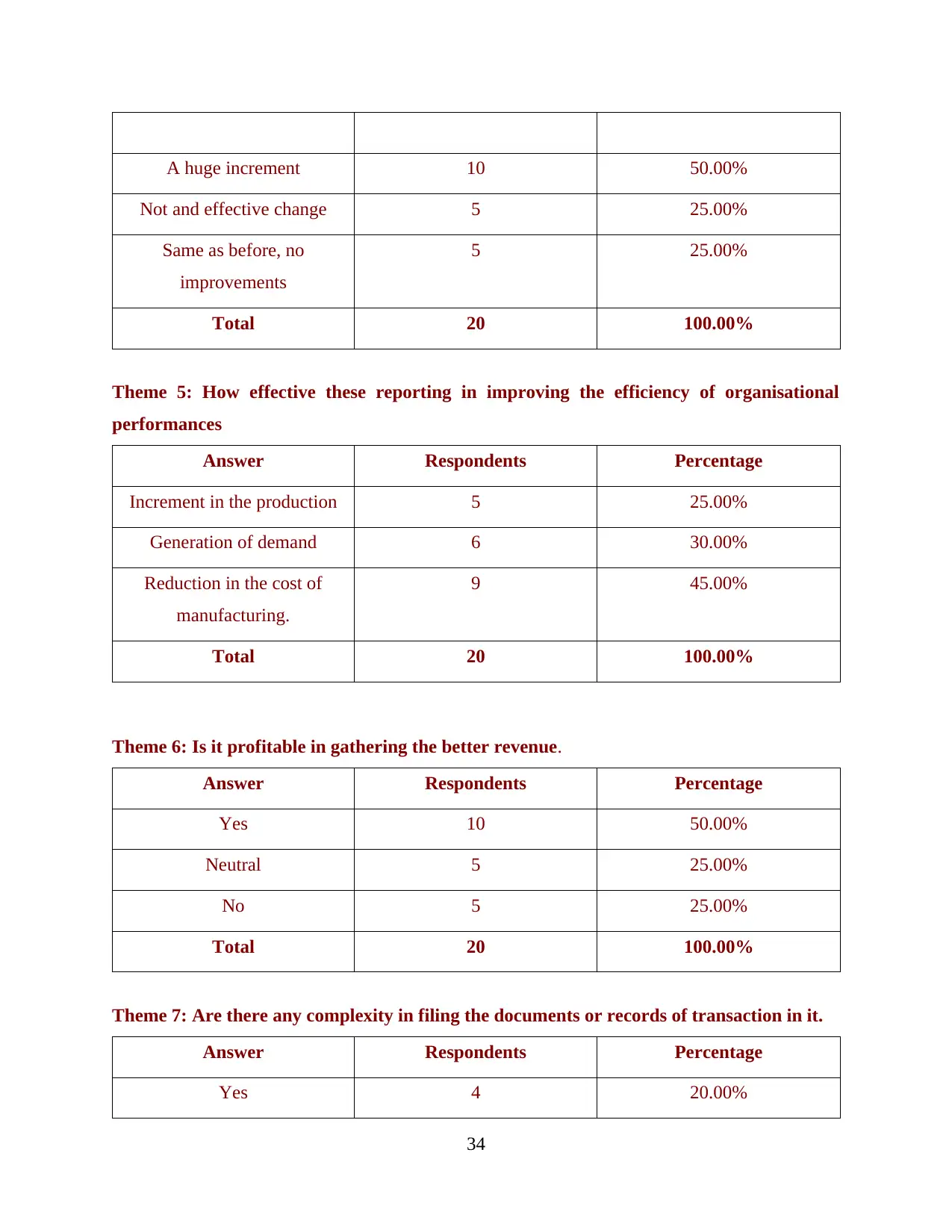
A huge increment 10 50.00%
Not and effective change 5 25.00%
Same as before, no
improvements
5 25.00%
Total 20 100.00%
Theme 5: How effective these reporting in improving the efficiency of organisational
performances
Answer Respondents Percentage
Increment in the production 5 25.00%
Generation of demand 6 30.00%
Reduction in the cost of
manufacturing.
9 45.00%
Total 20 100.00%
Theme 6: Is it profitable in gathering the better revenue.
Answer Respondents Percentage
Yes 10 50.00%
Neutral 5 25.00%
No 5 25.00%
Total 20 100.00%
Theme 7: Are there any complexity in filing the documents or records of transaction in it.
Answer Respondents Percentage
Yes 4 20.00%
34
Not and effective change 5 25.00%
Same as before, no
improvements
5 25.00%
Total 20 100.00%
Theme 5: How effective these reporting in improving the efficiency of organisational
performances
Answer Respondents Percentage
Increment in the production 5 25.00%
Generation of demand 6 30.00%
Reduction in the cost of
manufacturing.
9 45.00%
Total 20 100.00%
Theme 6: Is it profitable in gathering the better revenue.
Answer Respondents Percentage
Yes 10 50.00%
Neutral 5 25.00%
No 5 25.00%
Total 20 100.00%
Theme 7: Are there any complexity in filing the documents or records of transaction in it.
Answer Respondents Percentage
Yes 4 20.00%
34
1 out of 37
Related Documents
Your All-in-One AI-Powered Toolkit for Academic Success.
+13062052269
info@desklib.com
Available 24*7 on WhatsApp / Email
![[object Object]](/_next/static/media/star-bottom.7253800d.svg)
Unlock your academic potential
© 2024 | Zucol Services PVT LTD | All rights reserved.





